#i understand the idea of like bringing the titans into a more modern age to....work on the timeline issues
Text
dc using the word situationship to refer to donna and garth was NOT on my 2023 bingo card.....
#donna troy#wonder girl#garth#aqualad#worlds finest: teen titans#i have complicated feelings on this comic#i understand the idea of like bringing the titans into a more modern age to....work on the timeline issues#and i dont think the execution is bad per se but i think its really fucking funny#roy saying sus and live streaming their fight was also quite funny#id say it comes off as old people trying too hard to write young people but honestly it doesnt#like yeah i know at least like 10 people who absolutely would live stream beating the shit out of villians if they were heroes#is it perfect? god no#but its funny as hell#im qualified to make this review as a current highschooler#i do think that they should still call eachother baby in a completely modern setting
7 notes
·
View notes
Note
Reading through your wedding post made me so happy, but then I read about Falco's family 😭 Do you think you could write some of your headcannons of you and Reiner watching Falco for a week while his brother goes on a business trip or something. I can only picture by the end of the week that the house is full of the kids because none of them want to go home because Falco misses his brother and hes sad!! 😭😭
I'm so happy you enjoyed it! And that's such a sweet and thoughtful request how could i say no :( my god it sounds like the perfect comfort fic to write and honestly Falco deserves it💛
And the kiddos comforting Falco is a really adorable idea especially since he's the one looking out for everyone and comforting them most of the time, i can only imagine how loved he'd be by them.
Falco spending a week with you and Reiner
{ Reiner x reader | tw:deceased parents tw:neglectful parents | reverse comfort, fluff | modern }

{ "Tales of Enchantment" by Frank O. Salisbury 1874–1962 }
Around 5am, you and Reiner were waiting in the living room, each holding a cup of coffee. In the past days you got a call from Colt, asking if you can take care of Falco for a week, he sounded really apologetic and so you reassured him it's not trouble at all.
Apparently him and Zeke had a work related trip to a far away town, being understaffed in that town and all, the situation was dire and they couldn't refuse without their rating taking a huge hit not to mention morally too. But as a compensation, the company promised a higher pay to make their effort worth it.
You didn't notice the repeated knocking on the door till a couple seconds later, lack of sleep delaying your senses.
Opening it, you were met with an anxious Colt carrying his little brother in his arms, still asleep in his pajamas. Zeke from behind him carrying a couple bags and backpacks, he waved to you with a smile.
As Reiner took Falco in his arms and some of the bags too, you carried his Marvel school backpack and a list Colt made for all the things Falco needed and liked. He seemed to put a lot of effort in it, somethings in it you didn't even know yourself.
While tucking Falco in your bed, Reiner couldn't help but express his worry over Colt working himself to exhausting, both mentally and physically.
Yeah it was only a temporary thing till Colt graduates college and finds a stable good paying job, whilst taking care of his little brother as much as he can. He's been carrying Falco's responsibility on his shoulder since the funeral without a twitch or a complaint.
You think back to all the times you saw Colt, most being for mere minutes when he came to drop off the kids or pick them up just as his classes ended and before his shift at work started, barely having time for himself yet he chose to spend that little remaining free time on Falco and his friends.
You sit next to Reiner on the bed, gently brushing Falco's hair away from his face as he's sound asleep. He always looked up to his brother more than anyone else and would never let anyone talk badly about him.
It's like his own personal superhero.
"Do you think he'll be sad knowing he didn't get to say goodbye before Colt left?" You ask, still looking at Falco.
Reiner thinks for a moment before answering, "probably, but won't show it" he secures the blanket more around Falco, "sometimes I wonder who's more stubborn with showing their emotions, Gabi or Falco."
"I'd say Zofia wins the acting Oscar" you turn the lights off on your way out, "wasn't it for Udo, we wouldn't know how she's feeling half the time."
Around 10am, a very sleepy Falco merges out of the dark bedroom. Making his way to sit between you and Reiner on the couch, while carrying a blanket around him.
He leans into Reiner's hand when he strokes Falco's hair while you secure the blanket around him. Seeming unusual quiet, you and Reiner shared a knowing concerned look.
Offering to make him his favourite food for breakfast got a smiles out of Falco, Reiner even let him choose what shapes he wants his sunny side eggs as.
While he went to cook and prepare food, Falco shyly leans into your lap as if testing the water.
Please assure him it's okay to seek physical comfort from you, wrap your arms around him and he'll be embarrassed at first to ask to sit on your lap but will love it afterwards.
Just don't tell anyone about it okay? It's something his parents used to do when he was little.
When he heard about Gabi coming over today, he seemed to light up. While Udo and Zofia have weekend music lessons they couldn't make it till tomorrow.
While looking away, he asked if you could watch teen titans go with him.
The rest of the day went smoothly after that, Falco was a good kid in general and a really helpful and understanding person. He helped you both with chores and even attempted to cook pancakes.
While it came out burned, don't tell him that! He's really worried so please make him know you loved it and it was super delicious.
You and Reiner even took him to the dogs park nearby, he had pet so many good dogs till he couldn't count, even played fetch with one. After that you got ice cream on the way back.
When Gabi finally arrived, full of energy and enthusiastic about Falco staying over meaning she too will be staying over
All hell broke loose, it's like a switch had been flipped and the well behaved good boy Falco you know was completely weoponised by Gabi as she pulled him into her mischiefs
By himself, Falco is a good kid, well behaved, polite and responsible for his age. But with adding Gabi to the mix? They're a force to be reckon with.
You could see that Reiner was trying his hardest to deny that his closest cousin Gabi, was the bad influence on other kids all along.
You know? The one leading you off a cliff that your moms tells you not to follow? The rebellious kid with very strong opinions and the will to fist fight god? Yeah that one.
Apparently, no one gave Falco the cliff talk yet because he seemed far too eager to follow her to the end of the earth and down that cliff, he'd even jump hand in hand with her just to protect her from the sharp rocks under.
Gabi was actually looking forward to Falco staying over, since either way she'd spend a couple of days with you and Reiner whenever her parents are away or are too busy. She can't handle feeling lonely in the house, it's one of the worst feelings she's ever experienced.
It reached a point that Reiner gave her a copy of the keys, just so she could come in whenever even if you were at work. He too didn't like the idea of her being alone in a house all by herself, yet her parents didn't seem bothered at all.
But now she has a friend to spend the time with!
Falco was finding comfort in the fact that him and Gabi are currently in similar situations, while his was temporarily he felt better knowing he wasn't alone in this.
By the end of the the day, they managed to build a pillow fort in your living room. No one allowed to enter unless they're bearing offerings snacks
Around 10pm, when both of them fall asleep inside the fort. Falco hugging a pillow to his chest while Gabi still had a controller in her hand.
Of course Reiner took some pictures, how could he not? Especially with the way Falco's fingers were tangled with Gabi's as she had cookie crumbs around her mouth.
He also sent it to the groupchat Zeke made, reassuring Colt that Falco is having the time of his life whilst also sharing their adorable cousins with the rest of his friends.
The week went by faster than anyone could notice, good times always fly fast eh?
Each morning you and Reiner would walk Falco to the school bus before watching him sit next to Udo, sending him off with packed lunch and waving as the bus went away.
After school the rest of the kiddos will come with him home, keeping him company and helping him with homework too. They'd make sure to play Videgames right after.
Porco actually took over the duty of taking Zofia and Udo back to their houses, let's just say their mothers didn't like him at all, but reluctantly agreed after Reiner assured them he's a close family friend.
Each day around 6pm, Colt would video call him on his work break, sometimes with Zeke and other times alone. Falco would tell him about his day and Colt would praise him for all the good work he's done, he'd even share stories of his own and remind him to brush his teeth and eat his vegetables.
After each call, Falco will be noticeably more...down. can you blame him? He really misses him brother.
Sit next to him and hug him close please, he really needs it but he can't bring himself to ask for it. Soothe away his worries and don't mention it if his eyes start watering, just pull him against your chest and let him cry his heart out.
On nights he's particularly sad, he'd sneak into your bedroom to sleep between you and Reiner. It's something he used to do back when he was little, he can't help but miss his parents.
It makes him feel safe so make sure to keep a space for him in there always.
Please stroke his hair till he falls asleep like his mother used to do each night, and let him lean against you while watching cartoons like his father did.
You also noticed how...dotting the kiddos are around him during these times.
Gabi is more gentle with him, even willing to play the games he wants instead of hers. She always teams up with him and her words whenever they win make him smile.
Zofia shares her food with him, something so scarce. She gives up her turn on the tv for him and even defends his choice in what to watch if the others complain.
Udo is the one making him space on the school bus and walking with him home too. Helping him with his homework and holding his hand whenever he seemed to get sad.
Udo and Falco are a great emotional support to each other, they're not afraid to speak about their emotions to the other.
And naturally they're the most comforting, with Zofia botteling up her own emotions and Gabi wrestling through it, it's the two of them who work as the group emotional support backbone.
Reiner couldn't stop talking to you about how proud he is of Udo when he saw him comforting Falco these days, you couldn't agree more.
By the end of the week, the three kids were surrounding Falco on the couch as they played Mario karts.
Zofia was threatening to throw hands with whoever threw that blue shell at her making her last place, Gabi was too busy securing her first place spot.
Udo was leaving strategtic traps in his trail while in third place, making Zofia even more frustrated as she fell into every single one.
Falco was racing with Gabi in second place, attempting to push her kart or power through to the finish line.
When the black and white line came into view, Gabi and Falco's karts were separate by mere inches, both of them attempting to outrun the other.
And when Gabi managed to get a hold of the first spot for three seconds, a flying blue shell knocked her away. Making Falco the winner as he crossed the line.
To this day, Gabi doesn't know if which one of Zofia and Udo were the cause of her demise, but oh she will find the traitor and they will pay.
After that intense scene, they all shared a bag of cookies she brought from home! It was animal shaped.
#Reiner🕯#reverse comfort🕯#fluff🕯#modern aot🕯#kiddo gang🕯#reiner braun x reader#aot reiner#reiner braun#reiner x reader#reiner headcanons#aot#aot x reader#aot x y/n#snk#fluff#snk x reader#aot falco#aot gabi#aot udo#aot zofia#reverse comfort#gabi braun#falco grice#angst with comfort🕯
277 notes
·
View notes
Note
You might've answered this already and I just didn't find it, but one thing that always perplexed me about Duke was how old he was in comparison to the other Batkids. It's obvious he's younger than Dick and Babs, and I pretty sure he's younger than Jason and Cass, and older than Damian, but I cannot tell if he's meant to be Tim and Steph's ages, younger, or older. Could you help me?
You’re all kinds of good here, anon!!! I answered a similar ask abt the Order of Adoption but didn’t dive into specific ages on that post BECAUSE well they didn’t ask lmaooo but ALSO:
Comic ages are very fluid usually! While Years™️ might pass in the canon proper, or while time seems to slow to a crawl, having a character’s age outright stated is something that occurs very rarely for most characters, if at all!
Because it’s always much easier to have a floating age range to work and play around in! It’s easier to keep a character Perpetually 12 or 16 or 25 or mid-40s or- you get the idea. SO, with that in mind. Let’s do our Best to Break Down What Age Duke Might Be Currently A N D how it might interact with the Other Batkids!
(Warning for a Very Long Post, lots of issue citations, and a LOT of comics terminology regarding specific runs/events/continunity. I’m gonna try to keep it as clear/concise as possible ofc but plz keep these things in mind! If you’re not at least marginally familiar with Bat-Comics, you might find yourself feeling a little lost here!)
So from the Zero Year arc we see a common Trend that plays out pretty consistently with Batfam comics: a Life-Changing Event Occuring while the protag is Young™️.
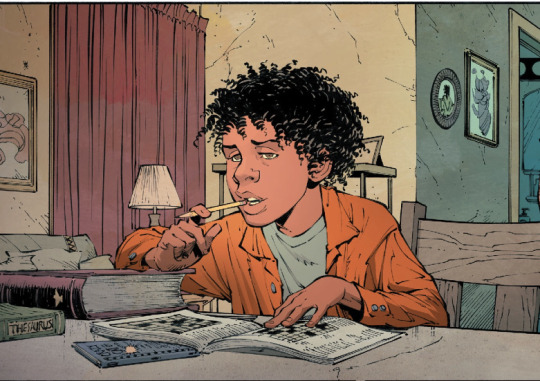
(Batman (2011) #30)
With how Duke is drawn in these particular issues, and given the trends of the past, I’d place him in the 8-12 range. The historic precedent being ofc that that is the same range that canon usually places both Bruce and Dick at for their Tragedies™; the more benign reason being that he... just very much Looks to be drawn in that Range. He’s very clearly an Older/Prepubescent child here.
Fast Forward to his Next Appearance in the Endgame arc and-
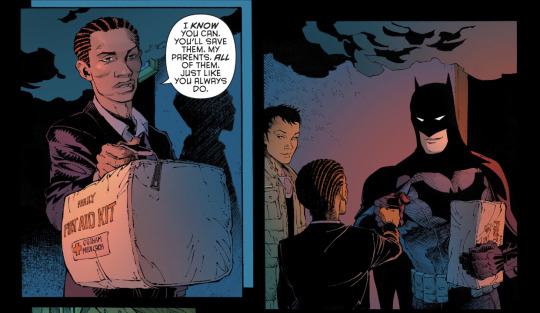
(Batman (2011) #37)
He’s definitely older! He’s wiser! And he’s giving Batman a fistbump lmao. Again, no strict age given here BUT, since they condensed each Robin to a Year or Two tops with Bruce (its n52 and its fucked up is what it is), we can assume it’s been at least 4-5 since Zero Year (which would mean if we go off the age range I proposed for that year, then theoretically he could be anywhere from 12-16 here, and I think that tracks pretty well. Not Perfectly and Certainly Not so well with Pre52 continuity ofc, but I’ll talk about that later!)
In We Are Robin, while its not stated Directly In The Text, it IS given as an Informational Tidbit that Duke is 16 (specifically this can be found at the end of issue #4)! (Sweet sweet canon confirmation FINALLY)
We know that WAR takes place Fairly Soon after Endgame (almost immediately, give or take a month or two given that Duke’s been placed in a few foster homes at this point and has racked up Quite A File) now, again id like to remind y’all that while this is a NICE starting point to have, keep in mind that comics are fluid and this may be retconned slightly/ignored in later stories bc Keeping Duke 16-ish is in DC’s Best Interest at the moment. (Having Relatable Teen Characters afterall is a Good Marketing strategy™️. And the longer they can Keep them Young, the Better)
With that in mind let’s take a moment to Highlight the fact that Duke and Damian have crossed paths at this point AND the storylines that have occurred during this year that were meant to be in conjunction with one another!
Because Prior to Endgame, Damian had Died! And just a year (in real, meat-space time) before We Are Robin, he was resurrected and had begun his “Year of Atonement” in the Robin: Son of Batman maxiseries. Midway through both this series and WAR (and, we can assume, midway thru this “Year” for Damian) the Robin War begins/ends and we see at least one major Moment between these two boys who will soon call one another brothers:
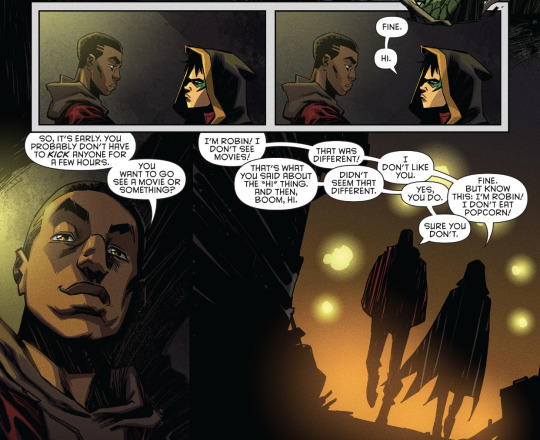
(Robin War #2)
Given that R:SoB is followed up VERY quickly by Teen Titans Rebirth (in which Damian celebrates his 13th birthday), we can conclude that Damian would be 12 during this time (well, 12 and 1/2 to play it safe lmao). That being said, this Confirms about a 4yr gap between Duke and Damian! (One Batkid down at least! but he’s the key to the others so put a pin in him!)
As We Are Robin draws to its conclusion, DC was releasing another arc that would eventually flow into the Rebirth Era, by the end of which, Bruce would approach Duke with an Idea (which involves Bruce becoming Dukes temporary guardian & as he states Many Times “Trying Something New” with Duke).
And thus the Rebirth Era begins, and Duke began his Year of training (most directly encapsulated by the Cursed Wheel arc in the All-Star Batman run:
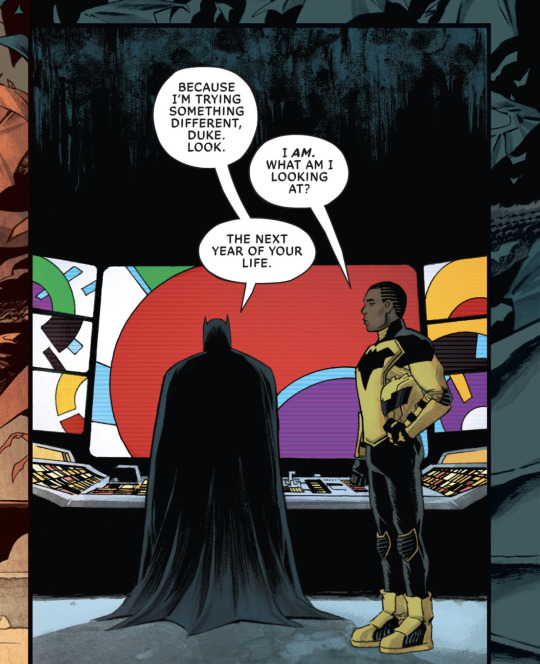
(All-Star Batman #1 (back-up story))
Bruce introduces Duke to a training regimen that Alfred has named “the Cursed Wheel”. It encompasses all the training Bruce and the other bats have undergone and condenses it down into color-coordinated segments that will take Duke a Year to Complete.
It can be assumed that by the End of this Year Duke will somehow miraculously still be 16, despite, again, an entire ass year passing.
There’s one story that takes place mid-year in All-Star Batman, and the Cursed Wheel is meant to be capped off by Duke’s first Official Day as the Signal (in the titular Batman & the Signal ofc) BUT, near as I can tell after this story, Dukes age is not brought up again. So until they DO bring it up either in Batman & the Outsiders or whatever future run Duke becomes involved in, we can assume DC will be working with the idea that he’s meant to be in that 16-18 range from here on out (ie still a minor).
But, dear anon, you might be saying “okay, that’s cool, but how does that relate to my question abt how he falls in with the other Bats?” You’ll have to be a little patient with me here, but I think I may have cracked the code!
Keep in mind I’m gonna be addressing both the Post-Crisis to Flashpoint Continuity (ie mid-80s to 2010 in comics history) and the N52-slash-Rebirth Era (2010-Today). Its generally agreed by fandom and DC alike that these points of rebooting &/or Major Events constitute the era of “Modern” comics, and that everything from the 80s-on might more or less be canon on some level, even if not All of it is.
(Plus, most of fandom usually likes to borrow elements from both eras and much more rarely from stories before it, SO-)
Lets do a quick rundown of how everyone who’s Closer to Duke’s Age, Relates to each other first, age-wise:
Given that Jason was 15 when he died, in A Lonely Place of Dying its established that Bruce had become increasingly reckless since his death, and by the end of the story, Tim has stepped in to fill Robin’s shoes (he states that he’s 13 during this story btw). Pretty soon after, Stephanie Brown is introduced & established to be about a year older than Tim (wish I could pin-point a specific issue BUT, i unfortunately haven’t read any Tim OR Steph-involved comics that predate No Man’s Land... Besides the aforementioned Lonely Place and Young Justice technically, but im working on remedying that soon!)
NOW, during the No Man’s Land event, Cassandra is introduced, and pretty soon into her Batgirl run, its revealed that she’s around the same age as Jason (or at least how old he Would Have Been, had he not died.) Now, given that Jay has an August bday and Cass has a January one, fandom sometimes likes to play around with the idea of one being older than the other (OR even speculating/placing them in an AU as twins/siblings, given that Lady Shiva (Cass’ mom) was a Possible Candidate to be Jason’s biological mother but that’s a Whole Other Thing i wont get into here.)
The point being, Cass, in this era of comics, IS slightly older than Tim and Steph. At Tim’s start as Robin, their ages could either line up like: Tim-13, Steph-14, Cass-15 (being a few months ‘behind’ Jay), then Jason at 15/16 (depending on how soon Tim filled the role after Jay died in April) OR Jason-15/16, Cass-16/17 (in this case she’d be a few months ‘ahead’ now instead)
So brief detour to talk New 52, however! Because Tim, Steph & Cass all got switched around from where DC originally left them prior to the reboot! Now I haven’t read much of them in this era, other than Batman & Robin: Eternal, so my Understanding of their current ages is Spotty at Best. The general consensus seems to be that while before N52, Stephanie had been attending her first year of College (& doing VERY WELL i might add), with the reboot she was set back a few years alongside Tim to a vague Late-Teen state (so 16-18-ish, instead of a Very Clearly Established 18/19). Cass is probably the worst off for this reboot, given that B&R:E basically constitutes her new origin for the new continuity, and does nothing to confirm her age (all I really know is that she’s a Vague Late-Teen too... Probably? Maybe?), given how much they infantilize her, and subsequently how fandom in turn has taken to infantilizing her too, theres a semi-popular fanon that places her Younger that Tim and Steph. And I, for one, propose that we ignore that bc its Weak Sauce my dudes.
Some fans chose to ignore N52 continuity due to this vagueness, and will stick to the ages established before the N52/Rebirth reboots. But its something to keep in mind regardless bc we’re all obviously going to pull from what’s most familiar to us!
But WHERE could we place Duke with regards to them, then? Because them being “Late Teens” is certainly much too vague to work with!
This is Where Damian is the key!
Because Damian is one of those rare exceptions to the Reboot Rule. His story flowed almost seamlessly over from before to after. While he was made a Robin at the age of 10, he continued to grow and learn even after the universe was being rewritten to suit the whims of DC editorial.
If we choose to ignore how everyone else’s ages and origins were swapped around, and stick with the growth that was presented before the reboot, then we can draw some interesting conclusions!
Firstly, though Stephanie also had Died and subsequently Returned, she hadn’t lost much, if any time, from the Ordeal. At the start of her Batgirl run, she is enrolled at a Gotham university and making headway with a more firm foot in the Batfamily (even to the point that she and Damian spend a few issues bonding. At this point in time, Damian is definitely 11, and again, Steph can be assumed to be 18/19 during the course of her run. We’ll assume 18 for clarity’s sake.)
So, then when Damian is 11, now our line up is as Follows:
Dami - 11, Steph - 18, Tim - 17, Cass 19-21 (the range depending again, if you subscribe to Cass being either older/younger than Jason).
WHICH MEANS, If during Robin War Damian is 12 (and a half) THEN We’ve got an age line-up that Potentially looks Like This:
Dami -12(and 1/2), Duke - 16, Tim - 18, Steph - 19, Cass - 20-22 (And Obvsly Jason, Babs & Dick at their varying Older Ages than everyone here)
and im just now realizing i Didnt include Harper in this line-up, but thats bc she’d also throw a big wrench in all this. I’d personally throw her in with being Steph’s age, but I’m pretty sure she was supposed to be either that, or between Steph and Cass (again, since its N52, i believe Cass was/is assumed to be Younger than Steph, but that contradicts the assumed following of pre52 canon that we have for the above line-up, obvsly, and so we ignore that lmao)
All this to say, however, that canon and fandom is what you make of it, and if you want to wiggle these ages around a little, you’re more than allowed! God Knows i usually like to skew the Tim-Steph-Cass age group to be a tad older than this in my own fic writing, and I like to have Duke start as a Robin at 14/15 instead of 16, but that’s just bc I like the dynamic potential it could bring with them being Definitively Older that him, and thus in a more secure place to be Mentoring him right alongside Bruce & the others.
But you might see these age ranges and want to do something Different (say, making Tim, Steph, Cass, & Duke all the Same Age at 17 instead! And that very well tracks with how current comics kinda looks right now!) and you’re absolutely valid to do so! Because again, comic character’s ages are meant to be fluid, not fixed!
And at the end of the day, its all about wanting to see these teen heroes kick serious ass haha
#duke thomas#guest starring:#batfamily#damian wayne#tim drake#stephanie brown#cassandra cain#randywrites#randys meta#meta#asked and answered#anonymous asks#this was A LOT and i tried to throw some humor where i could#but uhhhh yeah!!! i hope this helps anon!!!#also just realizing its TWO AM WHERE DID THE TIME GO#ah well. Worth It
115 notes
·
View notes
Text
A Life Thoroughly Lived: Review of The Invisible Life of Addie LaRue (Spoilers Ahead)
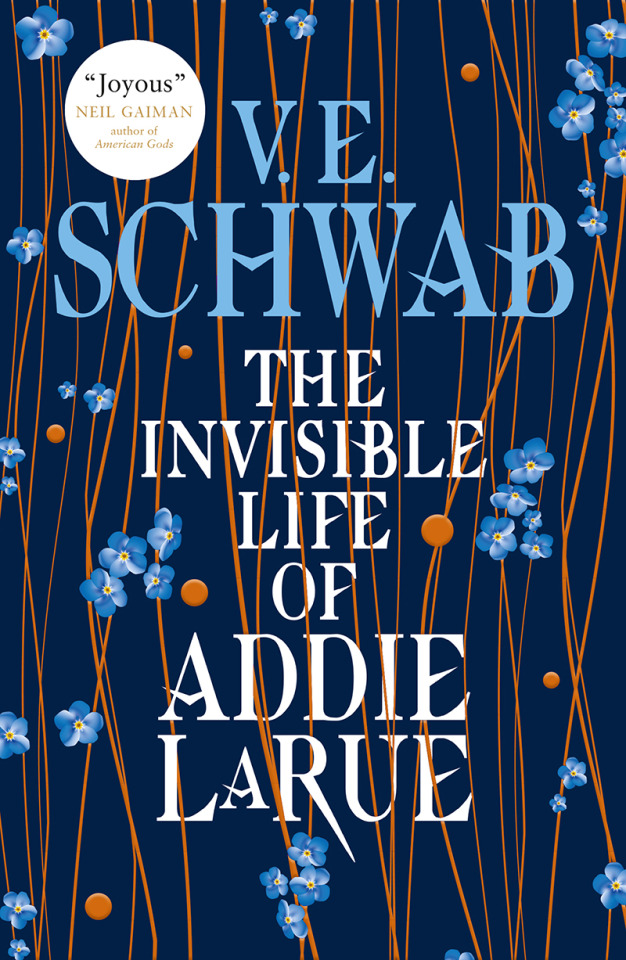
(Cover, Titan Books UK).
I have this distinct memory from when I was twelve: sitting in a McDonald’s after a morning in my homeschool e-learning program, eating french fries and reading the school’s library copy of Cornelia Funke’s Inkheart. This book was groundbreaking for me for a multitude of reasons, but one of its quotes became firmly stuck in my mind. Meggie’s father and secondary protagonist, Mo, reflects on books through this line: “Some books should be tasted, some devoured, but only few should be chewed and digested thoroughly.”
This line becomes entangled with my 12-year-old psyche, and I never quite let it go. The idea fascinated me: not only the novel idea of comparing books to nourishment, but the point that some books are not made to be read quickly and once. Some books are chewed and digested thoroughly.
I read that quote in 2005, and even then, at the cusp of the digital tipping point and prior to the smartphone, you could feel the inglorious pressure to consume anything you read if you read for pleasure at all. Conversations with my peers about books were rare, and what bonds I did have about creative writing were made over the internet via fanfiction.net: that wouldn’t change again until Twilight hit it big a few years later. To enjoy a book was to binge it and consume its content only, and so this quote wasn’t entirely understandable until I entered college- and became a writer myself, when I discovered the merit of craft.
This feels like a long way of saying I enjoyed one book, but I cannot stress the rarity of true craft in fantasy fiction. Genre fiction in general has a history of shaving off literary merit and form in favor of YA-style writing and clipped, action-oriented narration. It is what’s popular and there’s nothing wrong with this style of writing, but it is a style of writing made to be devoured. I often hoped to encounter that one modern fantasy novel, made to by chewed and digested slowly.
This brings me to The Invisible Life of Addie LaRue.
If you exist on the internet’s writing/reading spaces, you probably know V.E. Schwab, whose prolific career now spans a decade. Her most popular works, including her Villains and Shades of Magic series, tower over the 2010s as important entries to the SFF world, alongside a young generation of female authors— Naomi Novik, Leigh Bardugo, Seanan McGuire, N.K Jemisen, to name a few, who have helped change the definitions of SFF and what it means for women to participate in male-dominated writing spaces.
This is perhaps what makes Addie LaRue so visibly important, because its role as a serious, literary work as well as a groundbreaking fantasy novel, fully cements Schwab’s role as an important author of the 2010s.
The story of Addie LaRue is simple enough: in a small French village in 1714, Adaline LaRue finds herself at odds with her world: her desire to travel, her attraction to the old gods, and her want to experience life are combated by a world that expects her to marry and have children, living and dying in the same plot of land. With an arranged marriage at her heels, Adaline only desires freedom, adventure, and more time in a dwindling, small life. Against the advice of her village’s wise woman, Estele, Adaline prays to any god that will offer her a means of escaping this cruel fate.
Her desperation attracts the wrong god, who agrees to take her soul in exchange for a life without limits. This grants Adaline immortality, neither aging nor dying. But at the cost of her presence: anyone who encounters Adaline LaRue forgets her, the moment she is out of view. Any mark that Adaline leaves is erased, any suggestion of her past life is smeared from existence. The god— or Devil, erases her being in hopes of making her give up her soul. Adaline spends the next 300 years in limbo, forgotten and invisible to the world, until a New York bookseller catches her stealing from his shop and remembers her face.
The story itself oscillates being Addie’s present: New York in 2014, and her past, reaching back to pertinent flashbacks about her life in rural France, out onto the wider world over 300 years of life. Rather than clashing, these two timelines compliment each other, allowing Addie’s past to compliment the unending road that is Addie’s future. And unlike some immortal characters, the weight of the 300 years can be felt in Addie’s character while she wanders the labyrinth of a modern New York.
While heavily populated with 300 years-worth of characters, the novel uses most of its time on Addie, her infernal deal broker, a supernatural being she calls Luc, and Henry Strauss, a bookseller in New York with his own set of secrets and heartbreak. One might argue that the relationships between Henry, Luc, and Addie constitute a love triangle label, but their dynamics are far more complicated given the “magic” and sexual identities involved.
One refreshing element about Addie LaRue is that both main characters, Addie and Henry, are explicitly bisexual in a way that feels humanistic and real. Addie’s view on relationships is complex, simply because she cannot maintain a relationship beyond first encounters. Her liaisons, modern and historical, become a conversation with her personal relationship with eternity. Her relationship with Luc is also complicated, evolving from lustful daydream about the “perfect stranger,” to willful tormenter across her deathless existence, and finally, a troubled companion in a lifetime where only Luc understands Addie’s painful existence.
Henry Strauss comes to Addie’s life as the first human to remember her in over 300 years: their romance is sweet, passionate, but forever marred by the fact that both parties are somehow cursed. Their existence together is fragile, and as presented by the novel, a tenuous moment in a long life. Henry changes Addie’s trajectory, simply because his existence feels so short in the scope of her eternity.
With all that said, The Invisible Life of Addie LaRueisn’t so much a love story about Henry Strauss or Luc, as it is about Addie LaRue understanding herself. It is a love letter to a young woman, forever trapped in her early 20s by a single, impulsive choice. 500 pages (at least, on my edition) and most of book is spent on Addie’s life: the evolution of her moral justifications for theft, prostitution, and overall survival. Her strained views on humanity as her lovers and acquaintances age and die around her.
A particularly interesting, recurring flashback is Addie’s annual trip to her childhood home, Villon-Sur-Sarthe, in which she returns to witness the passage of time in the village. Like Dorian Gray and his portrait, Addie’s home withers and folds into the extended woods before it is bulldozed into modern land, all while she remains the same. Her family is buried, her friends are gone. Addie attempts to leave signs of her ghostly existence in the village by planting a tree, only to discover it struck down in a storm during her final visit. When she blames Luc for the destruction, yet again, her reminds her: “I know I can be cruel, but nature can be crueler.”
Unlike Dorian Gray, this is no polite justice to strike down Addie LaRue, which complicates the morals of the novel. Addie LaRue’s narrator is not interested in moral judgements or rounded poeticism as we observe the long life of this immortal woman, instead exploring Addie’s personal, sexual, and internal changes as a matter of an existence beyond the shackles of normal humanity. The narrative choice of third person, present tense lends itself considerably to this fact, allowing the reader to experience Addie’s life in real time and alongside her present and past selves. One very interesting narrative choice, during flashbacks, is the occasional intrusion of the narrator by way of the word “will.” Moments of tragedy and difficulty will flash through past-Addie’s life, only for the narrator to gesture elsewhere and let us know what impact this choice “will” have on Addie’s life later.
It is a very clever slight of hand, since it keeps the audience moving between past and present without distracting away from the story overall. Rather than tipping its hand too heavily, the narrator offers breadcrumbs to the audience in an overfolding adventure, encouraging us to follow Addie from rural France, out to Paris, Venice, Berlin, over into the Americas, from Chicago to New Orleans. These locations and details would feel massive and glossed over, if not for the narrator’s active participation as a storyteller.
This narration also helps the reader comprehend the scope of Addie’s growth, offering a more mythical perspective on a woman who is human— but not quite. Addie is cursed, yes, but finds strength and power in weaponizing the curse against Luc. She plants herself in the minds of artists, musicians, and writers who find ways to pepper her presence along history, as delicate as the seven freckles that constantly appear in her portrayals. Addie LaRue is forgotten but reaches across history in a deep desire to be remembered and ageless.
The novel’s end, without spoilers, arguably accomplishes this goal. I’m not sure yet if the ending is supposed to be happy or not, which is perhaps why I enjoyed it so much. The book required more thought than the average fantasy piece: it was written with the idea that it should be read slowly and digested thoroughly. Every word, detail, and choice are made with reason, like a cog that helps move a clock’s gears. Nothing is wasted in this novel, both craftsmanship and good storytelling coming together for a truly enrapturing experience.
I will try to revisit The Invisible Life of Addie LaRue in the near future, to draw more magic from its well. I hope you’ll consider exploring its pages too, and I have high hopes for the future career of V.E. Schwab.
9 notes
·
View notes
Text
Mistakes & Regrets I
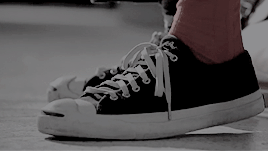
Summary: When a trip to your Dad’s hometown of Hawkins goes wrong, you end up in the year 1983, and have to learn how to cope with being stuck in the past.
Pairing: Steve Harrington / Future!Reader (Slow Burn)
A/n: This is my first stranger things fic, I’ve done other fandoms, and i’ve been itching to get this idea out, let me know if you liked the first part, and if you want to be tagged! (Pls be nice, i’m shy lol) (Also, I had this on a side blog, that I decided to bring to my main blog)
•••
The 1980’s were weird, that was your final opinion. Mainly because it was so much like home, they had phones, they dressed almost like you were used to, they had music you’d grown up on, like The Clash and Elton John, but a lot of the songs that were decades older than you, were new to them.
And while you knew every lyric to ‘The Safety Dance’ and ‘Come on Eileen’ everyone around you was still trying to learn them, and would jumble them from time to time. But at the young age of two, you were dancing along to The Clash while your dad laughed and danced with you.
Knowing that some songs you loved wouldn’t come out for up to twenty years later made you upset, not being able to listen to Nirvana. Suddenly you wanted to be in the car, listening to your dad try to sing along to Ed Sheeran or Taylor Swift. It was always amusing seeing his reaction to the newest songs on the radio while he drove you to school.
There was another thing about this time period that you found weird. They actually had lockers. All of the lockers from your school had been taken out in the late 90’s when a kid hid a gun and drugs in his, so no one had lockers except for in the locker room. So having to remember two different combos was a pain in your ass.
“L/n!”
A heavy sigh escaped your nose as your lips went thin in fake annoyance even though he hadn’t fully approached you.
“What do you want, Harrington?” You questioned, turning from the open grey locker to see him just a few feet away.
He gave you a look of fake offense as he leaned against the locker next to yours a hand over his on his chest, sadly were the latch of your own was, so you couldn’t use the door as a shield,
“Hey, now, who said I wanted anything? I just wanna talk to my friend.”
You were kind of friends. He was nice, at least to you. Though you’d seen him be a douchebag to other students. The cliche you’d seen in a movie of highschool. The popular guy who only cared about popularity and the people he was around. And you didn’t know why he thought you were a good person to be around, because when you were six you accidently set your curtains on fire while the babysitter fell asleep. And you were pretty sure you gave off ‘crazy bitch’ vibes.
You turned back to the locker and shook your head, grabbing your English textbook and looking back to him, a hand holding onto the door while you leaned into it. “Okay, why do you want to talk to me?” You questioned with a fake smile.
“Alright, grumpy. Tommy H, Carol, and I wanna hang out at yours tonight. My parents don’t leave for three more days, and Carol’s mom hates Tommy, and you know how Tommy’s dad is.” He explained, looking down at you.
You hummed in amusement. “Not happening.” You responded, grabbing the hood of his hoodie and placing it in his locker, closing the door in on it. “Have fun.”
“Y/n!” He exclaimed in a sudden panic at being stuck in your locker, not being able to pull himself loose. “This isn’t funny, I will tell Mrs. Click!” He threatened as you stepped back, a genuine grin on your face as you looked up at him.
“A tattle tale? Didn’t think you’d stoop that low, and also, Mrs. Click? You think I’m scared of my History teacher? She’s afraid of saying ‘Wench’ out loud while we reading historical texts. She’s not intimating.”
Steve nodded a bit in thought. “Yeah… Okay, maybe I didn’t think that through, I’ll go to principal-”
“If I get suspended, I get suspended.” You shrugged. “Find a way to get me something to listen to music on, and something that has music on it, and then I’ll let you go.”
“Are you… Are you bribing me? Y/n L/n is bribing me? The new girl is bribing me.” He said in awe, still grasping onto his hoodie, looking at you with his mouth agape and his eyebrows raised.
When you only tilted your head he groaned, pulling on the cotton material. “Fine, Walkman or Record Player?”
“Hmm… Walkman.” You replied.
“Queen or Blondie?” He questioned, a smile coming across your face as you reached up to the lock.
“Both.”
Steve rolled his eyes as you unlocked your locker, setting him free. “That wasn’t fair, you look innocent.” He grumbled.
You mimicked his eye roll, closing the locker and walking away through the hall. ‘Fair’ being repeated in your head. Nothing was fair anymore to you. You’d been normal, just an annoying kid who was obsessed with Grey’s Anatomy, and history. That was what you had to your name. Your friends had once watched the bad uneducational tv show with you just to try and understand your obsession, you dad even had given it a chance, only saying that most of the characters were annoying.
But you only had history now. And some of the things you were supposed to learn in AP European history haven’t even happened yet. And it was freaking you out.
What was freaking you out more? Knowing you had a ‘classmate’ in your History class, who sat next to you, and was your relative. Your dad’s brother.
Sitting next to him was strange. Because he was your uncle. He’d been the one who bought you your first bike, and watched you fall off and break your wrist after your dad had let go of the bike.
To say that being his partner on a history project was weird, was an understatement. Because the entire time you felt like hitting your head against the desk, because he didn’t really change.
“What’s so important about a quote?”
“Are you serious?”
“As serious as the Titanic.” You responded, brows furrowed.
He stayed quiet for a moment. “I don’t know.” He admitted, receiving a chuckle from you as you watched him flip through the book. “I don’t even understand this project.”
“Come on, we have to choose a quote from a historical piece of fiction, We were assigned Romeo and Juliet.” You said grabbing your book and flipping to a certain page. “Romeo, oh Romeo, wherefore art thou Romeo?” You teased, knowing that the page you were on didn’t have that in there.
The boy was technically older than you, but right now, you were the same age, and he was shaking his head with a smile. “It’s like she wanted him to be stalking her.” He responded.
“What?”
“She’s asking where he is.” He shrugged. “It’s weird, cause he still doesn’t come out when she asks that.”
“That’s not what she means. It’s early modern English. Phrases were different. She’s asking why he has to be Romeo. In modern words it’d be ‘Romeo, oh Romeo, why does it have to be Romeo.’ She’s upset because the guy she likes is in the enemy’s family.”
The boy looked at you, eyes scanning your face for a moment, looking for any hint of you joking, but he didn’t he finally spoke. “You could teach this class better than her.” He said in a hushed voice to make it so Mrs. Click didn’t hear.
“No-”
“L/n!” The two of you snapped your attention to the older woman who was scowling. “Back to work!”
You rolled your eyes and looked back to him as the bell rang. “That’s our cue.”
The 80’s were weird, and you didn’t like them. What with being so similar to home. With your uncle in the same history class as you, and being close to your dad, but older than him and not seeing him as your dad. And knowing people around you who were almost Baby Boomers, and in your time, would reprimand you for the jokes you made and your views of the world.
Being 16 in your time had been easier, able to cheat off websites for homework, and texting, which seemed to have been taken for granted by you.
Here, you couldn’t say you didn’t have a mom, but rather two dads. Because it was the 80’s and you knew the comments you’d get. You also couldn’t say your full name. That the dad you were genetically related to was the one who gave you the second last name that your uncle had and everyone would question it, and it pained you not being able to go by it, because he’d taught you more things than anyone else ever had. He’d taught you how to ride a book, and said that he’d be disappointed if you ever got ditching class, and that if you were going to do it, not to get caught for his sanity.
You would regret ever coming to this town with him, and you would regret the choice to ever run out of Enzo’s after your other dad yelled at you for being drenched from the rain after you ran in, finding that it was a formal restaurant and not a casual one. You’d regret going into the woods and getting lost, because all you wanted, was to be held by your dad and have him tell you it was going to be okay, You wanted to hear him walking down the hall late at night when he couldn’t sleep and you were hiding under your blankets with your phone, tying not to get caught for being up late.
But you had the fear that you’d never see your dad, as your dad. That you’d have to continue growing up in a time that has been written in history books. That you’d have to watch as technology progressed, and that you’d be conscious and aware for the year you were born.
You were still a kid, even if you didn’t look like it. Just six year ago, you’d been in elementary school, and you still got nightmares and went to your dads’ room because you were still scared of sleeping alone. You hadn’t been since, until now. You could barely sleep at night in the unfamiliar room of the motel you were living in, without your parent’s room down the hall.
But you were trying. And you wanted to redo everything, if you could build a time machine, you would. But that hadn’t even been available in your time, let alone 83’.
130 notes
·
View notes
Text
Fantasia at 34
A review by Adam D. Jaspering
By 1940, Disney proved he was as large a titan in the world of feature films as he was in animated shorts. But as the saying goes, a man's reach should exceed his grasp. His third feature, Fantasia, would be an audacious experiment.
Disney had been synchronizing animated cartoons to classical music since 1928. His trademarked Silly Symphony shorts earned him seven Academy Awards. They were a foundational element of the Disney empire, but they were outmoded by 1939. Audiences were preferring plot-driven shorts.
Coincidentally, another Disney creation was also in decline in this era. It’s hard to fathom, but Mickey Mouse’s popularity with audiences peaked in 1935. By 1939, he was eclipsed by both Donald Duck and Goofy. More frequently, Mickey appeared alongside the two than appearing in his own independent shorts.
Disney had plans to bring both musical shorts and Mickey Mouse back into the limelight. Disney employed the assistance of The Philadelphia Orchestra and conductor Leopold Stokowsky. The Sorcerer's Apprentice was completed in 1938, pairing Mickey Mouse with the music of Paul Dukas in a nine-minute cinematic epic.
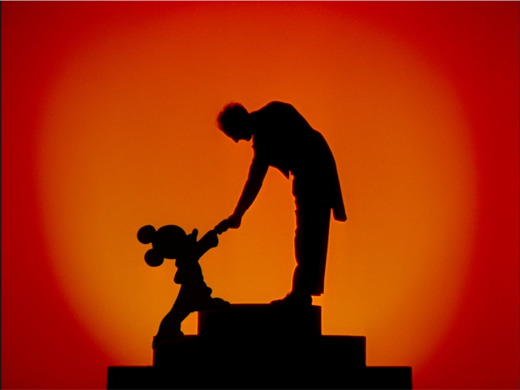
However, Walt Disney’s brother Roy, accountant for the company, crunched the numbers. The $125,000 budget made the short a logistical nightmare. To make a profit, the short needed to be released as a feature film. And to be a feature film, it needed to be feature length.
The Concert Feature, as it was initially called, grew in size and scale. The budget grew to $2.8 million. The crew ballooned to over one thousand artists and animators. After much effort and many headaches, Fantasia was finally released in November, 1940.
The film starts with a heavily stylized depiction of the orchestra and their instruments. The background is blue and vibrant, but every musician is ensconced in shadow. Lights from the music stands illuminate a negligible part or their personage. We can see the musicians, but only just.

From the onset, the film accomplishes two goals: First, it wants you to understand you are seeing live-action people. Mickey Mouse is on all the posters. Disney’s name is attached to the film. But these are real, non-animated people. Quite possibly the first live-action people filmed by Walt Disney since his Alice shorts.
Second, Fantasia wants you to realize you are seeing real people, but they are not the focus. The attention is not on them, but their instruments. This is a film not about people, but sound and music.
This is furthered as the sounds of Bach’s Toccata and Fugue in D Minor begins. The silhouettes of the musicians are projected onto the backdrop, scaled larger than their sources. The musicians become literal giants. The shadows create a form of puppetry, becoming indistinguishable from animation. Fantasy and reality, sound and imagery have become intertwined. It’s difficult to determine when the cameras stop rolling, and the ink and paints take over.

We are informed from the outset that Fantasia’s visuals are not those of trained musicians or scholars. These images are the thoughts and feelings of animators and artists. We are privy to new interpretations of classic works (well, new to 1940), beginning with Toccata and Fugue.
Defined as “Absolute Music,” Toccata and Fugue is an instantly recognizable piece of classical music. It is the go-to stock music whenever a movie, TV show or cartoon wants to quickly and unmistakably associate a scene with a sense of foreboding doom. But Fantasia undoes this eternally mired association; the booming bass offers no semblance of the intimidating or macabre.
Emcee Deems Taylor warns outright we’ll be experiencing non-representative form and abstract imagery. If the impressionist movement coexisted with film, it would probably resemble something like this. In a way, it’s almost a warning for impatient and fickle audiences. Doubly so, as it leads the procession of animated shorts. It’s a fair warning: This is experimental film. Your mileage may vary.

The abstraction gives way to the first representative piece. Tchaikovsky’s Nutcracker Suite; perhaps the most widely known ballet in modern society. We get a great demonstration about the longevity and shifting legacy of classical works as Taylor informs us “nobody performs it nowadays.” Art does not belong to an era, it belongs to the ages. I’m 34, and I’ve never known a Christmas where The Nutcracker wasn’t being performed somewhere in the city.
The Nutcracker Suite depicts the various flora and fauna of an enchanted forest, all engaged in a unique and stylized dance suited to their physique. What’s more, each movement is indicative to a nation and culture. We see Russian flowers, Arabian fish, French blossoms, and Chinese mushrooms (questionably stylized Chinese mushrooms. Thank you, 1940s).
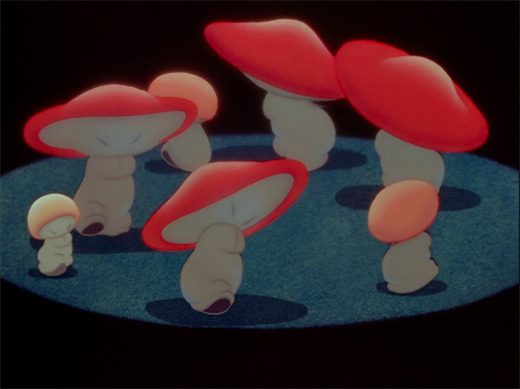
As problematic as the mushrooms are, I’m more perplexed by the Arabian fish. Obviously the sequence is an allusion to the eroticized stereotype of middle eastern women, particularly the Dance of Seven Veils and other subsequent belly dance numbers.
It’s a very g-rated version of the burlesque staple, but one has to wonder why it exists at all. At some point in the late 1930s/early 1940s, someone designed a fish to look and act like a belly dancer. Those eyes exist only for the purpose of portraying a sense of eroticism. Not to kinkshame somebody on Tumblr, but it’s very clear somebody on Disney’s staff was working through some things.
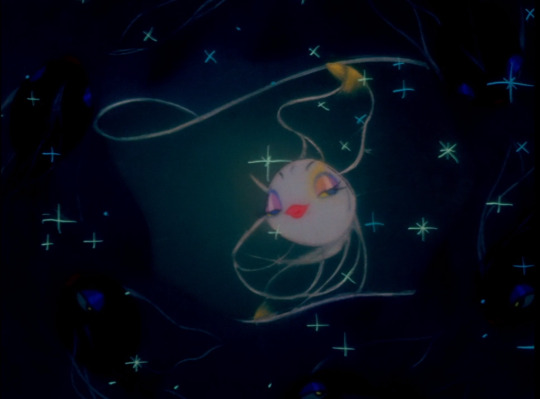
Each of these dances feature plants and animals evocative in style and movement of their corresponding dance’s nationality. This implies the animators were indeed versed on the background of Tchaikovsky’s Nutcracker Suite and his original intent. This breaks the promise from the start of the film: interpretations of artists, not of scholars.
It’s not an invalidating breach, and not total (surely Tchaikovsky never intended Clara and the prince to meet an amorous fish). But if Fantasia deliberately specified itself to not utilize scholarly interpretations. They waffled on this promise, and it should be noted.
Dukas’s The Sorcerer’s Apprentice is an interesting specimen. Not only has Mickey Mouse’s cautionary tale of a proper work ethic completely eclipsed its musical source in popular culture, but the short has eclipsed the entirety of Fantasia.
When one hears the word “Fantasia,” one’s mind immediately leaps to Mickey Mouse in a bathrobe. They think of the blue hat, festooned with stars. They think of an army of brooms, brought to life, obediently and endlessly carrying buckets of water. They think of the bassoons secondarily. Most are unaware the music existed before the movie.

That said, there is no better representation of Fantasia’s central tenet: a marriage of animation as an artistic medium and classical music as an eternal font of inspiration. In The Sorcerer’s Apprentice, not a word of dialogue is spoken and not a single intertitle is used. An idea is formed, expressed and delivered by the movement onscreen, buoyed by the themes and mood of the orchestral score. What results is a tale beloved for generations.
Stravinsky’s The Rite of Spring offers a brief history of prehistoric life. We see the cosmos create planet Earth. Tectonic plates shift and form land. Life is formed, evolving from single celled organisms, progressing up the evolutionary ladder. But this truncated history of eons and eons comprises only half the segment. The remainder is a grandiose depiction of life in the nadir of the Mesozoic Era. Dinosaurs in all their titanic glory.
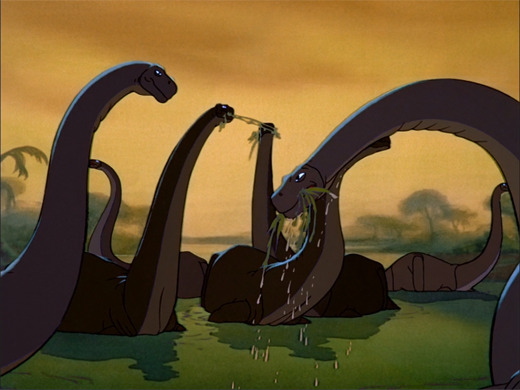
Every few years, an animation company attempts to create a dinosaur-centered film. Either through lack of confidence or executive meddling, these dinosaurs aren’t allowed to simply be dinosaurs. We don’t see the glory of the creatures or the power struggle between herbivore and carnivore. Instead, these dinosaurs speak. They learn lessons and have character arcs. They’re often used as a parable of teamwork and community, or an allegorical tale of standing up to one’s oppressors.
Disney themselves fell into that trap in the year 2000, but we’ll address that soon enough. Dinosaurs are mesmerizing in their own right, as the animals they were. They require no personification. They need no story and no character. A musical short may be the closest we’ll ever get to such a film. For now, we can still enjoy the sight of a tyrannosaur fighting a stegosaurus to the death.
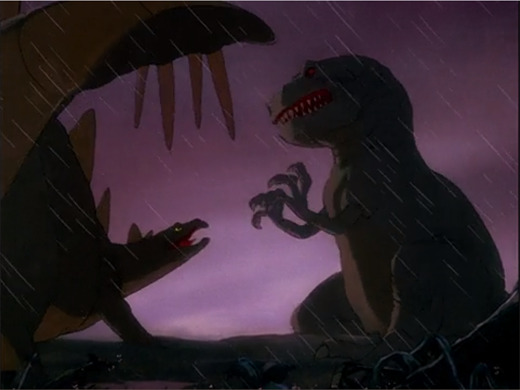
An interesting element of Fantasia, a remnant of a bygone era, is the intermission. When Taylor announced the film would break for a 15 minute intermission, I was concerned as the orchestra began slowly shuffling out of the amphitheater. Was the movie really going to stop? Fantasia is already fighting an uphill battle, trying to keep audiences with temperamental patience captivated. Stopping all inertia for fifteen minutes is suicidal.
Many films from the first half of film history, especially those longer than three hours, survive in their current forms with an intermission built in. Their home release is presented exactly as their theatrical release. The score’s overture plays over a meticulously designed title card, encouraging theater-goers to stretch their legs and visit the lobby. These intermissions have been preserved for posterity, but are wholly inconsequential with fast forward buttons and chapter select options.
I was concerned such would be the case for Fantasia, which barely crests the two-hour mark. It’s the longest of all Disney’s animated features, but surely that record is not because of a deliberate 15-minute time out? If persnickety audience of the 1940s needed a break, what of children in the digital age? They would minimize the window and never return.
Fantasia’s title card is present, but immediately returns back to the film, all for the better. It’s a pointless detour maintained for an illusion of legacy and integrity. Fantasia’s musical numbers are all well and good in their own right, but the live-action segments with the orchestra is full of questionable moments like these.
For example, at one point, a percussionist interrupts Deems Taylor by knocking over his bells. There’s no build up to this, no explanation, and no commentary. It happens, and is promptly forgotten. If it’s a joke, it makes no sense. If it’s a mistake, why was it left in?

Perhaps Disney had no idea how to carry these live segments. He was afraid to let the segments speak for themselves, feeling obligated to inject them with more than a curated introduction. He needed to pepper in little moments that would either change the dynamic or mandate attention.
These moments rob the gravitas delivered by the orchestra, interrupt the flow of the picture, and make the audience wait impatiently for the next segment. Disney Studios would experiment with live-action film over the next decade, but these missteps display exactly why Disney Studios was not ready for a fully live-action film until the 1950s.
Beethoven’s Pastoral Symphony is not the strangest segment of the film, but it becomes more surreal the more it’s examined. Early on, after a brief dance with satyrs, unicorns, and pegasi, we’re greeted with a number of topless, bathing centaurettes. One wouldn’t think Disney would brazenly depict frontal nudity, but there we are. Fully nude cherubs further the dissonance.

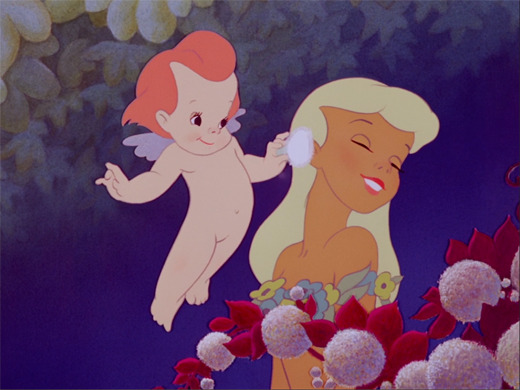
Greek and Roman mythology contains stories of heroes, legends, monsters, and adventure. It’s also rife with depictions of incest, rape, violence, and general malfeasance. Adapting any tale concerning the Olympians requires great skill, lest it be so thematically vulgar, it’s outright rejected by modern sensibilities. Even moreso when the tale is to be presented in a G-rated setting. As obvious a statement this may seem, it’s odd for Fantasia to have an entire segment dedicated to the Roman deity Bacchus and his trademark love of wine.

To say the wine flows is an understatement. A golden chalice overflows with some of the most tantalizing violet liquid ever depicted on film.I don’t even like wine, but I would take up a glass if it was offered.
Bacchus merrily sways back and forth in a drunken stupor for his entire appearance. Caught in a mixture of revelry and lightheadedness, the inebriated god is the central figure of a literal bacchanal. Fantasia was released the same year as Pinocchio, which depicted drunkards in such a negative light, they were turned into donkeys. Bacchus rides a unicorn-donkey who enjoys the taste of wine as much as his master. Behold: The duality of Disney.
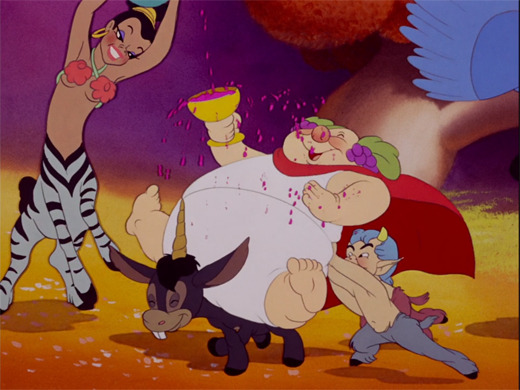
Ponchielli’s Dance of the Hours is perhaps the second most famous segment to come from Fantasia. The premise behind the segment is simple. Ballerinas are renowned for their lithe bodies and graceful elegance. What if, instead of traditional ballerinas, they were depicted by animals? Animals renowned for their girth, gangling physique, or stumpy limbs? It’s the contrast that provides comedy. Whatever age, whatever era, it will always be funny watching a hippopotamus do ballet.

As such, Fantasia gives us the sight of ostriches, elephants, alligators, and hippopotamuses, dressed in traditional tutus and slippers, dancing to the best of their ability. To the animator’s credit, the disparate physiques of the animals are hardly an issue. The absurd sizes and shapes of the animals bend and flex in a comical, but equally elegant manner.
The final segment is a combination of Mussorgsky’s A Night on Bald Mountain and Schubert’s Ave Maria. Here, the devil presides over Walpurgis Night, welcoming ghouls, ghosts, and witches alike from the realm of the damned into the world of the living. They are then conquered, banished back from whence they came, by the choir of a mere church processional.
For the longest time, I’ve heard the central figure of this piece referred to as “Chernobog,” a central figure of Russian and Balkan folklore. Much like Honest John in Pinocchio, this naming must be supplemental or subsequently; he is never referred to as Chernobog in the film. He is simply referred to by Taylor as “Satan.”
So far in Fantasia, we’ve been exposed to murder, alcoholism, nudity, and sexy fish. Having the Prince of Darkness make an appearance is the final taboo that Walt Disney could break. Perhaps this is why the name Chernobog was attached retroactively. Pious Americans couldn’t abide a depiction of the devil in an animated feature.

All in all, I prefer the idea of the horned figure being a literal depiction of Satan over Chernobog. Primarily, it makes much more sense thematically. Why would a Russian myth be toppled by a Christian hymn? He wouldn’t, unless it was some misguided attempt at an analogy of Christianity versus Paganism. But why make an analogy when the literal interpretation is exactly appropriate?
Possibly, western righteousness defeating a Russian emblem could be interpreted as a Cold War fable. This is rather unlikely, as the Cold War didn’t start in earnest until years after Fantasia’s release.
Second, if we interpret the character as the devil, it further serves the story Disney’s animators were trying to tell: one of good versus evil. Darkness versus light. Chaos versus order. The sacred versus the profane. Dramatic conflict in both imagery, mood, and music. The wild, unbridled chaos of Walpurgis Night, contrasted against the elegant calmness of a serene morning in May. If the demon was indeed Chernobog, it shows either a complete misunderstanding of the mythic figure, or a complete noncommittal to the story.
The Night on Bald Mountain portion is impressive and magnificent. The terrifying monstrosities are a cornucopia of Halloweenish delights, and they move with such intensity and power. Fire is used as a uniting theme throughout this segment, and the heat and intensity can be felt through the animation.

I cannot find any sources confirming this, but it feels like the spiritual successor to 1922′s Häxan. Disney animators evoked the sensation of German Expressionism (particularly the works of Robert Weine) in certain moments of Snow White. I wouldn’t be surprised if Häxan served as a primary influence here.
Satan is depicted in an imposing, terrifying form. It’s a laundry list of every evil hallmark. He has glowing eyes, fangs, horns, bat wings, a muscular physique, sharp claws at the end of each finger, the ability to manipulate shadows, and more identifiers plucked from the nightmares of children everywhere.
Ave Maria sits in an odd position in popular culture. It’s been completely co-opted by the Christmas season. So much so, hearing the music detached from a holiday setting strikes up feelings of confusion. Moreso is hearing a quiet, choral interpretation backed by strings, and not a tenor vocalist belting out the opening at full force. It’s beauty is in its restraint. As the beatitude goes, blessed are the meek.

What’s more, after the thundering bravado of A Night on Bald Mountain, the hushed woodwinds and strings seem almost ashamed to make noise. Throughout, I was wondering when the piece would truly begin. Then, before I received my expected answer, the film ended. Ave Maria truly is the counterpart; quiet, dignified, and penitent.
Sitting in the darkness, watching a black screen, I’m met with nothing but a void. There’s no farewell from Stokowsky or Taylor. No final bow from the orchestra. No coda. We the viewer are simply left with a vacuum of sound and imagery. A moment, at last, to fully reflect on what we had seen. Music had provided us images and stories for two hours. In the aftermath, silence and darkness were just as powerful.
Unsurprisingly, Fantasia was a commercial failure upon release. The avant-garde presentation simply didn’t meld with audiences expectations. The film earned back roughly $325,000 of its $2.8 million budget.
But, as I previously mentioned, art does not belong to an era, but to the ages. Critical and audience approval of the film has grown in subsequent years, and Fantasia is considered one of Disney’s masterpieces. It even turned a profit in 1969 after a series of re-releases.
Sometimes a grand experiment begins with a meager idea, like marketing a corporate mascot. Sometimes that idea can blossom into a grand work. And sometimes a showpiece needs to age like wine before it’s appreciated properly. We’ll never know our true legacy, but a truly good idea, like good music, will be appreciated through the ages.
Fantasia
Snow White and the Seven Dwarfs
Pinocchio
#Fantasia#Disney#walt disney#Walt Disney Animation Studios#Film Criticism#film analysis#Review#Disney Canon
8 notes
·
View notes
Text
Natsume FFXV Crossover Notes
I’m trying to organize my thoughts and figured an update might not be a bad idea for the people without access to my thoughts. So here you go.
Let me know what you think?
(Will probably change as I write things, and I'm certain I forgot explanations and notes I was going to write because of tangents… So sorry about any confusion.)
World Notes
General World Notes
- FFXV setting with Yokai/Ayakashi based on Natsume added.
- Plot of Natsume happened during his teen years and he and his friends are now adults, 21-26 ish so they’re around Noctis and Co.’s age.
- I'm classifying some yokai or yokai abilities as “divine” for lack of a better word. This is yokai such as guardians of temples, and abilities such as Nyanko-sensei/Madara's purification ability. Yokai with this classification are generally more powerful than equivalent non-divine yokai, and have power over the world in some way. They so tend to be bound up in complicated rules most ayakashi don't have to deal with. In exchange Divine Yokai are generally not affected by yokai exorcism, or at least not to the same extent, it depends on the Yokai and situation, aka the plot. Yokai with divine abilities are also usually powerful, and tend to be exceptions to rules that usually apply to all yokai.
Astrals
- The Astrals are the same type of creature as the deities Natsume bumped into in the Moon Splitting Festival, powerful on their own but regenerate their power (if they use it up doing things like making the land fertile) through worship of humans. They all fall into the category of divine beings Madara can probably oppose and maybe manage a win, but it would probably get him cursed.
- Bahamut, Ramuh, and Leviathan are all at their original undamaged power percentage, having never taking a serious blow to cut their power. They are about equal in power to Fuzuki from the Moon Splitting Festival, since he hasn’t been diminishing his power like Hozuki was.
- Titan, Shiva, and Ifrit are at post-damage power levels. Titan however has a lot of worshipers and followers that he amassed while dormant, so his damaged power level is about equal to his non-damaged brethren. Shiva and Ifrit are about equal in power to Houzuki (who is not as powerless as they appear in the Moon Splitting Festival episode).
- The Astrals are both powerful enough to be seen by humans and chose to be so. The deities in the Moon Splitting Festival (unlike in Natsume canon!) can also make this choice, but generally chose not to.
- Each Astral has a realm of influence. Their influence changes the feeling of the area, such as how welcoming it feels or how prone its inhabitants tend to be towards settling in one place.
- Bahamut's influence is over Insomnia, and his disapproval of yokai/ayakashi makes them less common, and the ones who stay in spite of the encouragement to leave tend to be stronger and less family/group based. Insomnia tends not to be comforting, but has a feeling of purpose living there that generally feels lacking when moving away. This feeling of purpose can also feel grating tho, like being forced to do things all the time can be draining.
- Titan's influence is centered on his temple in Old Lestallum, but has also spread from his physical location at the Disk of Cauthess. He appreciates life that thrives but especially the kind of life that can cooperate to do so, like early settlers of the area or yokai living among the forests and human settlements in symbiosis. Titain's power is more attractive to those who are clannish and protective of their important people. It also exudes the feeling of being guarded, since Titan was injured protecting the area and those in it. This can be comforting or constraining depending on the individual and how they feel at the time.
- Ifrit's influence is lingering over Ravatogh, but is also present in the Meteor and it's shards. His influence is both the creative inspiration he gave to Solheim and the impulse to act that can both lead to good decisions without hesitation and quick bad decisions based on anger or lack of forethought. His anger at the war of the Astrals also lingers in the sphere of influence over Ravatogh making the area less friendly to living things that can feel it, but it has been largely tempered out of the Meteor by Titan's protective influence. Lestallum started based on inspiration of those drawn to the Meteor and thrives on those working with the shards now. Tempered by Titan's influence towards cooperation it's the most successful new settlement in a millennium.
- Shiva's influence is centered around her corpse, but is also present in Tenebrae where her messenger lived. It tends to encourage self-possession, people who know what they want and go for it regardless of what anyone else might think. This helps people like Lunafreya keep their strength up in bad situations, and allows people like Versatile and Ravus to pursue their goals without worrying about the morality of them. As the same time it also encourages self-restraint, not in matters of morality but in not revealing yourself too easily. This can be armor but can also make it harder for the individual to understand their more “firey” emotions.
- Leviathan's influence is found deep in the ocean, and while certain things can bring it to the surface it's much weaker up there. The strongest surface place is the Altar of the Tidemother, where she was worshiped and interested enough to look at humans in return. Her influence is part of the strange feeling the Ocean has, where it's huge and vast and cares nothing for if you live or die. If you want something you have to go after it yourself, there is no promise of divine intervention or idea that you may get ahead if you do things the right way. There's no judgement from a higher power for doing something underhanded, and if you want rules you have to find a way to build and enforce them yourself. This attracts those with a drive to get ahead and play the angles, eventually leading to the founding of Altissia. Leviathan herself takes interest in those who fight for what they want, but that's no guarantee she will respond to a plea for aid even from those she likes.
- I have no idea about Ramuh right now?
Starscourge
- ???
- As far as I can tell canon Starscourge is explained as a mutated malaria virus. But it also drives people mad before vaporising them and the resulting Miasma somehow both eats sunlight preventing it from reaching the ground, and generates demons based on the remainders of the mad dead people's egos that die instantly in sunlight. These vaporised egos can also apparently be used to power magitech armor but the ego in them makes them difficult to control??? And the "only"/prophesied cure to the disease is to kill Ardyn (who is neither the source or receptacle of the disease, nor the source of its recent resurgence, tho he did help it along in the last 30 years), then to die so we can kill his soul. This somehow purges the Miasma. (And spoilers? depending on if the book is canon or not it may be the last part needed for a world killing wave Bahamut wants to use?) I also can't figure out where in the game I bumped into the explanation that the Starscourge is from the meteor Titan is holding? Because it's something everyone in the fandom thinks is true now that I go looking but is apparently not canon?
- And a cure?? I have no idea, really??? But I have some thoughts???
- Has existed at least since Solheim, and was around long before Ardyn.
- It infects yokai/ayakashi as well as humans and animals.
- Is probably a miasma in the greek tragedy sense? (If my greek dramas seminar in college is to be believed) Miasma in greek tragedy apparently coincided with someone who was “to blame” and whose death was needed to stop the poison from killing people. The King does bad and the whole kingdom suffers kind of thing. But if they don’t kill themselves in penance then the person that kills them becomes the problem and the miasma continues. Not sure where I’m going with this but it matches nicely with the Natsume system of problem solving being about emotions and experiences?
- Probably need the modern trope of a Panacea to cure it? Something everyone worked together to get/make (in true Natsume fashion) to give to Noctis after the 10 years???
- How do I cure this??
- Did this disease ever even make sense?
Character Notes
Natsume
- Born in Duscae, Natsume’s family is descended from people who settled Old Lestallum a thousand years ago, so most of his relatives (who he was passed between as a kid) were from the Lestallum/Old Lestallum offshoots area. However he did have a few relatives in Insomnia he lived with as a child for a little bit.
- Natsume had never lived in Old Lestallum until the Fujiwaras took him to their home there. He loves the town because of the good memories there and intends to live there the rest of his life if he can.
- Because of his unique heritage Natsume has the ability to help purify Yokai/Ayakashi and help them move on (in the psychopomp way or just therapy way) even when those difficulties are caused by infection by the Starscourge. He’s unaware that he’s purifying the disease when he does this, thinking those cases are just more dramatic versions of what he deals with every day.
- Examples of the above are Shigure (the luck god trapped in the old school), Rokka (leader of the Masked Yokai), and Sui (the broken guardian and companion Gen was trying to save). The Mirror Yokai’s ill friend also has the Starscourge which is why he disappeared on her, not wanting her to get hurt when his emotions were bad.
- Natsume still lives in the Fujiwara’s house, and is technically employed by Tanuma’s father. He travels the area making sure the wards on the Havens are fully powered and has the rest of the time to devote to Ayakashi problems.
- Natsume feels like this should be a temporary thing rather than a lifelong job and that he’s taking advantage of Tanuma for employment, while Tanuma is worried they’re using Natsume for their safety the way others have tried to. But he’s happy and Tanuma is happy to be working with him so they reassure each other it’s ok.
Tanuma
- Due to slightly different setting details Tanuma decided to follow in his father's footsteps as a priest. He is currently his father's apprentice, but is mostly left to his own devices at their home temple while his father travels.
- The little used temple he and his father moved to in Old Lestallum is Titan's temple there. It was once the main one, but as Old Lestallum wanted in population and importance it was abandoned in favor of temples elsewhere, most especially the temple/tourist attraction at the Disk of Cauthess in modern day.
- Several temples to Bahamut have also sprung up in the area, much more regimented and grander than Titan's newer temples due to the active ancestor worship of Lucis being mixed in.
- While people in Old Lestallum kept the main temple building and living areas more or less clean, they didn't take much care of the grounds. Enough care to keep the wards up, but not much more (not that they were really aware of this, it was just muted respect and in case a new priest moved in).
- Since Tanuma and his father moved in the wards have strengthened. At the same time Natsume has been incidentally expanding and strengthening the weak wards around the town his grandmother had created by living there. This makes Old Lestallum a remarkably safe place compared to elsewhere in Lucis, and people have started attributing it to the temple's new care pleasing Titan. (Hense how the temple's income can support 3 workers now.)
- As caretaker to the temple, Tanuma has gained some strength from growing up there. He still has a weak constitution, which yokai/ayakashi can stress by being present, but his stamina/resistance is much better now.
Noctis
- Ever since he was little Noctis realized he could see things other people couldn't. In his case, unlike most others who can see yokai, the ones he saw were few and far between due to living in the Citadel, the center of Bahamut's influence. Pretty much the only one that interacted with him was Carbuncle, and they were a benevolent guardian spirit.
- After his injury, while in Tenebrae, he saw more “spirits”, but also learned Luna could sense them (but not see them) when she sensed Carbuncle with him. This lead him to believe the ability to see/sense spirits was tied to him and her being chosen ones.
- He tries not to worry his friends by any weirdness with creatures other than Carbuncle, but he doesn't try to hide that he can see them either, assuming it's understandable, so they just accept his little comments as well.
- After leaving Insomnia and entering Titan's influence he starts seeing a lot more, and less refined ones and is getting overwhelmed.
Lunafreya
- As one of the line of the Oracle Luna has the ability to sense people, such as knowing where they are in space in relar to her, and if they're sick or injured. This extends to yokai/ayakashi though she isn't able to see them unless they have the ability to make themselves visible to humans.
- Umbra and Pryna are yokai guardian dogs, what their divine abilities allowed them to assume a form visible to humans, which is how Lunafreya found them as puppies. They have since adopted her as their charge. Gentiana has accepted them as her guardians due to them being divine, she wouldn't have allowed any other yokai near her charge.
- Gentiana is also ayakashi and has the ability, from Shiva's power, to become visible to humans, though she can be more seletive of who can see her than most can.
Taki
- Taki grew up wanting to be able to contribute something to helping her friends that they couldn't just do without her. This lead her to joining the Hunters so she could keep them safe, and she has since become an expert marksman, (though she largely prefers the bigger guns hunters in the game use rather than pistols like Prompto).
- She generally sticks to Cauthess, because most of Natsume's travels are in the area, but she has become good enough at her job that she is asked to help further afield occasionally.
- She still remembers many things about yokai from her grandfather, and what she learned from growing up with Natsume, so she can sort of tell if ayakashi things are happening and ask for him to help. She still tries not to draw her circle until he (or Tanuma or Natori lately) tell her it's ok with the yokai.
Reiko
- A woman yokai speak of in fear and respect and humans talk about in disdain if at all, but nobody really knows anything about. She lived in Old Lestallum and in spite of bad experienced there saw the area as her home. This was enough to take protective barriers around the town, but weak ones.
- More concentrated barriers were created around places she camped/spent the night because of her deliberately attempting to create a safe place to sleep. These eventually became Havens once she realized she could do it deliberately.
- Unknown to her, or anyone else anymore, and independent of her ability to see yokai/strong spiritual power, she is descended from a bastard male child of the Oracle’s line. This altered her powers just enough to make her unlike any other human's.
- Towards the end of her life she met Regis and company out in the wilderness around Old Lestallum. A strange unapologetic woman who laughed at them and called them idiots before helping anyway. She gave Regis specifically some pointed advice before sending them on their way. (Not completely certain what it was yet but not sure if I need to know.) When Regis went back to look for her later in life people were confused why he cared about that strange woman and he could only find out she wasn't well liked and had since passed away.
Regis
- Regis has no ability to see or sense yokai, but he was best friends with Aulea, who could but kept it a secret. On his road trip to Accordo in his youth he bumped into Reiko, now an adult. She was unconcerned with who he was, and unthreatened by his retinue. She didn't want anything from him either, but gave him some pointed advice on the world being more than what he could see that stuck with him through his trip.
- When he returned home he realized Aulea could see things he could not, and managed to broach the subject with her. After convincing her to believe him, and that he believed her, this brought the closer, lessening a bit the stress being able to see yokai had put on her. He respected her wish for it not to be known, even to his friends, until after her death, when he explained a little to Clarus (and maybe Cor) in relation to Noctis.
Aulea
- Per Word of God she's Regis’ childhood friend.
- Born into a low ranking Noble house in Insomnia she was the first in generations to be able to see yokai. However it wasn't unknown to happen, and her family had been on the lookout for it since implications of collusion with any spirit other than Bahamut needed to be carefully repressed. She grew up learning her ability to see strange things was to be entirely ignored, trained in composure and people reading (to determine what other could see).
- She also grew up responsible for the family's guardian spirit, Carbuncle. They were the only yokai she was allowed to talk to and then only in private.
- As an adult this composure training made her known as someone impossible to startle, and she gave up trying to fake alarm at things other really did see because it was a good reputation to have. (Those close to her learned to read her microexpressions and she was comfortable enough with them to drop the full mask to her more normal reserved self. Deadpan is her favorite I joke.)
- Either way, as a child she stumbled on Regis out alone, and ignored him entirely because there wasn't anyone else around for her to realize he was human instead of a yokai. This intrigued him, and when they were next introduced (at a public event her family had been invited too) he insisted on talking with her.
- Regis spent a lot of time with her as a child, so he saw her eyes flicker to things that weren't there, picking up on it because of his own training to avoid threats to the royal heir. He noticed her aborted movements and how she would look over at him for context, but didn't realize what it all was. Instead he dismissed it as a child can as just how the other was.
- After meeting Reiko something she said made him think about what his friend acted like, and he eventually concluded he should just ask her. Tho she was startled, Aulea was able to avoid an overt reaction but also decided to just agree he was right, startling him and herself.
- Since them the two of them sorted out how to discreetly hint something was up and Aulea allowed Regis to ask about yokai she saw in private if she indicated no yokai were nearby to hear. This is how Regis learned about the dragon yokai that lived in the throne room but just watched, and about his family's new guardian spirit, Carbuncle.
- After Noctis’ birth Aulea was able to tell Regis he had the ability to see Yokai since he would play with Carbuncle. She passed away soon after but not before making a Carbuncle statue to help the guardian protect her family.
Nyx
- As a child in Galahd, Nyx grew up in the shadow of an old temple, still maintained out of respect for the protective spirit (no one said deity out of superstition the Astrals might get offended) that lived there and their followers. Unlike most, tho, Nyx had a little sister who swore she could see them.
- Nyx still isn't sure if he believes Selena when she told him about the Coeurl guarding the temple, and he regrets that she died knowing he wasn't sure if he could believe her. He doesn't realize him trying to believe her and standing up to the people who insulted her “stories” was more than enough for her. He even walked with her the second time, when they were very young and she was scared of the wild cats everywhere but wanted to pay her respects at the temple.
- Selena befriended one of the guardians at the temple, and he lead some of the others down to try and help (without permission) when Nifelheim attacked. The temple was destroyed in the attack and the guardian was unable to save Selena. Unlike the rest who stayed to try and find those who flead the temple's destruction, this guardian attached themself to Nyx out of regret, and has been protecting him since. This is at least part of his ridiculous luck.
Libertus
- Libertus doesn't believe in spirits or guardians, because wouldn't they have protected Galahd if they existed? He respects Nyx's wish to respect Selena's superstitions but privately thinks he needs to let go of the little rituals to move past her death.
- On the other hand, he took in Crowe when they first met because she reminded him of Selena (tho he keeps looking out for her because of who she is now), so he's not coping with her loss as well as he thinks he is either.
Crowe
- When she mentions she was driven out of her hometown, Crowe lets other people assume it was by the empire. She doesn't mention that fearful villagers drove out what they thought was a cursed orphan before they could be cursed in turn. She's still seen the evil of the empire and wants to stop them, but she didn't have the personal stake people assume she has until she heard what happened to her new family.
- In her travels before being picked up by other refugees headed to Lucis, Crowe ended up giving in and yelling at a yokai to leave her alone. A crow yokai, Yatagarasu, heard her and their flock took pity on her, driving the yokai away. Yatagarasu took it on themself to help Crowe navigate the world of yokai, since they had gotten involved already. They and a few of the crows from their recent flock accompanied her in her travels, becoming her signature talent and inspiring many people to point out her name.
- Crowe is able to blame most of her jumpiness on the crows, because they get between her and yokai all the time, and hasn't told anyone she can see yokai. She doesn't want to get driven away again.
Pelna
- Pelna is from one of the smaller islands in Accordo which was mostly evacuated during Regis’ attempt to oppose the empire there. He spent most of his young life as a poor refugee along the Lucian coast, eventually moving to Insomnia when he proved compatible for Kingsglaive.
- Family superstitions that he grew up with require an offering of thanks in return for actions above and beyond the expected response to a situation. The superstition started as something similar to a temple offering you give to the helpful stranger to make sure if they're a spirit it knows you acknowledge its help so it doesn't throw a fit. Also decent advice for dealing with Exorcists. But the specific reasons have been lost to tradition. Now it's just the difficult to explain idea that if someone goes above and beyond for you, you owe them a well thought out thank you gesture, so they won't think you put less effort into coming up with the gesture than they did helping you out.
- If someone is close enough to be considered family it's mostly moot tho, just give them the consideration and care family is due, and that will repay their care for you.
Matoba
- The Matoba clan is a wealthy family in Accordo which also happens to be secretly Exorcists. They do own an old house in Duscae but it hasn't been used for more than a staging ground in generations.
- When Regis came to Altissia to oppose the empire the Matoba family took interest. Hunting yokai and yokai turned demons in secret was tiring and difficult. If they could get involved with Lucis they could have an excuse to be at many more locations, and armed. So the family inserted several of their members into the resistance, and once they fled to Lucis afterwards some of them were able to enter the newly formed Kingsglaive.
- Over the years multiple Matoba family members were able to infiltrate the Kingsglaive, including Matoba himself. They have no loyalty to Lucis, but are definitely anti-empire.
Natori
- An actor who grew up in Old Lestallum, Natori is really an exorcist whose cover job was surprisingly successful. Probably mostly famous in Insomnia unless Nifelheim and Insomnia share movies.
- He moved out when he was of age, fleeing his family mostly, but came back to deal with an exorcist request in his old neighborhood. Since meeting Natsume he has been spending more time in the area.
- I think he lived in Accordo and has recently bought a place in Lestallum instead maybe?
- Was in Altissia when the signing ceremony happened, probably waiting to meet with his agent or at a shoot. He's been trying to get news of what happened since then, worried for Natsume and co in Old Lestallum more than the city tho. He's most worried Natsume somehow got involved because he does that a lot.
Plot Summary
Crowe's Path
- I know the least about this path right now, but it insists on being a separate one from the other two, so I'm going to try to honor that.
- This path starts first, ish, with Crowe's mission from the Kingsglaive movie. For those not in the know, spoilers, this is a mission assigned by Regis to rescue Luna from house arrest in Tenebrae and get her safely to Noctis in Altissia. Only she's attacked and killed on the way.
- In this fic she is on her bike with the black van coming around the corner at her when the crows start going nuts, but not because of the van. Nope, there's a rogue behemoth that just came out from behind the nearby stone structure and has seen her. It charges her, body checking the van as it attacks her. She loses her hand and watch to its teeth and is thrown from her bike by the force of it. The bike is pretty totaled and she's struggling to get away when she blacks out. The glaives in the van open fire drawing it's attention, and are too busy fleeing the behemoth to keep track of her.
- Dave (the hunter from FFXV) was nearby tracking the behemoth for Hunter tags, and his dog drags Crowe to safety for him. He gets her into the van with a tourniquet and rushes her to medical attention. Once she's safe to be moved she's transferred to Meldacio HQ for the monster attack specialists there.
- Because of her mission, when Crowe wakes up she doesn't ask to send a message to the capital of what happened. She tries sending Yatagarasu back but they aren't able to talk to anyone but Nyx's guardian and just presence alone isn't able to get the message across. Someone will know when she doesn't make a checkpoint but not soon enough.
- Note here: I'm making her leaving the city earlier, to give her more than 2 days to pull off an infiltration rescue, especially when the empire probably had Luna traveling for at least one of those days.
- With the help of a post surgery potion Crowe's wound and bad bruises heal up enough to move around in a little under a week. But she still has to do physical therapy and learn to move around with only one hand (The amputation to clean up the injury is under the elbow but she did lose the hand and at least half her lower arm). So she can't head back to report in then either, much to her annoyance.
- To keep her cover she had a physically present gun for protection, as anyone traveling beyond the wall would have had some sort of physical weapon the lack of one would be strange. Only now most of her fighting ability with it is diminished due to needing to somehow use it with only one hand. Dave asks Taki to stick around for a few days and see if she can work with Crowe on adapting her style to one-handed. Taki agrees and tho Crowe is generally untrusting and frustrated she is thankful for the assistance.
- Once she can fire and reload the gun, if not all that well in the latter case, Crowe insists on heading back to Insomnia even though she's not done with her recovery or used to the loss of her hand yet. Taki is resistant to clear her, but really the say is Crowe's. So instead she offers herself as a driver, and Crowe a place in her truck on the way there. Crowe grudgingly agrees, since she can't be sure she'll be able to drive herself back even if she could get her hands on a vehicle.
- The make it almost all the way back before Dave calls them to pull I et and turn on the radio. Insomnia has fallen, and the empire has it blocked off do they can't even get inside. Crowe is determined to try anyway, her family is in there, but Taki refuses to let her and Yatagarasu promises to scout and report back if she waits here. So she caves and the duo stop at the local hunter station to rest and wait for news.
- Yatagarasu returns with a report. Not sure exactly what they found or didn't. Crowe is unable to either locate or join Luna's group, and isn't aware any of the royals survived.
- Somewhere around here Taki realises Crowe can see yokai because she's doing similar things to Natsume. She tells Crowe a this, and about the circle she can draw to make yokai visible and her experiences with Natsume. Crowe is skeptical and alarmed but Taki refuses when she offers to just have the other drop her off somewhere and go about her business.
- Not sure what Crowe's plan is at the time or ends up being (other than learning to use firearms and other weapons one handed)? I know most of the flexibility in solving the main plot comes from her trip, since she's a completely new element to the story.
- Since I was unoriginal and went looking for crow yokai, then ended up with Yatagarasu instead of Tengu, Crowe's arc probably has something sun related to do, not sure what. Is it Solhiem related or is that too much of a deus ex machina?
- No matter the plot they have the support of Dave. If they need a boat to get to Altissia/the other continent he's probably the one who finds them one
Luna's Path
- Luna's plot starts with Kingsglaive. She's in Lucis as a pawn of the empire and the Kingsglaive is sent to rescue her. Pelna is able to locate her on the ship as in the movie, and gets her out just in time to be snatched by an Ultros demon. Iltros drags him away around the corner as Nyx gets to Luna, and he's forced to leave Pelna to get Luna to safety. (I have to assume he's struggling with this somewhat, because it's so against his established character to never mention it again.)
- Ultros is a yokai based demon, so when Matoba catches sight of it he's able to kill it with one of his exorcist arrows in one shot. When he comes over and finds out it's Peln who was injured he decides to use Pelna as assurance against them pro-king factor, proof that he is not on the empire's side in the coup attempt. In the interest of this he protects the inured Pelna from the other Glaives, helps him survive the airship exploding and crashing, then helps him escape the city when it would really have been a better idea to leave him behind. Even when their powers fail he steals them a car and gets them to the exit, where Pelna is able to reunite with the others, but I'm getting ahead of myself.
- Back with Nyx and Luna, the Glaive who was stabbed in the back still manages to explode most of the ship, and Nyx and Luna manage to escape onto another before Luna jumps on to the Citadel and Nyx goes after her. They intervene in the battle with Glauca and escape with the King and Clarus when the Mist Dragon (and Nyx until the last minute) keep Glauca busy.
- Regis still gives Luna the ring for safekeeping and puts up a barrier to force them to go on without him and Clarus.
- Before he dies Glauca is able to get Nyx's call for backup and direct him to the trap with Luche. He also gets the call from Libertus on the revolutionaries’ line, and incidentally reveals himself through his wording. This is around the time that the Glaives’ power from the king cuts out, signifying his death. Libertus arrives at the location given to find it's a trap for Nyx and Luna, and is able to apologize to Nyx, and reveal Glauca is Drautos. The three of them get in Libertus’ car and escape through the battles raging in the city.
- At the outskirts of the city they stop to find a change of clothes (less Kingsglaive) and a way to escape the city. This is when they regroup with Pelna and Matoba joins the team.
- After escaping Luna insists she needs to fulfill her calling rather than heading to Altissia immediately. Pelna points out the empire is probably blocading the sea as well and they need a place to lie low and plan. Matoba recommends a compromise, and suggests they seek sanctuary at the temple of Titan in Old Lestallum. It's not where the empire would expect her to go due to it being neglected in favor of the Disk of Cauthess these days, and he can vouch for the priest taking them in secret. Pelna backs him up, saying it's a reasonable idea, and with no other options this becomes the plan.
- Matoba wanted to be able to try to bug Natsume again, and also knew Natsume and Tanuma would take them in and wouldn't betray them, so a win for him either way. (Pelna had been having trouble reading him and eventually asked what he would take as a thank you gesture, which surprised Matoba. He was disappointed to find that Pelna was traditional instead of from an exorcist family tho, and informed him that he wanted to head to Old Lestallum to seek sanctuary with a friend and asking Pelna to back him up if they ask where to go.)
- Once they get to the temple and Tanuma agrees to hide them from the empire there the party meets Natsume. They don't get to talk much but he is aware Luna is the Oracle and was there to make a covenant with Titan. He also helped the others get things from town that they needed. (Luna calls Nyanko-sensei cute which he approves of.)
- Matoba tries to get Natsume to agree to join his clan for protection, but is turned down, and Pelna interrupts, feeling guilty about helping get Natsume into this position. Matoba is entertained by this rather than upset tho.
- Once Titan awakens Luna heads to the Disk with her guards to talk with him. Then she announces she needs to get to Angelgard to awaken Ramuh. This is a bit more difficult but eventually they are able to haggle a trip over out of a fisherman willing to do a favor for the Oracle. They hide below deck until arrival, when Luna gets out and awakens Ramuh. On their way back they're flagged down by a larger vessel with Nanase on board (Matoba's clanswomsn with the spectacles) asking for him. She got is message and is here to take them to Altissia. Since they need to go anyway they accept his offer to accompany him, even if it is suspicious.
- It turns out Matoba is part of a major Altissian family, and they're able to enter the city unnoticed at his private dock. However Luna needs access to the Altar of the Tidemother, which requires her to negotiate with the government, essentially turning herself in to them. Matoba leaves the party but the other three all insist on accompanying her to be her guards even while they're on house arrest pending the First Secretary's decision.
- Once Noctis arrives and negotiates successfully with the First Secretary she comes to lay out her terms to Luna. She is to send her guards to help in the evacuation of the citizens, same as Noctis, and in exchange they will be allowed access to the Altar. However, Ravus is threatening war if she is not released into his care, so Luna needs to convince him to let her do it herself. He is asking for a private audience first, to keep her safe from Ardyn, and Claustra intends to turn Luna over to prevent this if she can't convince him. Luna agrees.
- The Glaive refuse to leave Luna alone with the enemy commander, so Ravus and Luna have their talk but now with an audience. They argue and Ravus threatens but eventually he says something that gets Nyx to interject. They argue about trusting the magictech troopers Ravus has to ensure her safety if the Chancellor countermands his orders, and about losing little sisters to the empire. Luna takes back the conversation at this point and is somehow able to convince Ravus to let her go through with the covenant? He places the burden of her safety on Nyx before storming out, and when Luna tries to protest she promised Claustra their help in evacuation Libertus says the Secretary is just going to have to deal, she can spare their best to guard their Oracle.
- Lunafreya still gives a speech, but it might be a radio address instead of in person? And it's a better speech.
- Luna and Nyx are on the altar when Leviathan responds to the summoning, and Nyx is later able to prevent Luna from getting stabbed by Ardyn long enough for her to summon Knights of the Round power-up for Noctis of it's still needed, and not from hp this time.
- Natsume arrives on Madara's back in the middle of the fight between Astrals and is able to help Carbuncle heal Luna after she nearly kills herself healing Noctis. All of this adds up to Luna surviving and being alive when Ravis and Ignis arrive.
- Ardyn really wants to know how Natsume can fly.
- Elsewhere Matoba petitions Leviathan for power to fight the demon hunting him. She is impressed enough by how strong he is fighting that fate to not kill him immediately and says she might even consider it before disappearing.
- After a group effort manages to drive away Ardyn again Luna and Noctis’ groups combine into one, and end up staying at Matoba's Manor until they're well enough to be on their way.
- Not married to this flow of the fight scene, so there are other ideas floating around about Misuzu or Sasafune from Natsume showing up… Much thinking to do.
Noctis's Path
- This plot starts 99% the same, only Carbuncle is a companion character who texts Noct's phone to talk in texts that people who can't see yokai can't see. The others sort of realize he's Noct's guardian but not that he's physically present.
- Until Titan's covenant is complete it also goes almost exactly the same, maybe with a bit of dialogue about about seeing more yokai as they get to Duscae or some conversations with Carbuncle from time to time.
- Unknown to Noctis and co, Titan vanished in the crater to retreat to his Temple to recover (he knew the basic size of the temple and shrunk to a taller than human but still small form to not crush it). Natsume panics at the bleeding yokai (since Titan chose to hide himself while recovering) and Tanuma and him bandage all his injuries and tuck him into a bed in the temple, only later finding out he's Titan himself.
- Not sure if they realize who he is only after Noctis shows up (because he's unconscious until then) or if he wakes up earlier than that. Nyanko-sensei can speak astral tho, so that should help (since we don't have Luna or Ardyn to translate).
- I still have no idea where the Meteor ended up??
- In the trial with Ramuh the revelations aren't just scenes from the past to teach the audience context. They're actually something helpful to Noctis himself. I have no idea what yet.
- Noctis and co retrieve the regalia, but ping into Ravus (and Ardyn), then head back to Lestallum to find Jared dead. Iris leaves the city with them to get her to safety, but the guys decide to stop at Old Lestallum and head to the nearby Imperial base to get vengeance for Jared.
- Somehow this ends up with them deciding to visit the temple of Titan before moving on. At the Temple Noctis sees Titan injured and is startled to realize the gods he's been calling on are people too. Should be obvious in hindsight but it's hard to wrap your head around. He also meets Natsume, who startles him by being able to see Carbuncle too and realizing Noct can see Carbuncle as well.
- This leads to Noct having to adapt to the revelation that seeing these creatures isn't a chosen one exclusive thing. Natsume is also struggling with meeting a child as clueless about yokai as he was as a kid and being able to help with that but unsure if he can handle it. With some encouragement from his friends he decides to go for it and he and Noctis have awkward conversation together.
- This somehow (how ??? For future creativity to figure out) ends up with Noctis and co coming back to visit on their way up to the Vesperpool. Natsume is glad to see them but on his way out, explaining he's headed to Meldacio HQ to look into a request from there and check on the nearby Havens. Noct offers for him to come with them, since they're headed that way themselves, and Natsume is startled but appreciates it. (Noctis preens a little at being able to help his new friend.)
- Because of this new unknown being there, Gladio hesitates for a bit to leave Noct instead of protecting him, but his need to prove himself better than both Ravus and his father wins out and he leaves the party here, meeting Cor at the Crow's Nest instead.
- Natsume worries his presence drove Gladio away, but tells himself it's a silly thought.
- Natsume separates from them at Hunter HQ and they go into the dungeon with Aranea. Staggering out with their prize they bump into him staying in the caravan at HQ. He offers to share since they look exhausted and they're tired enough to agree. The trio bond with Natsume a little independently, and the next morning Noct asks if he'd like a ride back. Natsume admits his job ran longer than he was expecting so he still needs to check out the havens before he can head back. The guys surprise him by suggesting they accompany him then. They see him safely to the Vesperpool and Myrlwood havens and Noct even gets to do some fishing.
- After dropping Natsume off back in Old Lestallum they head to the cape, only to be sent to Lestallum to refine the mythril. (Gladio rejoins party like main game but maybe Noct recognized his voice at least?)
- Meanwhile Natsume is worried about the party and startled by the impulse to go after them. (Probably because he's realized who they are and that they're going to leave to get put in danger again.). Nyanko-sensei tells him something along the lines of if he wants to he should just do it, and Natsume decides he’ll at least offer to help however he can. He heads to Caem to try and find them, is startled by the dragon, has to stop a fight with Madara and the dragon, and is almost treated as a threat to the people there before Iris speaks up for him. Then he gets to hear the first person who remembers his grandmother fondly when Regis mistook him for her for a second.
- Noct and co return to find Natsume waiting for them, wanting to help. They're flattered but not sure they want to put him through that, but he insists he wants to help the people important to him instead of waiting and wondering if he could have helped. (Something along those lines.). In the end they're convinced to bring him because Noct could use some help figuring out the yokai thing and no one else they know can help with that. Plus everyone but Gladio thinks he's a good guy from traveling together a bit. (Mild personal conflict between him and Gladio as a recurring plot point.). And of course Nyanko-sensei is going too.
- (Back in Old Lestallum Tanuma ends up telling the Dogs’ Circle that Natsume went on a trip, which ends up being spread around to everyone it might concern as gossip pretty quickly.)
- Natsume heads with the party to Altissia, where Natsume bumps into Natori, who is oberjoued that he survived the Imperial Invasion alright and horrified to realize he's gotten dragged into things again (tho he's ok at hiding this). The party is suspicious of him, but Natsume is clearly happy to see him so they decide he's trustworthy. Natori offers himself as tour guide for their first time in Altissia and they accept.
- Then they bump into Matoba on the street. The party are unimpressed with yet another Ardyn type character, and neither Natori's or Natsume's body language reassures them. Matoba offers for them to stay at his Manor while in town, since he's a part of a powerful family they would have greater protection and more leeway in Altissian politics than staying at the hotel. They agree to think about it and get his business card before he leaves them to it.
- Natori is able to bring them to Maagho where Weskham is able to give them information on the people they've bumped into. (He's interested in the fact that Natsume, someone he knows nothing about, is somehow connected to one of Altissia's oldest families and a famous actor known as a bit of a loner.) He advises them to take up Matoba's offer, since he can provide protection, but they're still hesitant about what he might ask Natsume for in exchange.
- Natori is willing to out them all up in the Leville, but Natsume wants them to accept Matoba's offer, so he insists on going with them instead. Matoba's perfectly happy to have him staying at his house too.
- The party is startled to learn Matoba knows where Luna is, since she stayed with him when they all got to Altissia. Information that she had 3 Kingsglaive members with her is appreciated as well, tho his own background as former Kingsglaive doesn't help their suspicion. Matoba is, of course, unsympathetic.
- Natsume is among the currently undecided factors that help keep Luna alive. I have at least one possible scene of Natsume bring carried by Madara through the Titan vs Imperial Army battle, then helping Carbuncle heal Luna while Nyx, Ravus, and Ignis face down Ardyn. So might use that or it might change.
- After the battle the combined parties bump into Matoba, who offers to let them stay at his family home again, they accept because once again he's a non political option and theoretically a bit safer.
- I have no idea of they manage to convince Ravis to join the party here, but that is a possibility.
- And… this is where I know very little about how things are going to go.
- The party is still interested in getting the Crystal and probably all insist on going.
- If Gladio has anything similar to his macho episode on the train it needs to be better written so he's not just being an asshole and is going to have several people vocally angry with him. Not sure if Ignis blinds himself tho.
- If Prompto gets knocked off the train Pryna goes after him. No idea if other helpful yokai are involved yet and if so how he'd tell.
- Also, does Ardyn have illusion powers or not? If so I need him to use them earlier and have limits/specifics. If not I need to rewite those scenes.
- Noctis meets a Phoenix yokai in Tenebrae. No idea if he's important later or just a handy visual metaphor.
- Not even sure if Noctis gets sucked into the Crystal, but I think he probably has to be?
- Somehow at this point, Noctis or no, the main problem is the Starscourge, and between Prompto and Noctis we should have enough notes to make a guess as to what it is, a disease instead of an unknown. So we do the Natsume thing and everyone starts working together to find a way to solve this without needing the Prophecy because that requires Noct to die (which we now know how…? Luna maybe? Does she even know?). By the time Noct returns (if we lost him) we have a solution.
- No I don't know what that solution is yet. My current best guess is a magically quest created Panacea. Are we going to throw it at Ardyn? Is it a spell like Holy in 7?
- Somewhere in here Noct does fight Ifrit. He's learned that Astrals are people too and wants know why Ifrit is so angry. The Astral is able to describe what happened in Solheim (need to figure out what I want this to be for this fic) and afterwards, and is able to let go of anger at humanity. He was mostly holding onto it because he felt betrayed by his fellow Astrals. The fact that Lestallum managed to use the power he left to make hope is helpful. So he contracts with Noctis after Noctis cures him of the Scourge (with help).
- Ifrit's purification removed his empathetic link with Ardyn. Ardyn loses most of his rage. Not uis feelings of betrayal, just the burning rage he had absorbed from Ifrit. Usually he absorbs the fill echo of the killed person but Ifrit was alive still, so purifying him took the emotions away again. This may or may not be important in curing the Starscourge…?
- Details for the future as I get there I suppose? But really, how and when does Crowe get involved???
Side Path: Regis
- This one is a plot point I've had for later reveal, but basically essential to Nyx's survival, so I guess I'm ruining the surprise now.
- I mentioned in Aulea's entry that there was a dragon yokai in the throne room. She's based on the blue guardian dragon from Natsume more or less, but much larger, and her abilities are inspired by (liberal interpretation of) the Mist Dragon. She arrived in Lucis somewhere in the middle of the 2000 years it has existed, and settled in the throne room to watch. She doesn't move around the Citadel, and mostly treats it like an interesting that show she enjoys watching and piecing together.
- This got more complicated when Aulea married into the royal family and told Regis she was there. The show started to address her own presence as a watcher, if only two of the characters. Made it slightly more personal, especially when Regis started complaining about things under his breath while sitting on the throne and idlu asking her opinion tho he know she couldn't respond.
- When Aulea died outside of the throne room, Regis came privately to tell her before the royal announcement of her death, crying and unable to share with anyone else the secrets Aulea held but let him see. The dragon responded by summoning a light mist in the throne room in mourning, which made everything look very ethereal for weeks. People talked about an I'll omen, while other conjectured the crystal was mourning. Regis appreciated it tho, and took it as a sign she cared, so he extended a formal invitation to the funeral. And for the first time in centuries the dragon left the throne room to attend, summoning a similar mist over the event.
- Regis still spoke to her now, and she sometimes even showed she was listening by summoning a wash of mist that swept through the room. Mostly she still just watched tho, ignoring the little prince who could see her too. Regis didn't invite her anywhere else, but did ask her to look after the kingdom while he rushed to Tenebrae with his son. Then they both witnessed Nifelheim's demands for the peace, and Regis spoke long into the air about his misgivings. The dragon settled in to watch what unfolded, but feeling angrier than she had in situations like this before.
- On the day of the signing, whole lingering in the throne room after speaking with Nyx, Regis told the dragon (uncaring of Clarus’ presence) that they were going to have the signing in a different room, because the Emperor would be slighted if only Regis has a throne, so she's welcome to come. And so she goes.
- She's angry when the battle starts, how dare the empire try to end her watch? Mist swirls around ankles, and then Glauca appears. And she's not about to let the rule of Lucis end in such a way.
- She uses the power she's never felt a need to before, summoning a physically present form out of the mist. She snatches Clarus out of the air as he's thrown, the sword thrown after him passing harmlessly through her Misty neck. And then the Mist Dragon engages Glauca alongside Clarus and Regis.
- When Nyx and Luna arrive she fights alongside the Glaive, buying time for everyone to escape down the elevator, then disappears to arrive after them. Regis puts up the shield and she stays with him and Clarus as Nux and Luna escape.
- Glauca is not used to the opponent having as cheap an ability as he does to reduce damage, and this battle is much more even. At the end he disengages and escapes back up the elevator shaft, where he has time to receive Nyx and Libertus’ calls before the dragon finds him. She able to deliver a final blow to his already severely injured self and he dies early.
- She returns to Regis and Clarus who are trying to figure out what to do now. Regis insists on heading back to the throne room to summon the Old Wall, but Clarus isn't going to let him warp up the elevator alone. The dragon ends up taking them.
- ? Not sure what the cost of summoning them is this time, but there has to be one. It's just not deadly.
- Afterwards Clarus insists Regis disappear, cut off the surviving Glaives so it looks like he died and focus on getting out of the city alive. Regis isn't happy with that idea, because it would require him not to help anyone they came across as they left. And Clarus doesn't like their odds of surviving even without a fight. They kind of decide their only real option is to make a last stand here.
- Clarus asks if the dragon could take the king to safety while he made a last stand, which Regis objects to. The dragon says she could carry both if them to safety, but why should she? Regis asks her to, please, because he doesn't want Clarus to die for him. She agrees on the condition that he do as Clarus says and fake his death, cut off anyone who could claim otherwise beyond Clarus himself, and stay where the two of them decide he is safe. Regis isn't happy but agrees.
- Clarus suggests they head to the hideout in Cape Caem, and agrees to give the dragon directions. So she grabs them both and flies them away in the night, using the battles and darkness as cover for them to escape unseen. Once at Cape Caem Regis and Claris switch to everyday clothes and live in the ship bay. (If she can assume human form like Nyanko-sensei the dragon is probably the one to buy food, if not Clarus is.) They aren't discovered alive until Iris and co. come to Cape Caem, and it's Cid who discovers them (and nearly gets attacked by Clarus).
- When Noctis arrives in Cape Caem there's an unseasonable mist, and above the cape is the dragon from the throne room back home. She sees him and goes to circle the top of the lighthouse, which is enough for him to sprint over and warp up to the ladder rather than wait for the elevator or anyone yelling after him. Up too he finds Clarus and his dad and they have a reunion.
- Regis’ friends refuse to let him go with Noctis to Altissia. Not willing to let him reveal himself just yet. So Weskham doesn't know he's alive, and Noctis isn't supposed to tell him. Not sure how that will end up.
- And not sure how Regis changes the plot yet either. But he's there at least?
#natsume yuujinchou#natsume's book of friends#FFXV#my fanfiction#fanfiction idea#this is apparently 17 pgs long#no wonder it took so long
7 notes
·
View notes
Photo
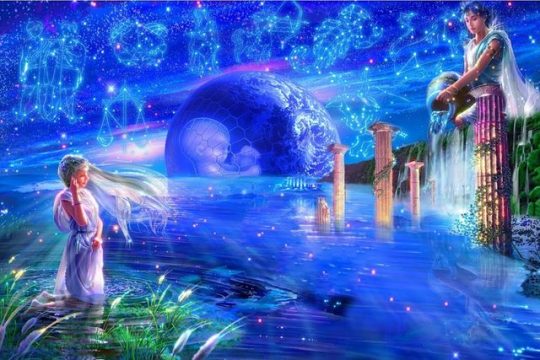
New Post has been published on https://lovehaswonangelnumbers.org/re-claiming-the-fish-saturn-and-capricorn-in-the-age-of-aquarius/
RE-CLAIMING THE FISH: SATURN AND CAPRICORN IN THE AGE OF AQUARIUS
RE-CLAIMING THE FISH: SATURN AND CAPRICORN IN THE AGE OF AQUARIUS
By Louise Edington
In Astrology, the sign of Capricorn is said to be a feminine sign, and both the sign and it’s ruler are represented by the sea-goat which is a creature of impossibility with the front half of a goat and the tail of a fish.
Over millennia of Patriarchal rule and conditioning the planet and sign has lost it’s yin qualities with the sea-goat becoming a goat alone much of the time and Saturn and Capricorn being said to represent the Father amongst other things. Saturn and Capricorn have been spoken of in Astrology as harsh, cold and unloving and this article challenges that as being a reflection of the patriarchy itself.
Saturn, the planet is named after a male deity, traditional ancient astrological technique of sect described Saturn as diurnal, which is usually seen as more masculine. And yet, Saturn and Capricorn are earth energies which is traditionally feminine.
However, the universe is essentially neutral or genderless. It’s the language of Astrology and humankind that has assigned polarity in our search for certainty. In my new book, to be published early in 2020, I invite readers and students of Astrology to, and I quote Astrologer Jason Holley here in the Mountain Astrologer who informed some of this thinking, “embrace multiplicity, non-linearity, and uncertainty” in Astrological language as we move into the Age of Aquarius and as science itself moves further into Quantum wave and entanglement theory.
I can’t go into more detail yet because of contractual obligations with the publisher but I want to talk about the sea-goat myth in terms of reclaiming that sense of multiplicity and genderless Astrology. After all, we cannot see the gender in the Astrological chart itself.
As I write this Saturn has just stationed direct at 13 ̊ 54′ Capricorn, and will retrace his Retrograde steps to 20 ̊ 31’ where he stationed Retrograde on April 29th, and is approaching another conjunction with the South Node before moving towards the transformational conjunction with Pluto on Jan 12th 2020 at 22 ̊ Capricorn and, days later, squaring dwarf planet Eris in Aries.
Additionally, both Saturn and Pluto are being occulted by the Moon, ruler of the Cancer North Node every month this year other than January and December for Saturn as November gets two occultations and January for Pluto. This means their energy is literally being eclipsed by the Moon and Eclipses are re-sets. Saturn’s own South Node is also at 18 ̊ and Pluto’s South Node at 19 ̊ Capricorn so Saturn will also be transiting over these points before meeting Pluto and squaring Eris.
Then we also receive the news that twenty more Moons of Saturn have been discovered meaning Saturn is now known to have a total of 82 Moons, flying past Jupiter’s 79. New discoveries like this always shift the energy of a planet in our collective psyche. I would suggest that this, alongside the occultations, is softening Saturn’s image in our consciousness.
The convergence of all these factors is hugely transformative and a big shift away from old rules and ideas.
It’s my belief that all these Astrological events are inviting us to re-visit and eclipse the patriarchal ways of looking at and speaking about Saturn and Capricorn. This also means that we are being invited to re-visit and eclipse the patriarchal world our perceptions and words have created. In turn, this will ripple out just as wave theory does to change our language about all of Astrology.
This wave is being reflected in the world, the universe as a whole, and is reflected in the wave glyph for the Age of Aquarius.
What of the sea-goat myth? How can we learn from that in this re-visiting?
The primary sea-goat in Greek mythology is Pricus, an immortal ruler of time created by Cronos, the God of time, son of Uranus and a Titan from the Greek mythological pantheon.
We must, of course, remember that myths are also created by man to order and explain the universe and aspects of humanity and the Greek civilization was in itself patriarchal in nature.
Pricus had children who were in his image and who were able to talk and these children were drawn to the land. However, being on the land caused them to turn into goats and lose their powers and intelligence. Pricus attempted to stop this and turned back time to bring them back but they kept returning to land. Not wanting to be a lone sea-goat, Pricus begged Cronos to let him die but Pricus was immortal so unable to die. Instead, Cronos cast Pricus into the stars as the Capricorn constellation so that the lone sea-goat could watch over all his children.
Like all myths, this is based on more ancient myths from the sands of time when myth was carried down in the oral tradition and Capricorn mythology in ancient Sumeria as associated the the God Enki, the God of water, knowledge, and creation. In Babylonian times Capricorn was described as fishtailed Ea who was the “Antelope of the Sea” and who watched over the land but lived in the ocean at night so never lost the energy of the ocean, as the more modern patriarchal sea goats did. In these ancient mythologies, Capricorn was seen as the gate of death with the opposite sign, Cancer, being the gate of birth.
It could be said that the Greek Pricus myth itself reflects the loss of, or deliberate erasure of, the night energy under the patriarchy. I use the term night for what has been spoken of as feminine, energy in our society. The patriarchy has demonized and sidelined all that is not day, outgoing, and what has been seen as masculine. The loss of powers experienced by the sea-goats as they rejected the water reflects the loss of essential powers within each of us under the patriarchal structures and language we have lived under for millennia. Though interestingly, in other myths, the goat actually suckled Zeus as a baby, and Zeus or Jupiter is the King of patriarchal pantheons moving forward as he took down the ancient God of time.
The occultations of Saturn and other aspects of Saturn in the sign of rulership are asking us to reclaim the seemingly impossible nature of the sea-goat in my opinion. We are each both goat and fish, both day and night, both land and sea. We all inhabit both realms. We each are born and die. There are no opposites and polarities even though our human need to make sense creates this separation because everything is connected in entanglement and cycles and waves.
Like the cycles of life and death, Capricorn and Cancer work in tandem, together. Like the Sea Goat, the Crab that is the symbol of Cancer, inhabits both the land and the sea though taking the Hermit crab as an example, the Crab can only survive on land if it stays moist. Both the Seat Goat and Crab lose their powers if on land for too long and if they don’t return to the water regularly.
In patriarchal times, the qualities of the night have been devalued. These are the qualities of acknowledging and validating emotional responses and feelings, the value of nurturing and supporting others, true humility and empathy. Left brain characteristics of rational, logical, factual and verbal reasoning have become over valued in relationship to the right brain qualities of creativity, emotion, intuition and imagination.
Think of the language used in our lifetime to devalue the night energies of the right brain.
‘It’s just your imagination’
‘You are irrational’
‘Control yourself’
I’m sure you get the picture.
Yet Saturn and Capricorn are night or feminine energies, though I believe Saturn as traditional ruler of Aquarius has both day and night qualities as do all the traditional planets, and the language used in Astrology for both planet and sign is that of the left brain.
Saturn is described as the Father, external authority, rules, limitations, control.
Capricorn is described as discipline, practicality, determination, leadership, controlling, responsibility.
They are all of those but our human minds have interpreted this all as very male and taken those qualities to mean dominion over others, to mean hierarchies, and to mean controlling others rather than the self.
This is a simplistic explanation to say that the night qualities of Saturn and Capricorn, or the fish tail of the sea goat, have been lost.
A higher understanding of Saturn and Capricorn is that of the wisdom of the elder or crone, near to the ancient Gate of Death and in tandem with the Cancer Gate of Birth. Both working in cyclical and circular harmony.
In the Cosmic Intelligence article written by Linea Horne on the Lunar occultations she speaks of the Circle of Grandmothers for becoming more enlightened Capricorn energy and I agree. I would take it even further as we move into the Age of Aquarius and merely call it the Circle of Wisdom.
Ancient cultures had pantheons of Gods that represented both day and night energies and that had equal value so we must move away from the binary and oppositional world of the patriarchy and return to a more inclusive and integrated language in Astrology and life.
The re-claiming of the fish tail of the impossible (I’m possible) sea-goat will aid us in that path.
When speaking of Saturn and Capricorn as a night energy Astrologers can, and many are, speak of external authority as how we allow others power of us and how the only real authority is within, rather than speaking of it as a controlling and dominating energy. After all, we can only be controlled if we allow outside forces to dominate us.
As we move into the wave energy of the Age of Aquarius, we are being asked to take a more diffuse view of both Saturn and Capricorn and to change our language as Astrologers to reflect the receptive, more malleable, and softer, elder wisdom energy they both contain. Discipline is a loving parental act if done with wisdom, for example.
If Astrological language itself re-claims the seemingly impossibility of being both night and day as we approach our work, we can help to shape the New Paradigm itself.
******
LoveHasWon.org is a Non-Profit Charity, Heartfully Associated with the “World Blessing Church Trust” for the Benefit of Mother Earth
Share Our Messages with Love and Gratitude
LOVE US @ MeWe mewe.com/join/lovehaswon
Visit Our Online Store for Higher Consciousness Products and Tools: LoveHasWon Essentials
http://lovehaswonessentials.org/
Visit Our NEW Sister Site: LoveHasWon Angel Numbers
https://lovehaswonangelnumbers.org/
Commentary from The First Contact Ground Crew 5dSpiritual Healing Team:
Feel Blocked, Drained, Fatigued, Restless, Nausea, Achy, Ready to Give Up? We Can Help! We are preparing everyone for a Full Planetary Ascension, and provide you with the tools and techniques to assist you Home Into The Light. The First Contact Ground Crew Team, Will Help to Get You Ready For Ascension which is Underway. New Spiritual Sessions have now been created for an Entire Family, including the Crystal Children; Group Family Healing & Therapy. We have just began these and they are incredible. Highly recommend for any families struggling together in these times of intense changes. Email: [email protected] for more information or to schedule an emergency spiritual session. We can Assist You into Awakening into 5d Reality, where your experience is one of Constant Joy, Wholeness of Being, Whole Health, Balanced, Happy and Abundant. Lets DO THIS! Schedule Your Session Below by following the Link! Visit: http://www.lovehaswon.org/awaken-to-5d/
Introducing our New LoveHasWon Twin Flame Spiritual Intuitive Ascension Session. Visit the link below:
https://lovehaswon.org/lovehaswon-twin-flame-spiritual-intuitive-ascension-session/
Request an Astonishing Personal Ascension Assessment Report or Astrology Reading, visit the link below for more information:
https://lovehaswon.org/lovehaswon-ascension-assessment-report
https://lovehaswon.org/lovehaswon-astrology/
Experiencing DeAscension Symptoms, Energy Blockages, Disease and more? Book a Holistic Healing Session
https://lovehaswon.org/lovehaswon-holistic-healing-session/
To read our Testimonials you can follow this link: http://www.lovehaswon.org/testimonials
Connect with MotherGod~Mother of All Creation on Skype @ mothergoddess8
Request a copy of our Book: The Tree of Life ~ Light of The Immortals Book
Order a copy of Our LoveHasWon Ascension Guide: https://lovehaswon.org/lovehaswon-ascension-guide/
**If you do not have a Paypal account, click on the button below:
If you wish to donate and receive a Tax Receipt, click the button below:
Donate with Paypal
Use Cash App with Our code and we’ll each get $5! FKMPGLH
Cash App Tag: $lovehaswon1111
Cash App
Donate with Venmo
VENMO
Support Our cause in the creation of the Crystal Schools for Children. Visit our fundraising link below:
LoveHasWon Charity for Crystal Schools
Support Our Charity in Co~Creating the New Earth Together by Helping Mother of All Creation. Visit our fundraising link below:
Support Mother Earth!
Support Us on PATREON
PATREON
Support Us Through Our LoveHasWon Wish List
LoveHasWon Wish List
We also accept Western Union and Moneygram. You may send an email to [email protected] for more information.
***If you wish to send Donations by mail or other methods, email us at [email protected] or [email protected]***
**** We Do Not Refund Donations****
MeWe ~ Youtube ~ Facebook ~ Apple News ~ Linkedin ~ Twitter ~ Tumblr ~ GAB ~ Minds ~ Google+ ~ Medium ~ StumbleUpon ~ Reddit ~ Informed Planet ~ Steemit ~ SocialClub ~ BlogLovin ~ Flipboard ~ Pinterest ~ Instagram ~ Snapchat
1 note
·
View note
Link
I decided, apropos of nothing, to put on Joss Whedon's Zack Snyder's "Justice League" while doing some work today. I discussed the movie when it came out eleventy billion years ago, and thought it was fine. It's not good, but grading on the curve of every DCEU movie up to that point, it was a solid B-. Sitting in 2021, I remember bits and pieces of it—Steppenwolf looking like he stepped out of an XBox 360 cutscene, the decent cell phone video of Superman that was marred by the terrible attempt to CGI out Cavill's moustache, all the characters sounding like their rough counterparts in "The Avengers"—but not a lot of details.
Obviously the intervening years have altered my perspective on the film, both through the revelations about the behind-the-scenes racism and abuse and through the fanatical and also frequently abusive behavior of the fans clamoring for this version of the film, which absolutely definitely existed and was finished years ago and also needed an additional $70 million dollars and reshoots to complete.
That perspective has not been altered for the better.
Against my better judgment, I'm going to watch the Snyder Cut sometime, probably this weekend, so I figured it'd be good to see how it deviates from the theatrical release, like I did for the Lester and Donner cuts of "Superman II" so very long ago. I don't expect to enjoy either one; my feelings on the superhero movies of Zack Snyder are well-documented, and even under the best circumstances, four hours is too @#%*$! long for a superhero movie. But four hours of nihilistic spite dressed up in cinematic deepities and CGI with a sepia-toned overlay is unlikely to be the best of circumstances.
Will it be better than two hours of the extremely generic re-skinned "Avengers: Age of Ultron" that got released to theaters? There's only one way to find out!
Boy, the New 52-ass character designs in the DC logo opening sure didn't age well. When was Rebirth, like, the year before?
Pretty neat that it's got Mogo and Jessica Cruz in there, though.
That cell phone scene was a lot better in my memory. Like, the kids with a podcast are kind of charming, but I remembered it being a good Superman moment, when it's really just kind of nothing. Certainly not enough to justify the extremely bad CGI. And is the negative space on the S-shield supposed to look so gray?
Gotham City looks like the background of a Robert Rodriguez movie, but I actually like it here. It feels grimy and a little uncanny, the way Gotham should. A big building with "JANUS" on it in glowing letters and big coal chimneys out of Victorian London are what I want to see in Gotham, along with copious brooding gargoyles and enormous iron statues of Greek gods that you could drive a car on.
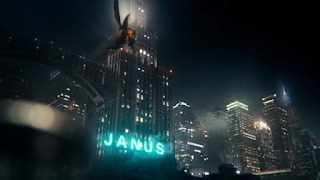
A building that is continually being robbed by either Two-Face or Maxie Zeus

"Batman Forever," for comparison
Ben Affleck's Batman rasp is at least as silly as Christian Bale's. Batman can just talk in a voice, my dudes. I watched bits of "Batman & Robin" and "Batman Forever" to track down the right screenshots, and it's so much better when Batman is a guy with a deep voice rather than a guy who sounds like he's gargling gravel and sand.
The crook asking "where does that leave us?" because Superman's dead is a little weird given that Superman was a public figure in this universe for literally a year and a half. In 2021, it's a bit like asking how we could go on if Billie Eilish died, except Billie Eilish hasn't, to my knowledge, ever been involved in a fight that leveled a major city.
The maudlin mourning sequence probably should have come before Batman backflipped over a snarling Kirby monster and "Mindhunter's" Holt McCallany hopped around on a rooftop, because I laughed out loud at the unhoused person's "I Tried" sign and I do not think that was the intended reaction.
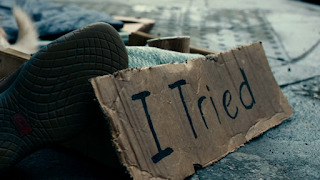
And then the Leonard Cohen cover gives way to the Danny Elfman score, and it sounds like "Batman" '89 again. God, this movie really is a mess.
I appreciate Wonder Woman explaining her powers like she's in a Chris Claremont comic. How long until we get a superhero movie with a proper reference caption? I just want to see a box in "Into the Spider-Verse 2" that says "*It happened in Spectacular Spider-Man #206, True Believers!"
I really wish superhero movies could stop having the scene where superheroes talk about how stupid superheroes are. It feels so self-conscious. Just embrace the concept without being ashamed of it, please.
I also wish we could have dialogue less on the nose than everything Henry Allen says. He talks exclusively in clichés about movement—"running in circles," "standing still," "find your own path." We get it, he's talking to the Flash.
I keep forgetting that this movie is a fetch quest. It could have worked if we'd seen more than Themyscira before. This could be like that sequence in "Avengers: Endgame" where we go on a little memory tour of the previous films, but instead it's a return to Paradise Island, our first brief, boring glimpse of Atlantis, and a nuclear plant cooling tower. This is one of the problems with setting the "let's get the team together" movie before you've met most of the team or established most of the set pieces.
The boom tube effect is pretty good. It's a shame Steppenwolf looks so much like a character from a Zemeckis film. I do appreciate that Joss had enough restraint to avoid dropping "Magic Carpet Ride" or something when he showed up.
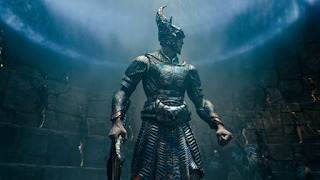
Fus roh dah!
Also, I realize the ship has largely sailed on this, but the Amazons are supposed to be an incredibly advanced society; maybe we could stop depicting them as exclusively armed with bronze-age weaponry.
You know, it's hard to see Lois Lane so...despondent? Demoralized? Even in the wake of Clark's death. Like, Lois was pretty weepy for a few issues of the comics after Superman died, but within two months she was accosting cops and breaking into Cadmus in a wetsuit and punching dudes in the teeth. Lois Lane is a stone cold badass, and the only film in this erstwhile trilogy that came close to understanding that was "Man of Steel."
The frustrating thing about the dialogue is just how obvious it is that Joss knows how to write exactly as many characters as are on the Avengers. Batman just sounds like Tony Stark, Wonder Woman banters like Black Widow until she needs to exposit like Thor, it's just so lazy.
And so is the backstory of the Mother Boxes. I actually really like the "all the races of man joined together with the gods and the Green Lanterns to repel Steppenwolf" angle, because it makes this idea of uniting as a League into a theme that you could build a movie around (that movie was "The Fellowship of the Ring"). Unfortunately, they do it by stripping the Mother Boxes of anything that made them interesting as a concept and turning Steppenwolf into a low-rent Thanos. Thanos is supposed to be a low-rent Darkseid, get it right.
I was going to rag on Bruce for comparing Flash's suit to "the space shuttle" in the present tense, when the space shuttle program ended six years before this movie came out, but I suppose Bruce Wayne is a cranky old guy in this movie, so it kind of works.
Man, poor Ray Fisher, in addition to everything else, having to read this warmed-over Bruce Banner dialogue.
Not gonna lie, hearing the Elfman Batman theme is pretty great. It's nice that Batman and Wonder Woman have really solid, recognizable motifs in the score, even if they had to reach back 30 years to find one for Batman. It's a shame the other characters don't get anything so clear and distinctive.
Casting J.K. Simmons as Commissioner Gordon was a pretty good move.
Our first full glimpse of Cyborg is a bit uncomfortable. Up until this point, we've seen him in sweats, so seeing him without clothes...it's like that bit in "Cats" where Idris Elba takes off his coat and even though he's covered in CGI, you can't help but think "okay, he's naked now," a thought you only have because he was wearing clothes before.
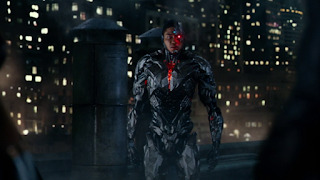
Batman does his "disappear while Gordon has his back turned" bit, and it becomes a gag because only Flash is left behind. Except that we've seen that Flash perceives things at a higher speed than others, so why would he be caught off-guard? Wouldn't their disappearance have happened in basically slow-motion to him? Why did Wonder Woman and Cyborg disappear when Batman did? How did they know to do that? The only reason Flash is left behind is for the gag, because he's the comic relief character right now, but it would make more sense for literally either of the others to be the one in that position. It feels like a "kill your darlings" moment. Like, they decided that this gag was more important than making sense, when they could easily have done a different gag—like Flash noticing that Batman was leaving and stopping him in the middle.
The Nightcrawler is a bad idea. It doesn't really make sense as the thing Batman would bring to this fight with Steppenwolf, and it's loaded up with guns, which...come on, guys. It doesn't even get a clear enough spotlight to be properly toyetic.
If you needed any confirmation that Joss saw how much better Quicksilver was in "X-Men: Days of Future Past" than in "Age of Ultron," the Flash is here in this battle to make it obvious.
God, the "Flash is awkward about being on top of Wonder Woman" gag feels like it lasts a thousand years. It's like something out of a "Big Bang Theory" episode.
It physically pained me to hear crappy Steppenwolf quoting New Gods #1.
I know there's pathos to Cyborg's character, but, like, is this really the version that they thought people wanted to see? Is this just the Brooding League? I thought a part of the reason for bumping Cyborg up to the big League was to bring in people who love the version on "Teen Titans," but there's nothing of that character here.
On the other hand, they've sidestepped the modern problem of making Barry Allen act like Wally West by instead making Barry Allen act like Bart Allen with a head injury.
I really like Bruce Wayne in a vest.

There's so many things that would have made this movie better, but honestly? I think Superman should've stayed dead. Obviously I love the character, and I even love Cavill's performance, but a movie about a superhero community coming together and being inspired by Superman's example to be better—you know, the thing Batman says at the end of "Dawn of Justice"—would have been a lot better than a movie where two characters we just met dig up Superman's grave to MacGuffin him back to life. It still wouldn't make that much sense that Superman would have such a massive impact after just a year and a half of public superheroing (come on, Snyder, if you're going to do the Christ allegory, why not give him three years?), but it would have been a better way to showcase what the character means to this universe and to these characters.
This runs into something I said way back when I first saw "Man of Steel": You shouldn't make General Zod your first-movie villain. I've been comparing this film to "Age of Ultron" a lot, but I'm starting to realize that the entire DCEU—with the possible exception of "Wonder Woman"—is made up of the second movie in each character's respective franchises. Zod should have been the villain Superman faced after he was established, to raise doubts about the character's allegiances and present him with a seemingly impossible threat. Batman should have fought Superman after a movie where we established what Batman's deal is, how he got to be so angry and bitter. The Justice League should have faced an enemy too big to fight without Superman after the movie where a threat and Superman's legacy inspired them to unite together. Heck, even "Suicide Squad" would've been better if they'd saved the "one of our own is a traitor" plot for a sequel, where we might have some emotional attachment to some of the characters.
Boy, Barry Allen attempting a fist bump with Cyborg and then laughing off the rejection with the phrase "racially charged" hits real bad in the wake of Ray Fisher's discussion about the environment on-set.
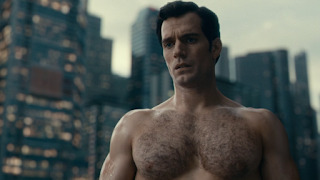
One thing to appreciate about Cavill's Superman is how much he exemplifies the hairy-chested, dimple-chinned version that Dan Jurgens draws.
And Elfman works the John Williams theme into the score. The motif works well the first time, less so the second when he's trying to kill the Flash. Hitting it in a more minor key would have been nice. Again, it's a shame they had to go literally forty years back in time to find a recognizable Superman theme when there were two Superman movies leading up to this.
This fight between Superman and the League is bad and unnecessary, but the bit where Superman reacts to Flash in super-speed is well-done, marred only by the incredibly doofy look on Flash's face.
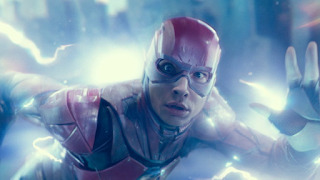
God, Cavill doing the gravel-voice, asking "Do you bleed?" might be the worst part of this movie. Although Lois Lane entering the plot for the first time in an hour so she can say "the sun's gettin' real low" to Superman is a close second. Why isn't she involved in the formation of the League? Why wasn't she a major character in this?
Batman's "something's definitely bleeding" comedy bit feels like something out of a View Askew movie, and not only because it's Ben Affleck.
Clark's discussion with Lois, "it's itchy," it's yet another jarring tone shift from what we saw immediately before. And the greenscreen work on the farm (reshoots, I expect) is somehow worse than the moustache removal.
The bit with Aquaman baring his soul because he's sitting on the Lasso of Truth is the closest one of the comedy bits in this has come to actually working for me.
And then, adding to the "Age of Ultron" comparisons, we're back to fighting an enemy in a small Eastern European nation. The red skies are a nice touch. The Batmobile's 50-caliber cannon and chainguns, less so.
Did...did the Flash just say "oh snap"?
And Aquaman saying "my man" to Cyborg with the exact same inflection as Bradley Cooper in "Get Out" is another one of those real uncomfortable moments.
And then Batman gets a laser gun, because why not?
Superman asking "how can I help" and then rushing off to save civilians is maybe the best moment for the character in the entire DCEU. It's also nice that Superman gets a moment to help more or less each character with their individual missions.
And then Wonder Woman drops the "I work with children" line, which is the best line Black Widow gets in this movie.
Cyborg gets his "booyah" moment, which feels forced but at least makes some sense with his character arc. Flash gets his fistbump. Not-Sokovia gets to be the setting for a Jeff Vandermeer novel, and the team gets their triumphant moment in the sun.

We're on to denouement, and Lois gets the closing narration, which is mostly fine. It would work better if she weren't basically a cameo in the movie. I do like that it ends on "look, up in the sky," and that Cavill finally gets a chance to do the shirt pull.
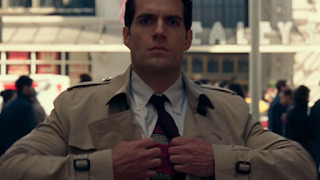
Except that's not the end. First we get the beginning-of-credits scene with the Superman/Flash race, which is cute but unnecessary. And then a truly awful cover of "Come Together" before the post-credits sequence where Lex Luthor meets up with Deathstroke and his truly ridiculous dye job.
In summary, Joss Whedon's Zack Snyder's "Justice League" is a bad movie. In fact, it's several bad movies stitched together into a shambling bad movie Frankenstein. And tomorrow I'm going to watch Zack Snyder's Zack Snyder's "Justice League: The Snyder Cut," which is getting surprisingly positive reviews. I do not expect to enjoy it, because I really don't think my problems with this movie will be fixed by making it broodier and longer, and my track record with enjoying Snyder's films is basically nonexistent. But I'm watching it, because I'm a glutton for punishment, and at least if I do it while I'm still on vacation from Twitter, I won't be tempted to join in the undoubtedly toxic discourse.
1 note
·
View note
Text
Bette and Joan: My show of the year

I’ve very much struggled with Ryan Murphy for as long as others have lauded him. I’ve also struggled to articulate why I’ve loathed his output, as on paper, his work has all the criteria of a blockbuster *Cheryl Cole voice* right up my street.
This article is a solid articulation of those feelings, which can be distilled down to Murphy’s total lack of restraint when combining his incredible imagination with celebrated, iconic actresses falling at his feet and an apparently endless studio freedom to seamlessly translate his vision to the screen. Murphy can do whatever he wants, with whatever resources he has, under a total lack of restriction. This was his downfall, in my opinion, and the major roadblock to me giving myself up to his work and just enjoying it. By season four of American Horror Story, I couldn’t bear to watch another program which so obviously began with great intentions and fantastic ideas, only to unravel in a creative catastrophe with no planned storyline arc or conclusion on the horizon.
With Feud, Murphy kept his iconic actresses, the studio freedom and yes, the incredible imagination, but found himself restricted by history. The show is not averse to creative license - and thankfully, it’s only of benefit when used - but with biographies, photographs, testimonies and video clips at our fingertips, the show had to, on the whole, stick to what happened. It also had a storyline, a spectacular arc of highs and lows, emotion and pathos, ready and waiting to be told.

Prior to watching the show, I knew next to nothing of Bette Davis and Joan Crawford. I knew they were icons, I knew they were ‘old Hollywood’, and I knew they loathed each other. One of them was in the “Vogue” rap (we love you). I had tried watching Whatever Happened to Baby Jane? years ago, but lacked the patience to finish. I decided to give Murphy one last chance, not least because of the star cast he manages to draw: Jessica Lange, who became one of my firm favourites following Grey Gardens; Susan Sarandon, who I’ve cherished since Stepmom but have struggled with following last year’s US election; one of my all-time favourites, Kathy Bates, who carries one of my top five films ever, Dolores Claiborne; my Australian queen, Judy Davis; Catherine Zeta-Jones returning to form and schooling the children (myself included) on the divine Oliva de Havilland; and it wouldn’t be Murphy without Sarah Paulson in a star cameo.

Murphy has spoken at length of his past, enviable, encounter with Bette Davis - the two sat together in 1989 for hours, during which Davis made catty but sorrowful comments at Crawford’s expense and planted the seed for Murphy’s tale of tragedy - but I would make the case that Feud is about Joan Crawford, and is her story to be told. After all, Bette ‘won’ - she outlived Joan, and will always have the reputation of one of Hollywood’s most talented actresses, an accolade only given to Joan through decades of hindsight. Jessica Lange’s portrayal of a tough, embattled but painfully insecure queen who just wants to be loved and respected, is to me, the crux, the peak, the apex of the age-old “why do gay men worship gay icons?”. We see the weaknesses in our icons, the chinks in their armour that they’ve worked so hard to conceal, and which are revealed in the bitterness and jealousy that sometimes seeps out. We see the longing to be worshipped, to feel wanted, to be adored. Even for a generation of gay men who have prospered with a mere hint of the adversities our gay uncles and older have faced, we can still tap into that feeling.
In essence, Feud is the tale of two women with more similarities than they could acknowledge, both making attempts at separate times to work together for their mutual benefit but thwarted by third parties who seek to, and indeed did, profit from their mutual hatred. It’s a tale of all ages: Two women who are stronger together, who are titans in arms... but what fun is that? We’ve seen this more times than is entertaining to mention, not least with the “Express Yourself/Born this Way” debacle of 2012. And most of us, if not all, have been guilty with inciting it ourselves.
But beyond that, the show is a depiction of the Hollywood that never was, and the Hollywood that always will be. A golden age, or perhaps, the aftermath of a golden age. Twilight for two brilliant women who still had so much to give, but no one really cared about anymore. Women who were forced to be people they weren’t, for validation. Strong women, who wanted to change the world. One of the greatest characters is one of the only fictional ones, the aspiring producer/director/writer Pauline, who represents the modern woman, and indeed viewer. The show is almost told through her eyes, frustrations and observances.

I’ve just finished watching the show for the second time this year, and there are two particularly affecting episodes. The first is set on the infamous Oscars night, following a petty campaign by Joan to ensure Bette wouldn’t win her third Oscar, a campaign made all the more self-harming due to both women receiving a cut of Baby Jane’s profits, which would’ve ballooned following an Oscar win. The episode is the finest example of the show’s multiple achievements: jaw-dropping attention to historical detail through costuming, sets and of course, events; superb cinematography - the single shot of Joan circling the theatre, the actual theatre which hosted the actual Oscars in 1963 nonetheless, is decadent in the work it would’ve taken to set up; and the heartbreaking vulnerability of both formidable characters. Joan, when warned by her director pal George Cukor, that she’s “better” than thwarting Bette, only to respond with a stomach-wrenching “No, I’m not”. Bette, when opening up to admitting how terribly she wanted the Oscar, only to watch her co-star and would-be friend and ally, walk past her onto the stage to collect it on behalf of Anne Bancroft. Masterful.
The second, and possibly season’s best, is the final episode. In real life, Bette and Joan never reconciled, but the viewer needs something, some kind of emotional closure, to complete the journey we’ve been taken on. This was the moment my respect for Murphy flooded back, as he tackled the dilemma perfectly. He gave us what (probably) happened: Bette, informed of Joan’s cancer, picks up the phone only to hear Joan’s fragile voice and slams the phone back down, confronted by her own mortality and suffocated by her pride. Touching but not satisfying enough, he then gives us what we need: one of the finest fantasy sequences committed to the small screen, a dinner party with the show’s two antagonists - the tragic Hedda Hopper, a cockroach to make Perez Hilton look like a Red Cross landmine volunteer but herself, I would say, a victim of the system, and the awful Jack Warner - sitting between Joan and Bette. A chance for Joan and Bette to admit their regrets and foolishness, and to acknowledge that they could’ve been friends. The truly heartbreaking moment is when Joan, perhaps realising how little time they have left, desperately scrambles to start fresh with Bette, to give it one last chance, while Bette says nothing, her eyes filled with tears, with her understanding that it’s just too late.

A totally fictional scene, as far as we know, but a requirement in the telling of this tale. Tragedy and melancholy, the mourning of loss and what could’ve been, are emotions we all know, and to see it played out on this epic backdrop of talent, we needed that conclusion. If anything, the learning has to be that life really is too short to work against people who make us stronger and live bigger when we’re together. The sensation of pondering what could’ve been is one of the saddest emotions of all, so knowing that it’s up to us to eliminate that possibility as much as we can.
The show is a masterpiece of writing, directing, acting, production, set and costume design, and a story worth telling. Top work to Ryan Murphy for bringing the story to new audiences, and giving the opportunity to two middle-aged superstars to portray two middle-aged superstars who didn’t have their own opportunities.

Further readings: Vanity Fair is a fascinating resource with plenty of articles on “Did this really happen?” (mostly, and shockingly, it did), while YouTube is also chocker with comparison clips which show the detail and lengths that the production went to for realism and accuracy.
3 notes
·
View notes
Text
Sinners all? Geldauron to Hakkon
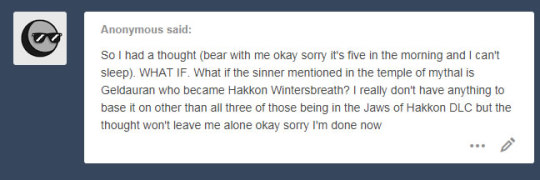
Hey Nony,
Don’t be done or sorry! I know what you mean about not being able to sleep and it’s being 5am, and you have DA ideas that just have to be written down just in case they turn into something. And you do raise a very interesting possibility. Is there a connection between the Sinner, Geldauran, and Hakkon? Looking into your question brought several things to light I would not have noticed if you hadn’t asked. So thanks!

There’s a lot of weird shit going on in the Frostback Basin, not least of which is (what appears to be) a firsthand quote from one of the Forgotten Ones. Is it possible there is a connection between this powerful “dark god” from the elven pantheon and the later rise of Hakkon? It sure looks that way!
Here’s the quick summary:
*Geldauran is sealed away in the elven ‘temple’ in the Frostback Basin, a Creator-forsaken land (to the ancient elvhen at least) with almost no edifices or monuments to the elven gods. That tomb is sealed with spirit stones that are almost impossible to see, let alone find, once the Veil is place. Those stones are scattered across the valley to prevent them from being reassembled easily, and the prison/temple itself was buried beneath the earth.
“Their pride will consume them, and I, forgotten, will claim power of my own, apart from them until I strike in mastery.” (Geldauran’s Claim)
*Some time later (possibly as early as 3200 years before present) the Avvar enter the region. The Avvar live with the spirits of the region, shaping them into their pantheon of gods. They communicate with one “spirit” or entity in a very curious way:
“The savages speak to their gods in the cave passage. They call it the Mouth of Echoes. They light fires and feed them with green spruce and shout their questions into the deep. They say answers come to them on the last whispered echo.” (Mouth of Echoes)
*Tevinter mages, searching for a way to communicate with Razikale, arrive in the Frostback Basin in the time gap between the Corypheus and the Magisters Sidereal entering the Black City and the foundation of the Orlesian Chantry. They believe that the Avvar may have special knowledge about communicating with spirits. These followers of Razikale reshape the land and expose the buried elven temple, but whatever was inside (Geldauran) was beyond their ability to control or dangerous in some way. They construct an elaborate system of magical beams, crossing the Basin from Razikale’s Reach to the Old Temple, to seal that spirit in an even more powerful ice ward prison.
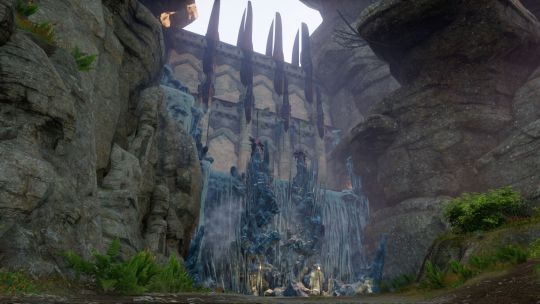
They then abandon the region.
“Some of the Avvar, he said, believed the temple to be the haunt of old, vengeful spirits. The Tevinter had come here long ago and built their great temples and then one day, without warning, they had abandoned them all. Ragnarr was convinced they had done something terrible here, though he could not tell me what it was.” (Razikale’s Reach)
*Tevinter’s efforts to seal away what they found in the elven temple were not successful. Within a few hundred years at most, the original Jaws of Hakkon learned to enter the the Old Tevinter Temple. In the early Divine Age, they emerge with “Hakkon” bound to a dragon.
“In the old times, the first Jaws of Hakkon spoke with the great spirit himself. He opened their eyes that they might see the elfstones hidden across the world, and they entered the old cave and learned the mysteries of winter. Their working of cold let them slip through the ice-wall that wards the lowlander fortress, and we must now do the same if we are to take it as our own.
Hakkon has been silent all our lives. He cannot speak to us in dreams or open our eyes, and we remain blind to the elfstones. The lowlanders, though, have found a new way to see them. The skull of a dream-slain, set with the right magicks, can bring the elfstones to our sight.
We will regain the mystery of winter.” (Leather-Bound Hakkonite Journal)
*Ameridan travels to the Frostback Basin to stop Hakkon, but miscalculations on Ameridan’s part and the power of Hakkon himself is more than the Inquisitor and his companions can overcome. The last Inquisitor traps Hakkon with time magic until the modern Inquisitor sets both free.
“The dragon's power is like none I have ever seen. Possessed by this Avvar god-spirit, it rivals the legendary Archdemon Dumat in its fury. I pray the legends of another Archdemon leading the Blight in the Anderfels are just foolish stories, but if they are true, then I understand why Emperor Drakon asked me to come here. Drakon's new "Orlais" cannot face two god-dragons at once.” (Pages near an Old Campfire)
*Time magic wards (which I would really like to know how Ameridan knew how to do) and 800 years later, the modern Inquisitor finishes the job Ameridan started, finally killing Hakkon.
The chain of events certainly seems to lead back to the Geldauran inscription in the elven temple.
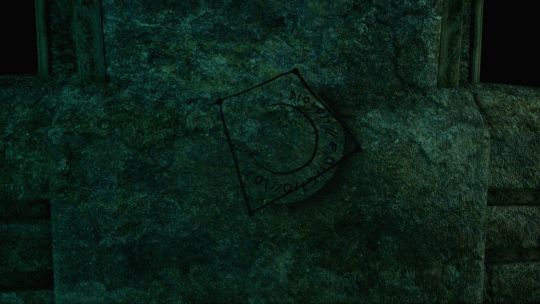
Proving a connection to the Sinner, however, is nigh impossible at this point. We just don’t have enough information about who the Sinner was, what exactly he did, and what happened to him. If the Sinner took the form of a dragon, like most of us meta writers assume, he could have shown the elven people that the Evanuris were not the only ones who could take the form of the “divine”. He would have been punished for such an act, perhaps being sealed in a temple/tomb bound in body and spirits, but there is no way to say for certain.
All the same, I think all of these individuals and groups are connected through the Evanuris. Is the Sinner an important player in all of these events? Very likely. The ominous tenor of the codex entry certainly makes it seem like a turning point, but we won’t know for what until at least DA4.
Thanks for the ask, Nony! I found a lot of things I wasn’t expecting, which makes this result all the more satisfying.
-MM
PS: There is a lot more to this meta than the summary. For a more in depth analysis of the evidence that led to this summary, and a lot of other cool discoveries, check out the long version of this post under the cut.
Geldauran seems to be the lynchpin here. We have more information about him and the other the Forgotten Ones than we have about Hakkon or the Sinner, but even that information is limited. We know the Forgotten Ones are portrayed as enemies of the Elvhenan in Dalish legends. But what are they really? Elves? Spirits? Titans?!?
Let’s go to the source and see what we can figure out:
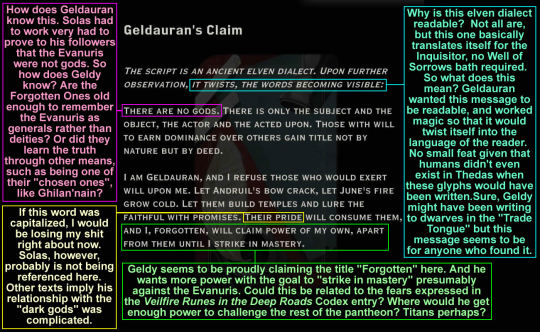
Geldauran wanted his message to be clear to anyone who came across it. And the first thing he wants them to know: “There are no gods.” Geldy knows the truth about the Evanuris. He refuses to bow to the elven gods, and he believes that, in time, he will claim power enough to strike (at them? at the elves?). So far, that is matching up pretty well with what we know about the Forgotten Ones, with one exception. According to Dalish legends, Geldauran, Daern'thal, Anaris, and the other Forgotten Ones were afforded “god” status by the elves.
The legend says that before the fall of Arlathan, the gods we know and revere fought an endless war with others of their kind. There is not a hahren among us who remembers these others: Only in dreams do we hear whispered the names of Geldauran and Daern'thal and Anaris, for they are the Forgotten Ones, the gods of terror and malice, spite and pestilence. In ancient times, only Fen'Harel could walk without fear among both our gods and the Forgotten Ones, for although he is kin to the gods of the People, the Forgotten Ones knew of his cunning ways, and saw him as one of their own.
And that is how Fen'Harel tricked them. Our gods saw him as a brother, and they trusted him when he said that they must keep to the heavens while he arranged a truce. And the Forgotten Ones trusted him also when he said he would arrange for the defeat of our gods, if only the Forgotten Ones would return to the abyss for a time. They trusted Fen'Harel, and they were all of them betrayed. And Fen'Harel sealed them away so they could never again walk among the People.
—From The Tale of Fen'Harel's Triumph, as told by Gisharel, Keeper of the Ralaferin clan of the Dalish elves (Emphasis added.)
So what do we have here? First of all, the fact that the Dalish after thousands of years still remember the Forgotten Ones as gods in spite of Geldauran’s claim that “there are no gods”. This feels like post-Veil propaganda that seeks to cast aspersions on Solas, but also claims that Geldy and co. were gods like the Evanuris. Think about what that means for a moment. The Forgotten Ones were so powerful that the elves had to say they were also gods in order to keep the Evanuris on their pedestal.
And doesn’t it sound like the Forgotten Ones were elves? Really powerful elves, like the Evanuris, but elves all the same. So what made them dark and terrible? And notice that something in the Fade whispered to the elves post Veil that these Forgotten Ones were really evil. Who do we know who are stuck in the Fade? Spirits obviously, but the Evanuris too. The elven gods trapped in the Fade seem to have thought it was worth their time to keep up the pretense that the Forgotten Ones were gods. Why? ¯\_(ツ)_/¯
Kidding. I do have a theory. It is probably because the Evanuris thought that they would be able to escape Solas’ trap fairly easily (at least at first) and believed that the Forgotten Ones would too. Keeping fear of them alive would keep their worshipers from seeking out these other “gods” in their absence. And on that count, they seem to have been right, with an exception of those Dalish near Serault in the Tirashan Forest who seem pretty scary and worship the Forgotten Ones. I suspect these elves will get screen time in the next game.
Next step: Where and how were the Forgotten Ones imprisoned?
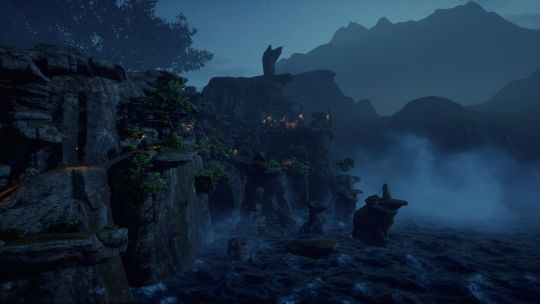
The Geldauran codex is inside an ancient temple that is very familiar. One of the things that stood out to me when I first played the Jaws of Hakkon was the lack of elven sites and artifacts in the Frostback Basin. There is a statue of Falon’Din above Stone-Bear Hold and that’s about it. Well, except for a temple, which is a scaled down version of the Temple of Solasan in the Forbidden Oasis. These ruins show that there was an ancient elven presence in the area, but limited and likely for a specific purpose. If the Temple of Solasan is any indication, that purpose may not have been to worship the elven gods or as a place to enter uthenera. Instead, they may have been used as a prisons.
The Forbidden Oasis is the next piece of the puzzle.
youtube
There are codex entries that indicate that the temple is elven in origin and very ancient, but there is little to indicate that there was anything significant in the area, unlike the Temples of Mythal or Dirthamen. In fact, the whole construction technique with Solasan and the Frostback Basin site (let’s call it the Frosty Temple, to make things simpler) is different. These structures were built into the earth, and may have at one time been completely buried, given the stratigraphy of the land around them and erosion from the nearby rivers. And notice...no eluvians in either site. Once you were in, there was no coming out..at least until time and erosion, perhaps with magical help, exposed the “temples” once again.

Another sign that these two sites may have been used as prisons is found on the stele in the innermost sanctum of the Solasan Temple. It reads:
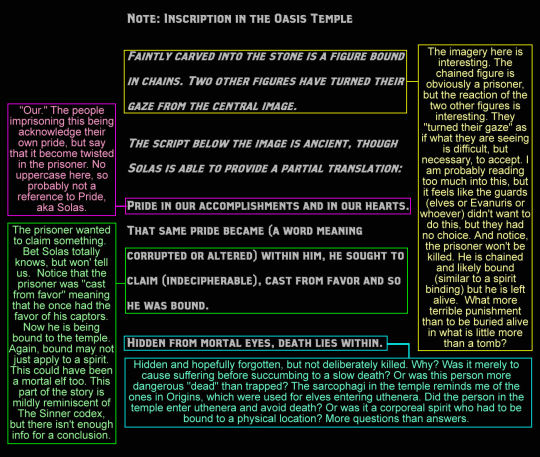
Also, as shown in the video above, the entrance of the Solasan temple had a warding spell on it that frightens mortals and spirits, another line of defense to prevent the door from being opened. The stele at the entrance of Solasan reinforces this feeling with a warning, telling people to stay away:
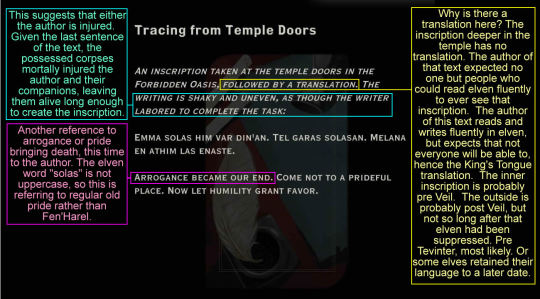
There are other warning signs as well, including the statue that greets people entering the Oasis with a severed head. People that stay in the area too long eventually go mad (1, 2, 3), either from the wards, from whatever is in the temple, or from strange “warping” of the Veil in the area. Didot, the miner featured in the three codex entries, however, is compelled to return to the door over and over again. There are probably two different and opposing magical compulsions going on in the Oasis; something inside the temple wants out but the wards push people away. Stay too long and insanity is the result. While you are in the temple or the oasis, Solas makes several interesting observations about the temple and the Veil there. He says:
(Forbidden Oasis) The Veil is strange here... as if it were reinforced, but for a few places where it has been warped.
Yeah, Solas. We saw your damned elven Veil artifact in the temple. Turned it on too. Sigh. Clearly, Fen’Harel’s agents were in the temple before. A good question would be what were they there for? Were they just putting the hardware in place to create the Veil? Were they responsible for imprisoning the individual shown on the stele in the inner chamber? Were they staging a jailbreak? Were they after the powers gained from opening the various chambers? Hard to say, other than the Forgotten Ones seem to hate Fen’Harel, in spite of codex entries to the contrary. Felassan is as close to a first hand source, and he says that Anaris wanted to kill the Dread Wolf “for crimes against the Forgotten Ones”. So whatever Solas’ agents were doing in Solasan, he definitely knows more about the temple than he says (as usual). Later, when the Inquisitor opens a sarcophagus inside the tombs, he says:
Solas: The magic was drawn to you, possibly because of your mark. The effects were purely benign.
Inquisitor: If it wasn’t a trap, what was it?
Solas: It may be a reward for those who prove themselves worthy.
What kind of a person sets up a warding system that will drive people in the area to madness and death if they get too close to the temple, then rewards them after they fight off the possessed corpses with magic that may only be attracted to you because of a very specific type of magic only currently known to be used by the Inquisitor, and previously contained in the Orb of Fen’Harel? Seems fishy, but I don’t have time to follow up that the thoughts I am having about that here.
The next part of the mystery explains why the Solasan and Frosty temples remained sealed and hidden away for so long, and also how they were eventually found again. Let’s talk about spirit stones and oculara, people.
In the Hissing Wastes the Inquisitor finds a diary with some background on the spirit stones:

So spirits can see or feel the stones, they have been there for ages, likely since the Veil was created, and the Breach may have made it possible, or easier, to find them, at least according to a codex entry from the Hinterlands. More information about the shards is found in the Frostback Basin, including a sequence of event that seem to be the key to the Mystery of Winter.
The Avvar had lived in the Frostback Basin region for thousands years, communicating with spirits who they shaped to become their gods. Then Tevinter shows up:
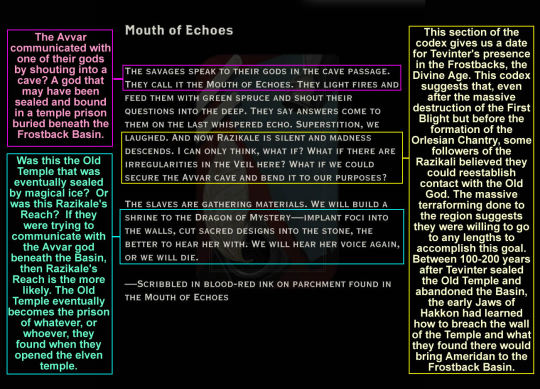
Tevinter went to massive efforts to uncover the ancient elven temple, at least if Helsdim Rolfsen isn’t a total nut bag. (He’s definitely has a problem with over complicating a story, which I can totally relate to ^_^, but the initial observations that lead him to his outrageous conspiracy theories are usually sound.):
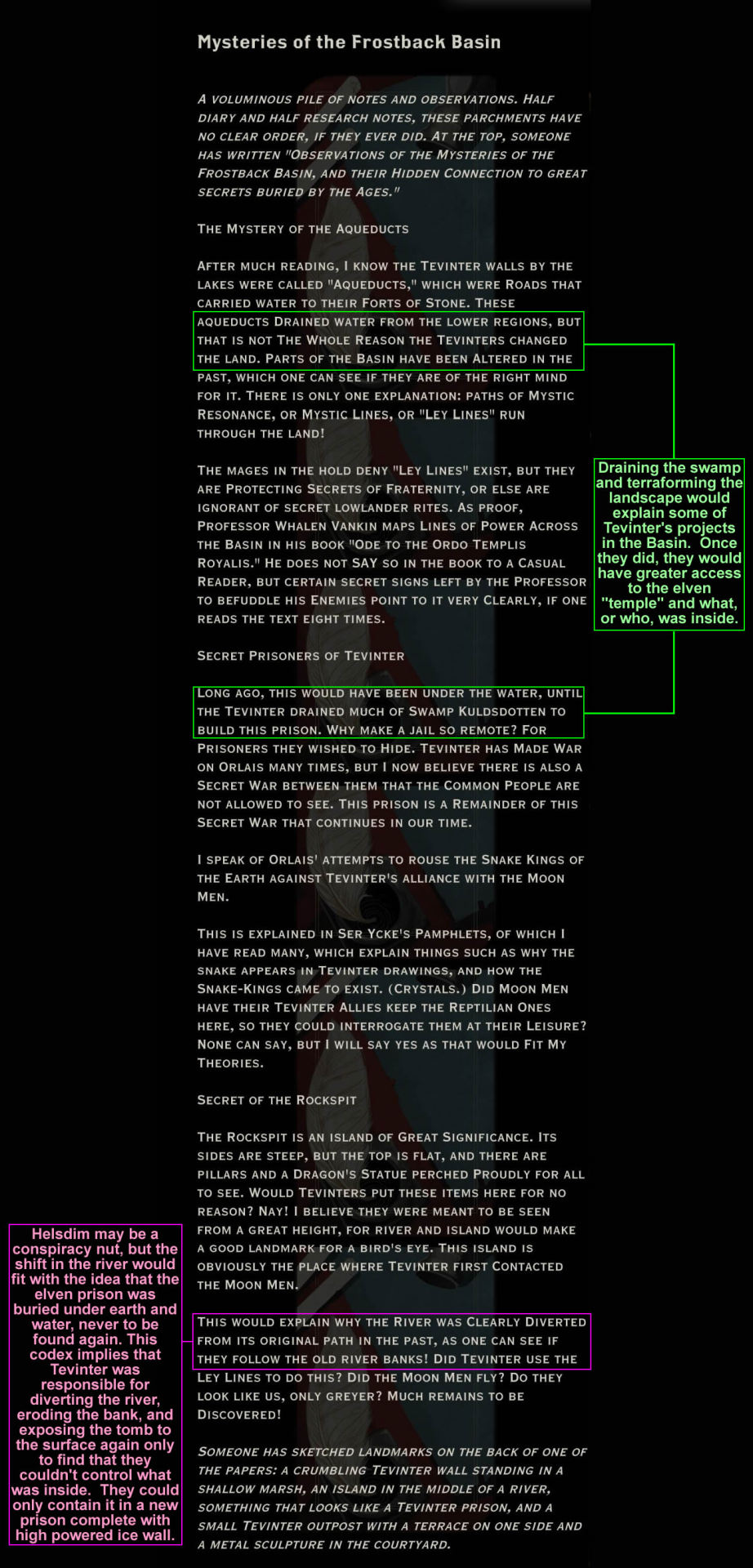
Whatever Razikale’s followers found in the temple, it’s pretty clear that it scared the shit out of them. They construct a complicated magical ice machine that sealed the Old Temple and then they abandon the region.
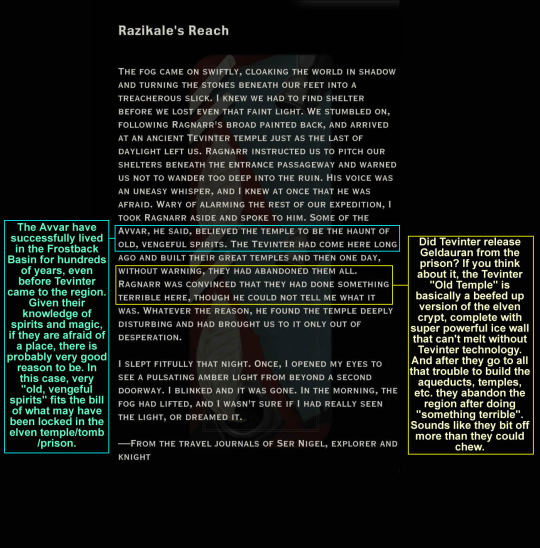
Tevinter, however, underestimated how powerful the being/spirit/whatever in the elven temple was, and how strong Avvar magic is, especially concerning their connections to spirits. After the Imperium abandoned the basin, the original Jaws of Hakkon took up the challenge of “taming” what was in the Old Temple.

All of these codices create a complete chain of custody, from the ancient elves to the modern Hakkonites. Ameridan, himself, gives us the final piece of the puzzle.
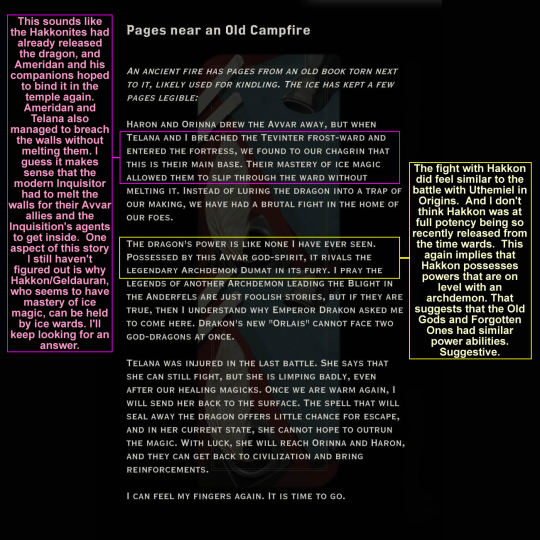
Ameridan compares Hakkon’s power to Dumat’s, the archdemon who lead the darkspawn in the nearly 200 year long First Blight. Whether or not the Old Gods are the Evanuris (I typically think they are probably not, but if any of us could prove it one way or the other, we all would have a lot less meta to write. ^_^ ) Hakkon’s power is beyond that of a normal spirit, implying that he is extraordinary. But was he truly a spirit/demon? We have instances of elves dropping their bodies in order to seal themselves in spirit crystals, and elves basically become spirits while they are in uthenera. It is even possible that Geldauran lost his memory of who he was during the ages he was in captivity, as happened with the arcane warrior elf in the spirit crystal.
But I digress, and could write a whole different post about whether the Forgotten Ones were spirits or elves, and I probably will some day. But today is not that day. Any of you who are still reading have been very patient, so let’s wrap this up.
Whether Geldauran was a spirit or an elf, the Avvar communicated their belief that he was their god Hakkon, and Geldauran seems to have come to believe it himself. He rises from the Old Temple to challenge the modern Inquisitor to single combat and the dragon is killed.
So there you have it, Nony. Not crazy at all. There is very compelling evidence that Hakkon is actually Geldauran. Now whether Geldauran is the Sinner...well, like I said in the summary, there just isn’t enough information about the Sinner to draw from. Is it possible the Sinner was related to the Forgotten Ones? Sure. Clearly, there was some drama going down in the pantheon when the Sinner took the dragon form of the divine, but what it all means is pure speculation at this point. There is so much dragon imagery associated with Hakkon, Geldauran, and the Sinner, that it is possible they are all related or even the same being, but they may also just be pieces in a bigger puzzle.
And, I suspect, that story will explain many of the mysteries of the Dragon Age.
Thanks for reading!
-MM
#dragon age#dragon age inquisition#dragon age jaws of hakkon#dragon age elves#elvhenan#evanuris#the forgotten ones#solasan#frostback basin#avvar#dragon age ancient humans#ancient tevinter#dragon age spirits#hakkon#geldauran#dragon age meta#dragon age theories#wend the wyrds a wondering#morta's musings#long post
80 notes
·
View notes
Text
Greek Myth In Contemporary Society
For years I have been liking Rick Riordan (Rick)’s works, it seemed like I have not written a review on it yet. So, here’s one on my favorite book series of all time.
HOW AND WHEN DID I START ON THIS SERIES?
It all started during my first year of high school, when I had a fixation on Greek Mythology. I admired the humanized personality of different gods, the adventures of heroes with their tragic end, and the inconsistent romance (either a happy or a miserable end). The passion led me to discover the first series of the Chronicles, Percy Jackson and the Olympians (PJO). I think I borrowed the first two books from the school library and bought the rest from the bookstore. I pretty much spend most of my time reading these novels forth and back.
Then it came the Heroes of Olympus (HOO) series, which Rick introduced Roman Mythology. With a set of new characters and old friends, I was even more absorbed into the series throughout my high-school years. I waited anxiously whenever a new installment was published, and was really content when I got to know the continuation of their adventure (which the author is a troll for cliffhangers, just like how they do for Attack on Titan Season 2). The Blood of Olympus (BOO) was published during my fourth year, which the moment I read it I had a mixed feeling of joy and sorrow. The ending was extremely shocking, from Leo’s plotted death to his revival (He’s the Percy Jackson’s Jesus), I nearly wanted to punch the author. But then, Rick created many mysteries inside the book itself. For example, Apollo’s punishment, the prophecy Ella recited, Nico and Will’s relationship, and Leo and Calypso’s whereabouts. These unexplained mysteries just made me go ‘What the hell’ at the end of the book. There were conspiracies that Rick would make a new series, with all these hints. Yet I fulfill all my needs through fanfictions, seeing what people predicted the future ‘book’ will happened.
Good news rained down on me in my last year of high school. During his tour for Magnus Chase series in 2015, he announced his new Greek Myth series, Trials of Apollo (TOA). The Hidden Oracle (THO) came out when I was studying my A-Levels, I went to the bookstore on the day when it was published. Since shipping required an amount of time, I was informed that the book will arrived one week later. Eventually, I waited patiently, and finally I received it. The book was still amazing as ever, with a God as the narrator and the main character. The other main character, the daughter of Demeter (which I predicted accurately) who can perform badass sword-fighting at the age of 12, sometime out of the ordinary Demeter child people would imagine.
During my A-Levels period, my taste has turned to Victorian classics. Besides, I have started on anime. Thus, my need for the series had lessen. Even I bought the Dark Prophecy (TDP) months ago, I managed to finish it. However, this does not stop me from loving the author’s style of writing and sense of humor.
(Additional note: I have finished TDP on Percy’s birthday.)

(picture of the troll)
WHAT IT’S ALL ABOUT?
After pouring all my love for the chronicles, so what are the series all about? Americanized Greek Mythology in the modern world. These demigods live in training camp named Camp Half-Blood (another word for demigod) during summer or for the entire year so they can prepare themselves for the dangerous outside world full of monsters. Since it has 3 different plots for each series, I need to introduce them in detail separately.
Percy Jackson and the Olympians (2005-2009)
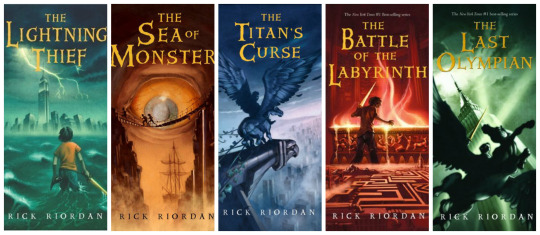
The gateway to the demigod universe. It started off with the Lightning Thief (TLT), through first-point of view of our beloved hero, Percy Jackson. He discovers himself as the remaining demigod son of Poseidon, the Greek god of sea. Due to a great prophecy predicted one of the Big Three (Zeus, Poseidon and Hades) children will bring to the fall of Olympus, his presence was a threat to the Gods. He was also set to vanquish Kronos, King of Titans who is under the aid of another demigod, Luke Castellan.
The five books of the series described his journey to be a living legend, with an amount of betrayals, deaths of his trusted partners, slight romance and awesome fighting scenes. His humorous jokes and comments presented Rick’s unique style of writing, giving the readers memorable images.
The final book, The Last Olympian (TLOl), is the greatest among them all. brings up another prophecy which is the key to the next installment. No matter how much Luke is a villain, his devastating childhood stories and his anger towards the Greek Gods made the readers understand his resentment and yearning for a familiar love. Besides, it also revealed another prophecy, which is the key to the next series.
Heroes of Olympus (2010-2014)

The sequel of the previous series, narrating seven demigods on a quest to defeat an ancient deity in the ancient grounds of Greece and Rome. They meet challenges from the worst monsters, mortals and deities, sailing to stop the wrath of Gaea, the Earth goddess.
This series, is my favorite series among the three. It does not focus on a main character, or written in 1st person point of view. Instead, we got a third person omniscient from 9 different people, who are the seven main demigods (with Nico and Reyna in the last book). We do not get our beloved son of Poseidon in the first book, but we were given a new set of characters with different background. We also discover the Roman Version of Camp Half -Blood, Camp Jupiter, a rigid military-like camp full of Roman demigods and their descendants. The series narrated two parallel sides of the Greco-Roman Mythology working together against a common enemy.
Unlike the previous series, this brought up many backstories of characters even more tragic than Percy’s. The narration was still amusing, yet there’s a sense of seriousness inside. There was an obvious character development when the series goes on. For example, Piper McLean, who refuses to recognize herself as the daughter of Aphrodite, later accepts her identity and able to use her own inherited powers. Frank Zhang, an insecure demigod with a bad reputation, turned into a confident Roman praetor.
The thing I would like to complain about is the final fight scene in BOO. It was a few pages long with Piper, Jason and Leo putting Gaea back to her slumber. It was not as majestic as people expected it would be. It could be as fantastic as TLOl!
Trials of Apollo (2016-?)

The latest sequel for the previous series, which feature the sun god Apollo as a powerless mortal, finding his way to gain back immortality. Rick had converted back to the first-person point of view style, with the sun god as the narrator. His choice of narrator gives us an insight to a deity’s mind and opinions, how he sees the world compared to how mortals, having an ephemeral life, perception on their life. It’s a philosophical matter which discuss about life and death, and living an eternal life.
In THO, readers could see the improvement on Apollo’s personality. From the arrogant and narcissistic god who cannot accept on his ‘ugly’ condition, finally learns how to be humble and trying to see the world as how mortals would. We also witness the psychological abuse of Nero on Meg McCaffery. Letting her believe her abuser is another person from her adoptive father, but what she does not know Nero and the ‘Beast’ are the same person.
The second book, TDP, probably is my least favorite of the series. There was not much Leo-Calypso endearing moments that I expected it should be. The first half of the book narrating Apollo doing various pet tasks, and remembering his ex-lover, Emperor Commodus. However, I am pleased that Rick put a lesbian couple in the story, which I had no idea that even same-sex relationship is prohibited as well for the Huntress of Artemis. There are old friends from the previous books, which I am delighted to see again.
The third book, The Burning Maze (TBM) will be released next year.
Companion books
As much as the companion books are light and consisted with short stories, I explored the little things that were never mentioned in the main series. Besides fillers, there were information on the demigod world, giving readers a clearer sight of the Greek Mythology and Percy’s world.
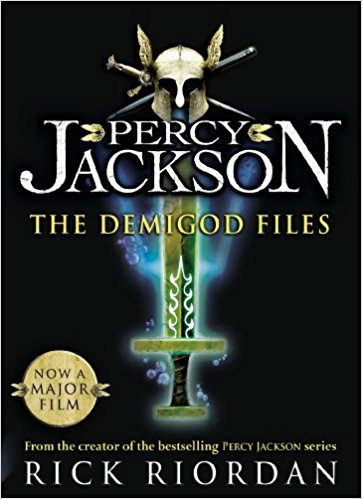
The Demigod Files (TDF), narrates how Percy assisted Clarisse on her Ares rite of passage; the discover of the bronze dragon (which later Leo named him Festus); and the children of the Big Three Gods finding the newly forged weapon of Hades (Gods do like causing unnecessary trouble and giving quests to their half-blood offspring).
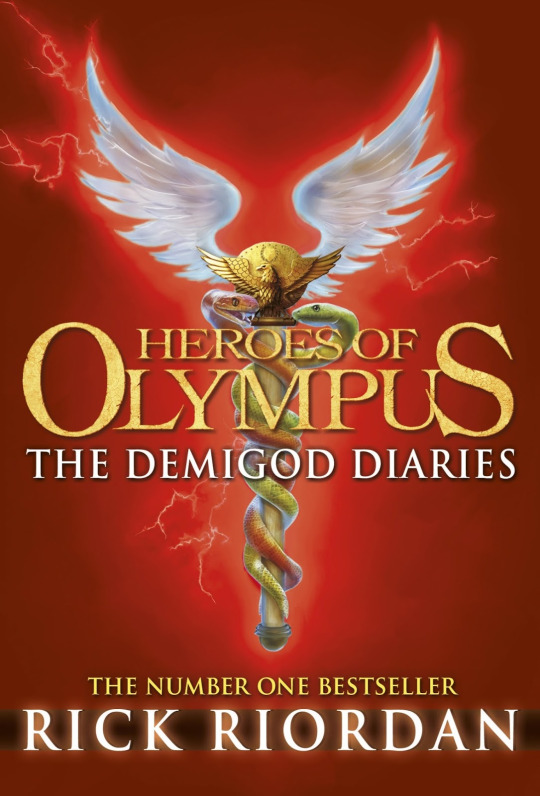
The Demigod Diaries (TDD), explains the adventure of Luke and Thalia in a trapped mansion, finding Annabeth on their way; the task given by Hermes during Percy-Annabeth’s one-month anniversary date; Leo and his friends’ encounter with the drunken followers of Dionysus; and an extra story written by Rick’s son, with impressive writing style for someone diagnosed with dyslexic and ADHD.
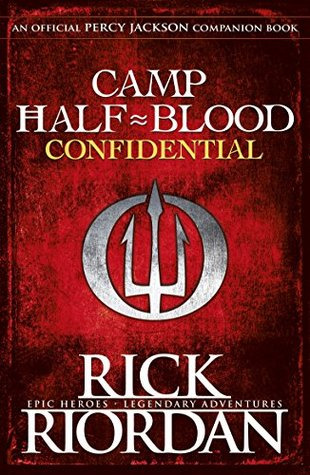
Camp Half-Blood confidential (CHBC) is a collaborated guide ‘made’ by the campers, due to the horrible orientation film directed by Apollo. Poor Nico is the only one who suffered from the film and accidentally humiliates himself in public.
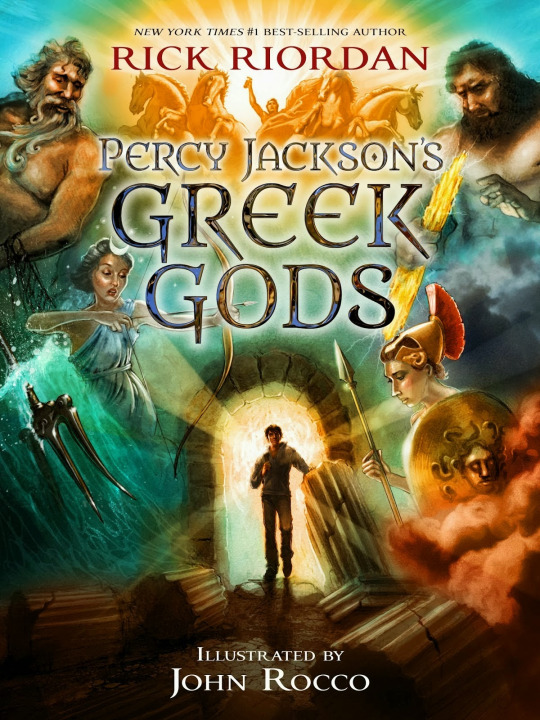
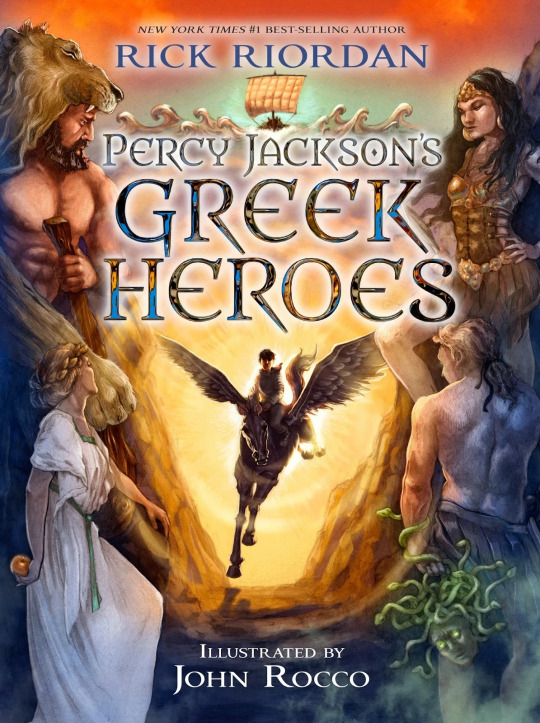
Percy Jackson’s guide to Greek Gods and Greek Heroes are separate two books as a guide introducing to Greek Gods and Heroes. People could actually score Greek Mythology with these two non-boring lecture books.
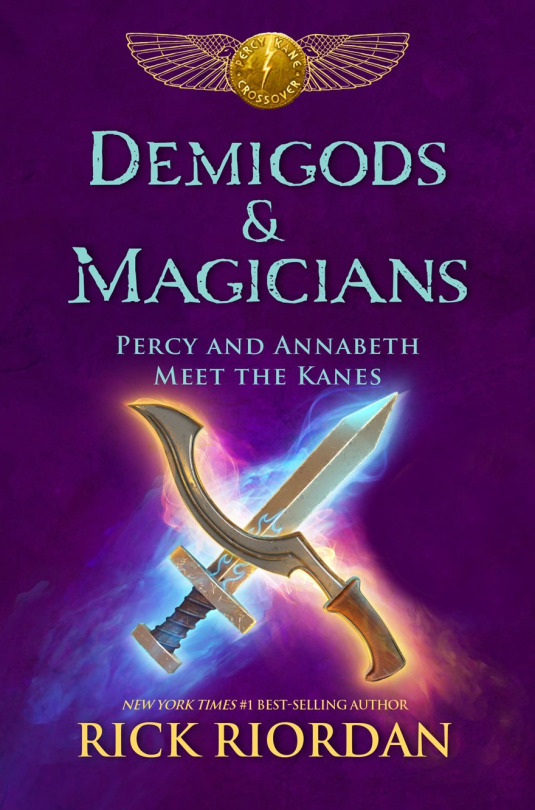
Rick also made a crossover on Percy and his Egyptian Mythology counterpart, Carter Kane. They work together to defeat Setne, an Egyptian magician who thirst for divine powers. It was like an official crossover fanfiction.
Diverse Demigods with Dazzling Characteristics
I love the characters in the series, they were just full of animation and so on. I’ll state my top 10 favorites and that one character I truly despise.
First come with my favorite characters of the series:
(art by viria, she makes the old official arts belongs to the pit of Tartarus)
10. Frank Zhang
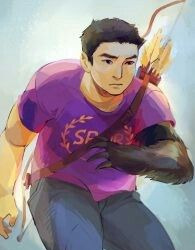
One of the cinnamon roll of the series, and the tamest among Mars/Ares children. I’m glad that Rick put a Chinese demigod in it. His Chinese name, Fai Zhang, probably based on Zhang Fei from the Romance of Three Kingdom. He is the only demigod who can read and write normally. He has shape-shifting abilities, inherited from his ancestors, is adapted from the Monkey King from Journey to the West. Like the Greek hero Meleager, his life is depended on a wooden stick, showing his pyrophobia.
Frank started off as shy with low self-esteem. He was raised by his military mother and his strict grandmother who told him various tales of their ancestors. His mother died in a war, giving him a start to train himself as a Roman demigod. In the Son of Neptune (SON), we first see him doing tasks that are undesired by the other campers. He is officially welcomed into the centurion of the fifth cohort, after he was claimed as the son of Mars. His first quest to Alaska causes him slowly gathers courage and discovers his family power. The funniest makeover he has was in the House of Hades (HOH), when Triptomelus rewards him with a buffer and taller figure, saying goodbye to his chubby self. Finally, he is upgraded to praetor.
The dynamic between Leo and Frank plays a vital role. Frank, who is initially afraid of Leo because of his fire power while the latter keeps making fun of him. We can see in the Mark of Athena (MOA), his act of jealousy towards Leo due to his similarities with ‘Sammy Valdez’, Hazel’s first love. As the series continues, Leo gives him a fireproof cloth for him to keep the wood, as a baby step for Frank to give him trust.
I heard that he will be in the subsequent book, as the Dark Prophecy stated him as the ‘changeling lord’. I might see him as a mature praetor on duty alongside with Reyna.
9. Hazel Levesque
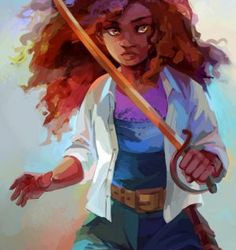
Another cinnamon roll in the series. Despite being a daughter of Pluto/Hades, she is the less miserable version of Nico. Originally, she is known to have the abilities of controlling metal and valuables. Her magical abilities in controlling the mist is known in HOH, becoming another useful weapon. Like any child of Hades/Pluto children in the series, Hazel was from the pre-20th century. Her mother, Marie was hungry for wealth, causing her daughter having a cursed ability of attracting metals. Despite Hazel resented her greedy mother, she saved her from raising Gaea. Her heroic deed gave her a token to Elysium, yet she gave up her position to refrain her mother suffer from eternal punishment. As the child of death, she wandered around Asphodel for decades. Until her Greek half-brother discovered her and brought her back to life, giving her another chance to live again, in the 21th century.
In SON, it is revealed that Hazel’s half-brother is Nico. Originally, he wanted to bring his biological sister, Bianca back to life, seeing that the Doors of Death was opened. It was hinted Bianca had chosen a new reincarnated life than staying in the Underworld. Eventually, he learnt about Hazel’s presence and decided to take her back instead. Initially, we thought Hazel as a replacement for Bianca, judging Nico as a selfish person. Slowly, he shows brotherly affection for her in HOH by kissing her forehead, something he would not simply do. In BOO, he accepts Hazel’s relationship with Frank and teases them. He even comforts Hazel when she cries for Leo. It’s a coincidence that their mother almost shared the same name.
As she lived in an era where colored-race were low-key discriminated, with her unusual ability, she was a target of bullying. Her only comfort among these mishaps was Sammy Valdez, who sees her as a diamond. As Leo shares the same looks and last name as Sammy, believing as his reincarnation, she has slight romantic fondness for him. Later, they discover Sammy is Leo’s Great Grandfather. She finally settles down with Frank, treating Leo as her friend.
Her curse, which will be washed away by a descendent of Poseidon/Neptune, which readers are not sure if it is Percy or Frank. Besides, she probably learns some interesting 21th century stuff she had never seen before. Hopefully she does not craze for fidget spinners (those things are just all over the place!).
8. Annabeth Chase
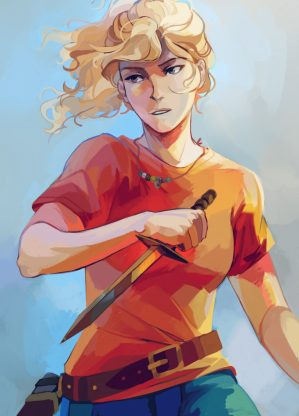
The Brainiac of the group. Our favorite Wise Girl who is Percy’s love interest and strategist. The architect of Olympus. Someone you would choose as your girlfriend. After meeting her, you will change your views on blonde hair people.
No matter how beautiful and smart she is, she has her own fears and flaws. She has Arachnophobia, based on the feud her mother and Arachne had. In MOA, she faces her greatest fear, mother of spiders Arachne. With her clever trick, she easily defeats Arachne, possibly the first Athena demigod to do so. In SOM, she reveals her fatal flaw is hubris, believing her intelligence and power are beyond the Gods.
She ran away from home at 7, believing that her father and stepmother had disliked her part god status. On her way, she met Luke and Thalia, who presented her one of her signature weapon, the Celestial Bronze dagger. They were like a parental figure to her, and the first demigods she encountered. In the beginning of TLT, Percy figures Annabeth develops a crush on Luke, who turns out to be a backstabbing traitor and a threat to Camp Half-Blood and Olympus. Her feelings towards Luke varies in the PJO series, we see compassion, sympathy, love, respect, hatred, and regrets. In TLOl, she settles with having a sibling love towards Luke, choosing Percy over him.
The Percy-Annabeth relationship is one of my favorite hetero fictional couple. They treat each other as equal, rather than having Annabeth as his personal sidekick. With her, as the intelligent girlfriend; and him, as the brave puppy-dog boyfriend. We surely remember the first thing she tells Percy in TLT is ‘You drool when you sleep’. Even the rivalry between their parents, Annabeth still treats him as a friend, with one or two disagreements. Of course, I shipped them before they are officially together. In the Titan’s Curse (TTC), we get hints on Percy starting to fancy Annabeth, with Aphrodite’s appearance and her teasing. Next, there was the infamous kiss scene in The Battle of Labyrinth (TBOL), confirming the start of Percy’s romance journey, which becomes true in TLOl (that underwater kiss is so romantic!). After dating for months, Percy is swapped place by Hera/Juno, without any previous memories except for Annabeth. In MOA, she gives him a judo-flip (I laughed at that scene for hours) and spend a night with him in the Argo II stables (Frank does not deserve to see this ‘intimate’ moment).
Besides, do you know that she has a Norse Demigod cousin? Check out Rick’s Norse Myth series to find out.
7. Luke Castellan

You would probably ask why I place him as Number 7, for someone like him as a traitor who almost destroy Olympus and the host for Kronos. He is the anti-hero in the first series, but I like the fact that Rick created someone like him.
Luke is not an entirely a bad person. Normally, he can pass as a protective older brother, a swordsman mentor, or that mischievous and charming friend you want to hang out with. His ambitions to destroy Olympus and feeling of resentment the gods, due to the injustice of the Olympians to their demigod offspring, makes him an antagonist in PJO. He is one of the demigods who can see the flaw of the lawful system, the one who questions the authorities.
Luke constantly seeks for familiar love which his parents failed to give him, with him living with an insane mother and an absent godly father. After he ran away, he was paired with Thalia and Annabeth, giving him a new meaning of family. However, Thalia’s death added as a fuel of his bitterness. His became the head of the Hermes Cabin, leading his half-siblings, but his anger had not fully stopped, with Kronos’s constant impure motivation. He also feels compassion towards minor godly children who have no place in Camp Half-Blood, which most of them serves him during the Titan War.
For most horrible deeds he has made in the PJO series, he finally died as a hero, oppressing Kronos who possessed him. Inspired from his wish, Percy refuses his eternal life by demanding fair treatment for every demigod child.
I ship him with Thalia, which they share a few romantic tensions in a short story in TDD. He is the reason why Thalia declined her offer as a hunter in the first place, and also the reason why Thalia settles down as the lieutenant of Artemis in TTC.
6. The Grace siblings (Thalia and Jason Grace)

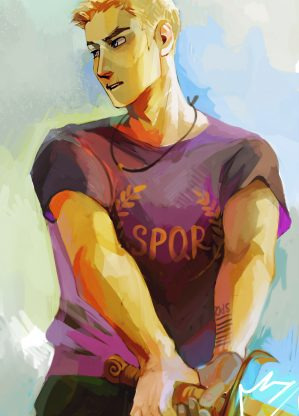
It’s a tie. Yes. I could not separate them like how Juno/Hera does. The Grace siblings are the improvised version of their father. We see their father as a womanizing, dramatic and disloyal King of Gods. They showed his best qualities, like leadership. The siblings are very loyal to their partners and masters, like Thalia to Luke and Annabeth in the beginning and Artemis in TTC. Jason, a loyal and supportive friend to his Argo mates and his girlfriend (He did admire Reyna before, but thanks to certain goddess).
Thalia Grace is that cool-looking sister in punk. Her name is from Thalia, one of the Muses. The irony is that she has a great fear of heights, but she can control lightning. Like Percy, Thalia was destined to be the child in the prophecy. She fought the monsters sent by Hades to her death, protecting Luke and Annabeth. Then, she is reborn in the Sea of Monsters. Luckily in TTC, she joined the Huntress. She also been through a rough childhood, with taking care of her baby brother and her irresponsible mother, then with the disappearance of Jason. She had to take the role that her parents failed to perform, yet the Gods accused of her existence before Percy showed up. It’s pretty much Zeus/Jupiter’s fault for not stick with the oath. Not once, but twice! Worst of all, he named his son Jason, like the mortal hero, so he can make his wife happy! Best Dad award for him!
Her brother, Jason, with blonde hair and blue eyes, the typical American boy. The ‘perfect’ boy with duties and leadership, he could live a perfect Roman demigod life in Camp Jupiter. Then, Hera/Juno interfere again. From the Lost Hero (TLH) to BOO, we can see a few changes of him. The rule-following golden boy to a slightly laid-back person with nerd glasses. Most fans expected Percy and Jason had a death-match against each other in MOA, with Percy replaces his position as the praetor in SON and Jason, the legendary son of Jupiter. Unexpectedly, they become best buddies on first sight and gang up against Octavian (We also got that one scene with them fighting while being possessed by eidolons). He also has the most passed out scene in MOA (hence the birth of Brick x Jason). His sympathetic character cares for Nico when he is forced spit out his crush on Percy (who does not have a crush on him, I mean, it’s obvious to fall in love with the greatest hero). He does not question or having a prejudice on the boy’s sexuality. At the end of BOO, him and Piper sit on the roof, remembering his ‘dead’ friend Leo.
These polar-opposite blood-siblings are a unique element of the series. I would like to see more of their interactions, or Thalia spilling out more embarrassing stories of Jason.
5. Leonidas ‘Leo’ Valdez
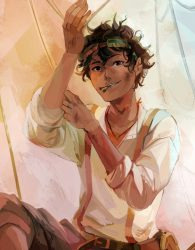
I called him the second Percy Jackson, with that same level of humor and that friendly attitude. He has a pair of magical hands that can create things and repair broken stuff. In TLH, he modified a simple paper into a small flying helicopter. Leo was partly raised by Hera/Juno, who makes him do dangerous tasks in his childhood (This woman is nuts!). When he was eight years old, Gaea made him believe he caused a fire that kills his mother in her workshop, leaving a scar in his heart.
Leo probably knows himself as the third-wheel, constantly the one being left out. There was a period of time he is jealous of Jason’s charisma and excellent leading abilities, while he is a low-profile mechanic, with no one cares about him. Otherwise, he is a good friend to people who are nice to him. In BOO, Nike/Victoria predicts either Frank, Hazel, Percy or Leo will die in the war. Leo, helping the idea of getting the Physician’s Cure while secretly plotting his own death and his chance of survival.
This guy has a tough time catching the girls’ attention, he keeps falling for the wrong person. In the beginning, he has the hots for Khione, the cold snow goddess who side with the Titans. Next, he falls for Jason’s sister Thalia, who tries her best ignoring him. He has a small chemistry with Echo, a camouflaging nymph who is cursed to repeat people’s sentences (I feel hurtful when Echo disappears). Hazel mistakes him as her first crush Sammy, who happens to be his great-grandfather. Finally in HOH, the Titaness Calypso despise his sudden appearance on her island, later they find themselves being attracted to each other. He is also the first hero who can return to Ogygia and claim Calypso as his girlfriend, and the first demigod known dating an ancient being.
I need more interaction of Percy and Leo, which was rare in HOO. I expected them to be joking buddies, but in MOA Percy yells at Leo for setting New Rome on fire, not a good start for best friends. Leo also dislike Percy for abandoning Calypso behind, which turned out to be a misunderstanding. I finally get a scene of them making Nike and Adidas joke they made in BOO.
By the way, Team Leo for the win.
4. Piper McLean
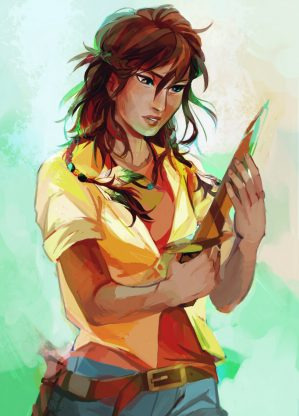
I do not get why people would dislike someone like her. There are several fans disliking her characteristics, including an ex-classmate of mine. They think her as the most useless and bland character. I love Rick’s arrangement of her characteristics! What is the point of making her the main character if she does not contribute anything? I mean, she singlehandedly defeats Khione and the Boreads in HOH. When Khione degrades her, she confidently argues with her, proving her strengths.
People stereotyped daughter of Aphrodite as living Barbie dolls, who do nothing but looking into their reflections and gossiping. Sometimes, they either pair people up or break others’ hearts. She breaks that idealistic view as a tomboyish girl who cares less of her look or fashion. She is one of the boldest Aphrodite child who fights for people she loves (the other one is Silena). She is very down-to-Earth about her father’s job as a Hollywood actor, until she is cornered by others. She is also the first person who dauntlessly challenges the cabin leader and oppose the Aphrodite’s rite of passage of breaking other’s heart. Piper is not a dumb-beauty, she already has an abundance of knowledge on Greek Myth and Cheeroke legends which play extremely useful information to other.
That ex-classmate told me Piper is possessive towards Jason. For me, it is very normal for her to be possessive to her ‘boyfriend’, or someone whom she loves, as long as it’s not Yuno Gasai level (see Future Diary for references). Besides, Jason is not the only one she cares about. There is Leo, and her father who is captured by the Giants. There are people dislike her because in MOA, she thinks Percy as cute, but average. Everyone has their own opinion, not everyone fancies the greatest hero on Earth. I really adore her and Percy as best friends, rather than her being another Percy’s admirer.
I would say she has the second-best character development. In TLO, she has the image of an insecure girl. Her adventure as a demigod makes her grow, mending her weaknesses. I love her chemistry with Annabeth in BOO, when fear and phobia prevent Annabeth’s logical reasoning from functioning properly, her feelings guide her to overpower them.
3. Reyna Ramiez-Arellano
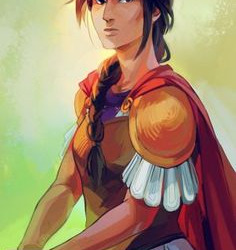
Most of the major female characters are taken (except Thalia, the huntress and Rachel, the oracle), she’s the only major female demigod character in the series without a romantic partner. She made a minor appearance in the Sea of Monsters (SOM) as Circe’s apprentice, but soon
Her first appearance in SON gives a dignified and mysterious aura, we barely know her last name and such. She is fearless in battle and a wise leader. In fact, the last book reveals her fear towards ghosts, leading to her haunted childhood of physical abuse. She has moved from home to home, and settles as a praetor in New Rome. Her former sin for patricide might lose her power and trust in New Rome, thus she never speaks of it to anyone except for Nico.
I am really entertained with the fight between Orion and Reyna. Orion, being the male chauvinist, comments the greatness of male dominance. Reyna proves herself that she can perform as well as a man could do, defeats him by herself while avenging the fallen huntresses and Amazon warriors. ‘You will die at the hands of a girl’, that sentence literally gives me the chills.
She has a successful career, blessed by two divine beings, and having an excellent characteristic. One thing that she does not own is romance, just like Aphrodite/Venus tells her that she will never find romance in half-blood. There might be a chance for her having a mortal lover, or catching the eye of an immortal being.
2. Perseus ‘Percy’ Jackson

He is the key character for us to fall in love with the demigod world with Greek Gods and monsters. He was not only charming, but having a great sense of humor. The dark hair and green eyes of his makes him fall into the category of the stereotypical hot-blooded protagonist with a tragic backstory and secret powers, like Eren Jaeger from Attack On Titan, or Hyakuya Yuuichirou from Seraph of the End. The character is based on Rick’s own son, Hayley Riordan, who suffers from ADHD and dyslexic. Rick used to tell him Greek Mythology as his bedtime stories, until the child gave him the inspiration to create his world with Greek Myth as the base.
In TLT, he is shown as a troublesome child who gets kicked out of school frequently. He has an abusive stepfather, Gabe Ugliano, a nasty gambler. He does not have any friends except for Grover, who has difficulty in walking, and stands up for him. He nearly loses his mother from a Minotaur. His unfortunate past changes when he knows of his identity as a demigod. From SOM to TLO, we can see improvements in his mortal life, such as gaining a new stepfather, Paul Blofis, able to attend high school, and getting loyal friends. In TOA, it is known that he will have a baby sister.
Besides his heroic acts and his brave deeds that we all know, he is pretty goofy and sarcastic. We all know of his personality through that first-person point of view about his views on others and the description of his adventures. He is moderately smart and observant, but he can be oblivious in simple stuff around him, like his own romantic encounters. He needs years to realize he is in love with Annabeth, which most of the readers get the clue before him. Reyna confesses her feelings to him in SON, which Percy needs minutes to figure it out. In BOO, when Nico opens up to Percy, Annabeth already gets the point right ahead, leaving him still in a daze.
Percy, despite being the best demigod alive, he acts quite modest and selfless. Most Greek Heroes we all know are portrayed as prideful, arrogant, womanizer or ungrateful. Him, as the son of Poseidon who technically saves the world, he never looks down on anyone. He barely sells himself, except when it’s needed, or in a very sarcastic way. He makes friends with everyone, including non-humans. In SOM, he is a little ashamed that his half-brother is a Cyclops, in the end he accepts him as his brother. The most significant moment is in TLOl, when Zeus offers him immortality. He considers at first, but then realizes the price of it, and turning it down. Instead, he asks for minor deities’ equal rights to claim their demigod children, including Hades, who is not welcomed in Olympus. If I were him I would probably do the same thing, except I might face the wrath of the King of Gods.
**Before revealing my top favorite character, here’s some honorable mentions:
Zoe Nightshade, Bianca di Angelo, Will Solace, Charles Beckendorf, Rachel Dare, the Stolls brother, Ethan Nakamura, Grover Underwood, Tyson, Blackjack, Chiron, Silena Beauregard, Gleeson Hedge, Clarisse La Rue, Calypso
Now here comes my favorite character:
1.Nico di Angelo
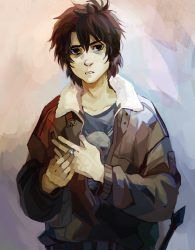
I am so sorry, I must put him at number 1 because of my personal bias.
This character has the most noticeable character change and development. He is debuted in TTC, which he is portrayed as carefree 10 years old boy who loves Mythomagic and very curious about everything. The death of his sister, his only known blood relative, caused him fall into despair. Soon, he learnt about his parentage, separating himself from the other demigods.
Despite him as the serious, angry son of Hades with depressing background, he gets a few hilarious moments. He is turned into two types of plants; the Spiderman referenced quote ‘With great power…comes great need to take a nap’; his imagination of Percy joking about farturas; and his confession to Percy.
His personality is mostly seen from other demigods’ views. In TTC, Percy sees him as an annoying little brother and full of curiosity of the demigod world. He seems excited with everything he is involved in, and very eager in participation. He also shows concern for his sister Bianca, asking Percy to protect her. His twist of personality comes in when Percy brings the news of Bianca’s accidental death. In BOTL, he becomes the gloomy, antisocial, and angry child who seeks for revenge and performing necromancy. He also crowns himself as the Ghost King, which the name sounds very Chuunibyou-ish (Chuunibyou is a Japanese term for people who acts like a know-it-all adult and look down on real ones, or believe they have special powers unlike others, see the anime Love, Chuunibyou and other Delusions for more info). In TLOl, he tricks Percy into his father’s lair, which makes Percy angry. He is one of the important ally who aids Percy gaining his Styx River immortality and convincing Hades to fight the Titan army.
There are more demigods involved with his description of personality and people’s opinion of him in HOO. Hazel, seeing him as her savior and brother, showing an amount of respect and admiration. Annabeth, doubting him having a crush on her (which he does not), only sees him as a younger brother. Leo is scared of his necromantic skills, trying to avoid him as best as he could. Frank shows respect and fear to his ‘brother-in-law’, but unexpectedly sharing the same interest in Mythomagic. Jason, originally suggests abandoning him to the Titans while proceeding their main task in MOA, receiving many objections from the other crew members. In HOH, Jason has a sense of sympathy to Nico when Cupid forcefully make him spill out his feelings. He approached the younger boy to befriend him. We also have Reyna, who forms a big sister instinct towards him, and also feels his pain.
We get Nico’s own point of view in BOO. We could not help but to sympathize with his old memories and feelings. We can see his unrequited feelings towards Percy, his moments with Bianca, his hatred towards the Hunters, his intense feelings with his father and the most importantly, his concern towards other demigods. He is not entirely a cold-hearted, unemphatic person like others believed him to be. The way he describes Will, it definitely sounds like a typical boy meets boy fanfiction. Using comparison to other demigods like Jason and Octavian, he has a sense of fondness to the child of Apollo. The Percy-Nico-Will mirrors the Luke-Annabeth-Percy relationship. Both Luke and Percy are the heroic figure to Annabeth and Nico, they are years older than them (technically Nico is older), and they the first demigod they encounter. Annabeth had a love-hate relationship with Luke due to his betrayal; while Nico hates him for breaking their promise and admires him at the same time. Annabeth bickers with Percy like how Nico argues with Will, and they are opposite attractions. In the end of the series, Annabeth tells Luke she sees him as a brother and starts to date Percy in PJO; Nico confesses his past crush towards Percy and sets his eyes on Will, which they end up dating.
I am glad that Riordan arranged Will as his boyfriend. There is a slight change of his personality after they are dating. For example, in CHBC, him and Percy team up and tease Annabeth. In THO, he becomes more participating in camp activities, and willing to socialize with other campers. Plus, he gives an excuse for himself to sit with his boyfriend in the Apollo table. Nice job kid! The loophole of two demigods of the opposite sex cannot stay alone in a cabin gives them a nice chance to spend nights in Hades Cabin, doing stuff.
The character I despised the most, is none than other:
Octavian
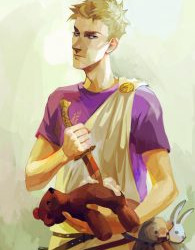
He is purely whiny and annoying, like a fly. I knew he was up to no good when I first know this person. I do not care if he is the descendant of my favorite god (Apollo), this puny auger is terrible. In SON, he reminds Percy as Luke Castellan. In BOO, Nico describes him as a watered-down, unhealthy version of Will Solace. Leo also states he has a girly screaming voice. These descriptions give reader an image of an undesired person, also adding humor in the series.
Octavian is extremely xenophobic. He immediately dislikes Percy, insulting him as graecus scum. He does not show any sign of welcoming to the arrival of the representatives of the Greek camp. Ironically, he fears for Nico, who is a powerful Greek demigod. He discriminates Rachel Dare, Apollo’s chosen oracle, believing she is a fraud who practice sorcery.
His sadistic and prideful side is portrayed in many scenes. For example, he rips off stuffed animals as an offering to the gods. He hopes Percy feel the pain of getting his new SPQR tattoo. When he is in charge as Pontifex, he picks people who are brutal like Bryce Lawrence and strong like Mike Kahle. He casually tells people that his family is wealthy in New Rome and he is a descendent of Augustus.
In the end, his own pride and lust for fame and power blinds him, giving him a death sentence. His death is graphic and funny. He might receive eternal punishment in the Underworld. My favorite scene of him is when Piper, Jason and Percy tells him to shut his mouth in MOA.
(I almost forgot Gabe Ugliano, who happens to be the worst parent and husband in the fictional world. This man is gone for good!)
Groovy Gods of Olympus
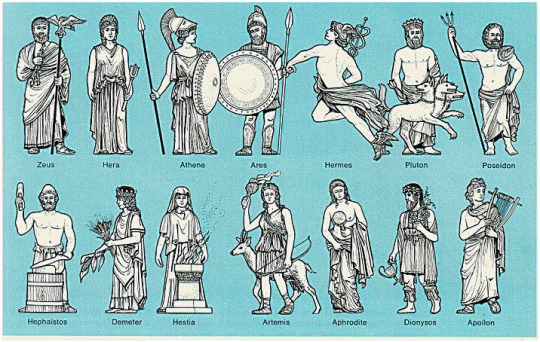
The Greek Gods in Percy Jackson’s world rules the world, which all of them have humanistic personalities. Greek Gods mirrors human’s behavior with their vice and virtues, like Hera’s jealousy, Hephaestus’ diligence, Zeus and Aphrodite’s lust, Hestia and Artemis’s chastity, Zeus and Ares’s wrath, Hestia’s kindness and Dionysus’s sloth. They moved their base from empires to empires, until they found their spot in United States, the world’s superpower nation. Olympus is based on the top floor of the Empire state building, while the entrance to the Underworld is in Los Angeles. These settings probably make us never see those things the same way again. The gods, adapted to the 21st century lifestyle, with their area of power matches the modern professions.
Rick still sticks to the original description of the gods, with Athena’s greyish eyes of wisdom, Aphrodite’s changing beauty (depends on different people), Ares’ ruthless behavior, Apollo’s flashy and handsome looks and Hephaestus’s unappealing image. Not all the gods are divine as they should look. Dionysus/Mr. D in PJO series acts as a sluggish camp director. He is banished to Camp Half-Blood due to his flirtatious manners on an off-limit nymph. He does not contribute much to the camp, except for having naps or playing poker with Chiron and a few satyrs. Apollo, the prideful and narcissistic sun god, turns into a mortal by his father in TOA series. He has lost his former glory and powers, leaving him a mortal identity and body to live on Earth. Hestia, the former Olympian in the appearance of a young girl, is easily neglected due to her status.
I would admit that Greek Gods does not make excellent parents. Zeus forbids the gods from visiting their mortal children, except in a few occasions (he is also the douche who broke the oath twice and have 2 demigod children, and he passes most of the blame to Poseidon). Hera, expecting an ideal family, abandons her child Hephaestus because of his ugly appearance. In TLOl, Hades openly declares he prefers Bianca over Nico. However, some gods do care of their children. Poseidon in the series acts as a caring father to Percy (we barely see his angry side like in the myth). Hermes, who has multiple jobs, and countless children, he cares deeply for them. He even kisses Luke on the forehead before the Fates carry his body away. In BOO, it is revealed that Hades has a deep affection for his children, which most of them do not have a happy life. The antisocial and awkward god has difficulties in showing fondness, thus he provides his children gifts (Pluto gave Hazel colored pencils on her 13th birthday while Nico gets a French zombie chauffer).
Usually, gods conceive children like normal human beings. In BOTL, children of Athena are born in a unique way. I was curious at Annabeth and the other Athena’s children birth since their mother is a virgin goddess. There was a story in Greek Myth which she and Hephaestus had a child sprang from her handkerchief (of course they do not have any intimacy). It is told that children of Athena are born from the mind and pure love, not through intimate love and pregnancy. In THO, the daughter of Apollo Kayla Knowles has two fathers. I had to stop and reread that part, and it is true. I still do not get how demigod children are born from same-sex parents. Subjugate mothers? Or maybe like Athena children, sprang out from something. (I need to stop thinking about this or else the complexity will burn my brain cells).
Controversies
There’s a few controversies I have heard around.
Similarities of Percy Jackson and Harry Potter

This one was all over the place. People keep comparing Percy Jackson to Harry Potter. Some complaint that Rick copied the characters Rowling owned. These are the examples people brought up.
1.Percy has green eyes and black hair, living with an abusive parent. He does not know of his parentage. Harry, who has green eyes and black hair, living with abusive relatives.
2.Annabeth plays the smart one in the first trio. She is constantly compared to Hermione, the brightest witch in the Wizarding World.
3.Grover is the timid person of the trio, and the first supporter and companion to the main character. Another character in Harry Potter with the similar personality, Ron Weasley.
4.Chiron, the knowledgeable and caring mentor in the series, like Dumbledore in Harry Potter.
5. Luke, blond hair, the anti-hero. Draco, the anti-hero to Harry.
6. The mischievous Stolls brother, who keeps pranking on people. The Weasley twins, pranksters duo of Hogwarts.
7. Camp Half-Blood that is invisible to mortal’s eye, a haven for Greek demigods to learn defensive skills. Hogwarts, unknown to muggles and where young witches and wizards lean magic.
Maybe the author was not stable with the characterization in the first place, he might get references from the series itself. However, Rick has not confirmed that his characters are based on the Harry Potter series. The characterization became better later.
To be frank, I prefer Percy Jackson than Harry Potter. I love the diversity shown in the book, with good humor in it. Otherwise, Harry Potter gets the best language form.
The Percy Jackson movies
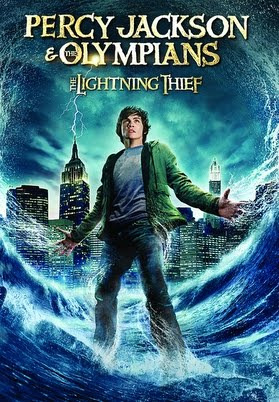
Movie adaptations are barely good, this is one of the examples. Even Rick himself acknowledge that the movie is horrible. I watched both movies, the plotline itself is good, but it cannot satisfy us fans.
The producers casted young adult actors for the roles than 12 years old. They could actually make the actors grow up with the movie, just how they did for Harry Potter. I’m alright with the Percy Jackson actor, I have no prejudice over Movie Grover’s race, Luke’s actor is fine (where’s the scar). I just have problems with the casting on female characters. Firstly, Annabeth Chase. In the first movie, she’s a brunette with blue eyes. I legit thought that’s a random daughter of Aphrodite. Where is the blonde hair and blue eyes? It does not mean I dislike the actress herself, it just her signature curly blonde hair with grey eyes are gone! This mistake was soon corrected in the 2nd movie. In the SOM movie, the Clarisse’s actor looked like a Victoria Secret Super Model, rather than the buff, mean-looking leader of the Ares Cabin.
There is a stark difference from the movie settings and the book settings. Instead of having cabins based on their godly parentage, each member has their own cabin. What is this? Luxury camp for the godly children? There is also no rule on camp clothing, where’s the orange camp shirt? The worst of all, why do they have advanced technologies? It is said that technologies attract monsters, which is unusable for demigods.
All of these flaws made me prefer a sophisticated anime adaptation than a real-life movie or TV-show.
LGBT+ characters

(whoever made this edit deserves a thumbs up)
This is a recent controversy after the publicize of THO. Mostly from parent readers, they complained on the god’s sexuality and Nico and Will dating. I understand that some parents don’t want their children to knowing much about human sexuality at an early age. What makes me feel mad about the people who complained about having same-sex couple or characters in the LGBT+ spectrum does not realize that homosexuality is accepted in the ancient times.
It is true that Apollo is bisexual, who has countless affairs with women and men. Other gods are not 100% straight, even Zeus fancied Ganymede. (I know, Greek Myth is one hell of a messed-up pit!)
Besides, I have nothing against Nico and Will dating (Solangelo shipper here!). Rick does not use words like ‘gay’, ‘queer’, ‘homosexual’ to identify their sexualities, which he does not want to label them as a specific identity. In Ancient Greco-Roman, same-sex relationship is highly encouraged in the army to strength the bonds between teammates. Also, as someone in the LGBT+ spectrum, I appreciate Rick’s decision to take the risk and promoting diversity. One thing I am mad about him is the vagueness of Nico and Will relationship. There are so many gaps in between BOO and THO which there’s no description on when they started dating, who confessed first and how do they get together! I need to know more about their relationship! I will be glad if there’s a side story of them. Also, Kayla’s mysterious birth from same-sex parents.
I love the fact that Rick does not give a dam (I simply just put a pun here) about the people who complained. He straight on inserted a kick-ass elderly lesbian couple in TDP.
How the series made an impact on me? My hopes on the franchise.
It is one of the reason why I took the path of writing. The story, and the writing-style had inspired me to be a writer myself. Looking at the vivid image of modernized Greek Gods brought some magic into my dull high-school life. I would also like to cosplay those female demigods in the future. As an anime fan, I hope this series can be created into an anime series, just like how they did for the Powerpuff Girls back then. I also hope I can meet more PJO/HOO fans in my country.
Jenny (14-21 Aug 2017)
Author’s Note: My first essay describing on a fictional work I like. I tried to avoid any grammatical mistakes and add as much vocabulary as I can in it. The one week of writing this essay gives me neck pain (from looking too much on my laptop), and a better insight to the character and the story. I took a hiatus in the PJO/HOO fandom since I started on Hetalia and other anime. The day I decided to write this fic, I realized there are so many details I have forgotten, thus I need to check the Wikia and the books for references. This is a pleasant experience for me to start on writing reviews and simple creative writing. I might write more reviews or analytical essays for other book series and anime.
#percy jackson#percy jackon and the olympians#heroes of olympus#trials of apollo#rick riordan#pjo#hoo#toa#jason grace#leo valdez#piper mclean#reyna avila ramirez arellano#thalia grace#octavian#nico di angelo#hazel levesque#frank zhang#annabeth chase#luke castellan#teen fiction#jenny's fictional essay
5 notes
·
View notes
Text
Ideas from the Last Few Months - Part 1 of ?
Ideas for narratives are always coming to me. Stories are the underlying structure of our psychologies and our societies. Sometimes I write these ideas down. Here are a few. (Get ready, it will seem fast and chaotic.)

I like the idea of human clay. I like the Creed songs about human clay, I like the myth of the golem formed from clay as presented in Terry Pratchett's book series "Discworld", I like the story of Prometheus forming man from clay. I think it could be tied into the Adam, Eve, and Lilith story too. I like when they used the idea in the tv show "Warehouse 13". It just seems like more could be done with it.
I like the idea of the sands of time. What if there was an epic quest or battle for the sands of time, but then the sands of time did nothing? That happens with goals and attainments a lot, they are hard to achieve and then they're a let down once achieved. I had that experience with mountain climbing years ago. Now, I always have some value that I'm pursuing in the future so that the feeling of an existential vacuum never encroaches on my psyche, but it's still an important human experience.
What if you have a failed hero that is resurrected? He seeks to redeem himself, but he fails again. That could be a great tragedy. Then, the failed hero is redeemed and possibly resurrected by a successful hero that his failed struggle inspired. Then it's a powerful story about repeated failure, the value of fighting the good fight even if you lose, and a story of redemption and triumph. It sounds epic.
The ancient Egyptian god Isis as a heroine that saves her husband.
What if dragon flames didn't burn heroes, what if the dragon flames shrunk people? A hero is shrunken and eaten by the dragon. Inside of the dragon's belly he finds a group of other heroes playing a game of cards on a shield. He rallies these failed heroes and leads them to a victory in which they are redeemed and resurrected. That seems like an epic children's story.
What about the heroes encounter with the hero?
The Humpty Dumpty problem. That's a tiny story that can be so powerful. I think I could expand on that in interesting ways.
Many authors like to start a story by drawing the map first. "Treasure Island" by Robert Louis Stevenson famously started that way. What about taking the "Atlas of World History" and using the maps as jumping off points for stories? You can make them set in our world, or completely change things for a fantasy setting.
There are old maps of the earth from the ancient world that are quite different than our modern ones. Those could be great settings for stories. I like the one where there are four rivers that emanate from one point in the south.
Moon cycles are interesting. What about a moon cycle curse connected to a bracelet or something?
I wrote a four word story once. There is an article on my blog about it. I could hold a photo, drawing, or painting contest and include the images in a book along with an essay about how closure works in narratives.
I created what I termed a Killer Pacman a couple of decades ago as a doodle on schoolwork. That creature has now morphed into the Butterfly Monster over the last two years of teaching English online to kids in China. I also created a Butterfly Fairy and an enchanted Butterfly Forest. I was even thinking about doing the pictures myself for some children's books. It would be cool to get a real artist to do the same pictures and juxtapose them with mine in a book.
What if there was a Time Capsule Society that was seeking to send a person into the future, a human time capsule? If you travel the speed of light you don't age, meaning you can essentially travel forward in time. Interesting.
What if we combine the Philip K. Dick story of Autofac with the DARPA Eatr bots? Autofac is an automated factory that doesn't need any humans to run, it does the entire process from finding natural resources to producing things and repairing itself. Eatr bots are military walking drones that are designed to eat biological energy sources to fuel themselves. Essentially, they could shoot and then eat people to keep going. A system like that could actually conquer the world. Classic science fiction dystopia, but better, because we actually have the technology.
A kid in middle school notices that socks are disappearing. It's becoming harder and harder to find a pair that match. Is there a monster behind this Sockpocalypse?
A funny of satire where there is a world of peace and prosperity and our minor problems are their major problems. Utopia World Problems.
Restorative justice is promising. It's about the injuring and injured parties agreeing to restitution through any reasonable means. These are stories of the fall, transformation, and redemption.
Would it be fun to tell the mythical story of dragons creating man from clay and fire? I think it would. Prometheus the dragon? Maybe. What if all of the Greek gods were dragons? And all of the Titans too? What if angels were dragons? Angles as dragons with ancient Titan names and myths? Interesting. I am intrigued by all of that.
Sometimes our motivations are just surface motivations. Sometimes our underlying motivations are hidden even from ourselves. Then, when you achieve what you were aiming at you realize that it wasn't what you really wanted. That theme is explored a bit in the show "Wayne".
Using a third person point of view to introduce another character through some specific incident, and then switching to the close third person point of view for the protagonist from there on is interesting. Ursula K. Le Guin did this in one of the "Earthsea Cycle" books.
Can I integrate the novel and the graphic novel? I saw this partially done by a girl named Lily that is about 10 years old and it was thought provoking.
What if a comet hit earth and created hell? Pushed up Antarctica as the mountain of purgatory with the four rivers of the world flowing from it. This is Dante's version of the world.
I like the idea of blood as ink. Maybe there is magical ink blood that when harvested can be used to make magical books.
In the ancient Greek afterlife the heroes went to Elysium, most people went to the grey fields of Asphodel, some people went to the fields of Punishment, and the worst beings went to the black depths of Tartarus. What if the heroes in Elysium were bored, recruited the wandering masses in Asphodel, freed the prisoners from the fields of Punishment, and attacked Tartarus. Could be epic.
Beowulf is an old and odd story about a Viking fighting a monster. A weird modern take on it is "The 13th Warrior" movie with Antonio Banderas, based on a book by Michael Crichton, "Eaters of the Dead". What if the monsters were actual Eatrs, the robot made by DARPA that can consume bodies to fuel itself on the battlefield?
What would have to happen to you for you to become a bad person? What about the reverse process? These are interesting thought experiments. Psychologist Jordan Peterson talks about how useful these can be. It's also an intriguing idea to explore in literary form.
Many stories have been told about self-fulfilling prophecies, where a prediction makes people act in a way that brings about the prediction. It's still a great idea.
Here's a note I left for myself that I don't fully understand: "once and future king, arthur, Community, my IQ, billionaires rise and fall and rise again". I understand it a bit. It's about the fact that so many stories are about being in a good state, losing that good state, and then the struggle to restore the previous good state. Because I have bones pressing on my brainstem I have experienced that struggle with my IQ, that's why that's in there. The tv show "Community" also follows that structure in a sitcom format. King Arthur is that story. A number of billionaires have lost everything, and then made it back again.
Resentment is the murderer's muse. What if we personify it as something like a muse sitting on the shoulder? Creepy!
What if Obscurity was a demon that followed people around and made sure that they weren't noticed?
In a general sense, everyone is seeking the promised land in life. That can take many forms. Sin is missing the mark. I don't know where I'm going with that, but it might be something.
The philosopher and professor Susan Wolf wrote a book titled "Meaning in Life and Why It Matters". I think she comes to some bad and dangerous conclusions in that book. I would like to write a commentary taking apart each piece of it.
One of my most liked articles and speeches ever is about great first lines in fiction. I thought it was an interesting topic, but people were more interested than I thought they would be. It might be fun to write a book going through a bunch of first lines from books that I like, and don't like, and analyzing them.
Since I write and speak about grief, I could probably explore grief in a narrative structure. That might not be fun to write though, so I might not do that.
What if the mark of Cain was like the lives in a video game, and Cain then was able to have seven lives and die seven times? This is for all of his descendants. There could be some odd adventures and psychologies there.
That's less than half of my most recent ideas. I'll cover more next time.
________________________________________________
You can find more of what I'm doing at http://www.JeffreyAlexanderMartin.com
0 notes
Text
Polytheism VS Monotheism,
In Jan Assmann’s essay “Monotheism and Polytheism,” he defined monotheism as confessing to or worship one god (17). Later he states that monotheism asserts its identity by opposing polytheism, “defining what god is not and how god should not be worshiped” (28). While Assamnn has a straightforward definition for monotheism, there is “no such self-description exists for polytheistic religions” (17) because polytheism is older and monotheism is newer and thus must assert itself as different from polytheism by opposing it. This can lead to a thinking that Judaism and Christianity “represent the rather unique end of the line, [and] consequently, the more morally and ethically advanced of the two systems” which is simply untrue (Ogden 35). Modern scholars often think that polytheism is barbaric, when referring to sacrifices, or unintelligent, because they are worshiping gods that, in the mind of a scholar, do not exist. However, belief in these deities does not discount the mathematical and philosophical advancements made by the Arabs and Greeks for example, but go hand in hand with their superstitions. One must remember that belief in supernatural figures was part of the average day in those times, even if someone was not actively worshiping them.
The “most cogent theory of polytheism” is Varro’s Tripartite theology which refers general structure applicable to many polytheistic religions. The three spheres of divine presence and religious experience are as follows:
Cosmic theology: cosmic dimension of divine manifestation
Political Theory: cultic dimension
Mythical/narrative theology: stories about the gods (names/epithets/genealogies)
With monotheism, the cosmos comes to be seen as a creation of God. The geographical and cultic dimension is reduced, and Jerusalem does not reflect the pluralistic identity of various religious centers. Stories told about gods to talk about their characteristics is changed to talk about God and his chosen people. Concern with human affairs becomes YHWH’s dominant trait.
In polytheistic religions, “translating gods” became popular. Though the deities are different and personalized by nameand function, the “highly differentiated members of poly pantheons lend themselves easily to cross-cultural translation” (24). Translation works were a reference to the god’s specific character. Thus, these traits make two different gods seem comparable. These translations were important because treaties had to be sealed by solemn oaths, and the gods invoked in these oaths had to be recognized by both parties. The list of gods closes the treaty by having the gods be equivalent in function and rank.
The growing political and commercial interconnectedness of the ancient world and the practice of cross-cultural translation gradually led to the concept of a common religion. The names, rites differ but the gods are the same. This way of translating everything led to the late hellenistic mentality: the names of the gods didn’t matter in the view of overwhelming natural evidence for their existence in the world. This led further to a thinking by some that “all gods are one” (26). For example, there are hierarchies in Mesopotamia and thus in their society there are ideas of deep structural identity. The main god, Marduk, takes all the names of the lesser gods because they are a part of him now, becoming his subordinates.
This belief in a Supreme Being led to the idea that all gods are actually part of the same god leading to the “One-God” idea. Even Oracles would proclaim gods to be the same as other gods (27). The name by which you call god (the supreme god) doesn’t matter because they are all the same. One idea by the Stoics was “that there is only one god, whose names merely differ according to actions and offices” (27-28). This argument could be applied to how Mikalson says Zeus had many different names which each indicated a different function in his book Ancient Greek Religion (48). Mikalson seems to be implying that because the tacked on ‘epithets’ or function is different, that Zeus Herkeios and Zeus Ktesios are worshiped differently because they were seen by their worshipers as different gods, and thus they are given different sacrifices and different specific worship days. However, if the reader takes into account what Assmann is saying in his essay on monotheism and polytheism, then it is unlikely that the worshipers saw these Zeus’ as completely different gods. More likely it is that the worshipers simply wished to invoke and worship certain aspects of Zeus’ functions on the appropriate days and appeasing different aspects of him.
Some argue that polytheism grows into monotheism when someone is particularly devoted to a certain god or goddess. An example of this is from the book “The Golden Ass” by Apuleius for at the end of the novel one reads of the narrator’s love and devotion to Isis, where he joins her priesthood and goes to Rome to worship her under Isis’ local name of Campensis. Though this is written later in history, this is not an uncommon thought. In Mikalson’s book, he describes how Isis could fulfil virtually all the religious needs of Greek citizens because her devotees would credit her with “power over and protection of virtually all aspects of human life and even with the initial structuring of the cosmos and all elements in it” (189) shown with Isidorus’ First Hymn to Isis. Therefore, “Isis alone [opened] the way to concepts of monotheism for her worshipers,” though some may call that henotheism or monolatry instead, as belief in Isis didn’t necessarily mean the rejection or nonbelief of other gods. However, the main idea is the supremeness of one god.
This elevation did not just happen with Isis, but other gods as well. A major example of a shift from polytheism to monotheism is when the prophet Zarathustra elevated Ahura Mazda to a position of supremacy that approaches monotheism (201). The mythos has a savior figure, the Saoshyant, who would redeem the world in the future. This eventually became Zarathustrianism, or Zoroastrianism, which can be seen as either monotheistic or dualistic as there is a sharp contrast between the battles of good and evil, Ahura Mazda, and Aura Mainyu, respectively.. Though this religion is not as monotheistic as say, Judaism, the world was still made up of only two supernatural forces: one good, one evil and the people would have rituals to help the good side and also to help lead them into a good afterlife.
Zoroastrianism scholars as well as others, point to “some affinity between YHWH and Aten in the Bible” (Iran 203, Israel 182). However, Akhenaten’s monotheism was said to based on the physical discovery that sun generates light, warmth, and time. The sun provided helped the crops to grow, while light and time explained the existence of the universe to them, thus the traditional pantheon was superfluous. Abolition was the consequence of a new cosmology. Biblical monotheism is based on non-scientific revelations: Revelation to Moses on Mount Sinai of the Commandments, Enoch and Daniel who received revelations of the end of history for example and judgement of the dead (Israel 181, 187).
Drawing especially and directly from the posted texts of Homer, Hesiod, the Homeric Hymns, and “Aesop,” discuss what literature tells us about early Greek religion. Then, explain how Jon Mikalson (in Ancient Greek Religion) draws on other sources—especially art and archaeology—to round out or understanding of Greek religion during the classical (i.e. pre-Hellenistic) age.
In Greek myths, an underlying theme is that the earth is eternal while gods have a beginning and end. This can be seen with the transition from the Titans to Zeus and his pantheon. Different cities that celebrated different gods had different religious calendars with different festivals. Cults were usually not practiced in the same way by all Greeks. In Greek civilization, polytheistic religions are about actions: what a person does, and the rituals they engage in. Today, American Christianity is about belief in the heart and mind, and the person practicing that religion doesn’t have an obvious outward component all the time. However, in early Greek religion, it wasn’t about belief because their deities couldn’t read minds. Elements of Greek religion reach back into the Mycenaean period. For example, Zeus is Indo-European and linked with Roman Jupiter, and Mycenaean Linear B tablets contain familiar names of Zeus, Athena, Poseidon, Hera, Hermes, and Dionysus with other, unknown, deities.
In the Iliad, the translation is prose where it was originally poem and the role of the gods in this work portrays them as petty, just like humans. The notion by many modern historians is that though Greeks had religion, they were rational and guided by reason. However, this is not necessarily true. It is often preached by people who do not like religion or do not understand it because the gods are everywhere in these stories. For example, in the Iliad, a Priest of Apollo Shootafar named Chryses calls upon Apollo to make “the Danaans pay for [his] tears” in a good example of Do Ut Des which means ‘I give so that you might give’ (Homer 12). Ancient people thought there was a divine element, and they believed someone who was sick was being punished. They also believed that if one person was wicked, it could bring the wrath upon a whole village or people. This is why Achilles is angry with the King, because by not giving back the daughter of Chryses, the King was tempting the wrath of the gods to fall upon the military camp. This did indeed occur for Apollo shot “deadly shafts… all over [the] camp [and] the people died in heaps” (Homer 18). The relationship between human and divine was that the Greeks wanted fertility of crops, animals, and selves in return for the rituals and sacrifices they gave to the gods. The idea was a mutual exchange of favors and gifts to be the center of human/divine relationships with gifts reflecting honor, not love or fear. Humans like deities because of the power they have and gifts they give and the gods rejoice in honoring those gifts. When relationships are fractured, via impieties by humans or unjust divine behavior, the chaos can ensue and punishment will rain down. Greeks normally had a good relationship with the gods but if there was pollution or religious oversights they could be corrected via rituals and additional gifts. Thus the idea that the gods will punish those they are displeased with through pestilence and illness is strengthened and perpetuated.
Hesiod and Homer created a divine genealogy for Greek by distributing their named via their offices, skills, and outward appearances. They would do this by picking out the gods that they wanted to focus on, making the greek pantheon as it is known today. Many rituals, mythology, etc were oral and local though, and not necessarily contained to what was written about the gods. However, as Jon Mikalson discusses in his essay about Greece religious cults were not limited to worshiping the gods, Heroes also received public cults after death, and became a second class of deification. In Hesiod’s Story of the Ages of Man, there is a golden, silver and bronze age. The theme here is gradual deterioration, for ancient people didn’t believe in progress like modern Americans do. They thought if someone was born a poor man then they would be that poor man for the entirety of their life, and didn’t expect progress or improvement. In fact, the default assumption was that things get worse. For example, in The Story of the Ages of Man first people were gold and then they deteriorate though Hesiod does throw in race of heroes that momentary breaks the trend. The real development of these cults may have actually influenced by the increasing spread and popularity of the Homeric epics. Many cults were not devoted to Homeric heroes and some were even nameless. Hero cults were often very localized, and closely bound to the presumed tomb of the hero.
Humans relationships with the gods is severed by death. Individuals were not rewarded or punished in the afterlife for religious behavior unless really good or really bad. Usually rewards and punishments fell on descendants. The Greek didn’t praise death, for example, Odysseus would “rather be plowman to a yeoman farmer on a small holding than lord Paramount in the kingdom of the dead (Odyssey 134). Life is of utmost importance to the Greeks and is thus humanistic in this way. Odysseus has talked to Circe who says he must perform a ritual a certain way in order to speak Teiresias. In Book 11 Odysseus slits animal's throats so he would be able to understand the dead. A reason for this could be because blood is life in liquid form and thus gives the dead back a sense of life. Odysseus also makes the dead come to him one at a time, and they don’t like the point of his sword that he has. This may be because Odysseus is afraid the dead may overwhelm him, and take his blood or life. When the first person to come is Elpenor, a man who had just died and had not buried, it shows how doing the right burial rites in Greek society and religion was important. Additionally, Elpenor didn’t take the blood, this is likely because he had recently died and didn’t need it whereas older shades needed the blood to be able to communicate with the living. These scenes show the restlessness of the dead when their body has not buried properly.
8 notes
·
View notes
Text
Spring 2017 Top 10/9
I think is pretentious of me to pretend I know what I’m talking about here, and I didn’t really watch enough this season to really do a fair comparison on what was the actual “best” anime. This is just me ranking the few I watched in order of personal enjoyment.
[WARNING: SPOILERS]
10. Nothing
Sadly, I only watched 12 anime this season, three of which (Sagrada Reset, My Hero Academia 2, and Yugioh VRAINS), are continuing into the next season so I have nothing to put here!
9. Attack on Titan 2
Honestly, I just don’t care for this series in general. It’s enjoyable to watch, but lacks any real substance for me. I did like the second season a little more than the first. Though the first season was much better at telling the story, leaving each new episode on a dramatic cliffhanger, but season 2 was better in terms of character development. I finally was able to find myself being somewhat invested in the characters which was impressive to me. Plot wise, it didn’t really go anywhere, besides revealing things we had already speculated about (or had spoiled for us) long ago. Let’s see how things go in season 3.
8. Grimoire of Zero
I was pretty excited fit this one quite a while before it came out. I really liked the idea of an inhuman protagonist that actually had s bestial appearance and I felt the concept was finally something different from typical fantasy anime. And for the most part it was. It was well paced with depth, emotion, some beautifully portrayed scenes and engaging plot developments. Up until the final episode… It suddenly felt rushed and seemed to me like the written fell back on predictable cliches just to quickly move along the story. Then we’re just with a surprisingly unsatisfying conclusion. [SPOILER] Mercenary’s motivation was to become human, so not being able to see his desire fulfilled was rather disappointing to me. I understand this an adaptation of a light novel so I assume the story goes well beyond the end of the anime, but with the possibility of a second season being rare, it feels rather incomplete. (Also, no kiss between Mercenary and Zero??) [/SPOILER] Everything else was great though, so it’s really disappointing that the ending wasn’t as good for me.
7. Anonymous Noise
I think this one was good and any issues are probably more personal than anything. The protagonist’s, Nino’s, obsession with one of the love interests, Momo, could get pretty annoying especially when the better guy, Yuzu, kept getting the short end of the stick. I feel like the story was kind of unfair to his character, like they only tease at the possibility of him “winning” the affections of Nino, but not really giving him a fighting chance. I dunno, maybe feeling these emotions actually makes this show good! It was dramatic and enjoyable to watch, plus pretty good music as well. I’ll definitely reading the manga at some point. (P.S. I ship Momo x Yuzu LOL)
6. Starmyu 2
For some reason, I’m having a hard time figuring out what to say about this one. I don’t feel like it hit me as hard as the first season, but there was a lot of great things about this season. It sort of had a rather “romantic” concept (not the love kind). Seeing Hoshitani realize the truth and come to peruse and realize his dream is beautiful. There were also several emotionally moving moments that got me a little choked up. It delivered about what I expected, a nice conclusion to the only unresolved plotline from season 1 and drawing the final curtains on the series.
5. Natsume Yujincho Roku
This is such a hard anime to talk about due to its episodic nature. To be honest, I end up liking some episodes more than others which make it difficult for me to really judge a season as a whole. Overall, I think I liked a majority of the episodes in this season. I really enjoy episodes about his past or about Reiko. We also get to see a lot of interaction between Natsume and Natori this season and a furthering of their relationship (as friends). Plus plenty of good feelsy story as per usual. We also get a pretty interesting “reveal” in the last episode that make me anxious for more. I hope they don’t stop adapting this lovely series, I would like to stick with the anime through it’s completion.
4. The Royal Tutor
It started out as such a cute, funny bishie anime, but as it progressed, the hints of a more serious plot line that really sucked me in. Although the manga is still continuing, the series built up to a rather well done filler ending that was pretty emotional. In this day and age when anime rarely go beyond a 12 episode season, I really respect the writers decision to do a filler ending, especially one as satisfying as this. The characters were all likable as well, and there were a lot of good messages throughout which are both very important aspects to me in a story. I think this one surprised me the most in how good it ended up being, definitely enjoyed it a lot.
3. Berserk 2017
I feel like I’m one of the only people who like the new Berserk anime. Sure, the CGI is a little clunky, but the story of Berserk is still incredibly awesome. I’m not yet familiar with the manga, but from what I’ve heard, the adaptation was extremely accurate. Personally, I don’t find the animation to take away from the badass moments. I really enjoyed this season. Schierke was an interesting new character and it was great seeing more Serpico in action, plus I finally got my introduction to the Berserker armor. Berserk is just a great story regardless. Hopefully we’ll get a new season next spring as well.
2. Tsukigakirei
I feel like the romance and slice-of-life genres have been overused in recent years, but here we had nice, more realistic portrayal of romance. It really illustrated the awkward and dramatic, as well as the innocence of adolescent romance. The interactions between the leads was very believable and much was relatable. I remember experiencing a lot of the same things the protagonists went through, bringing back feels and frustration (in a good way). I also feel like their relationship reflect a lot of modern romance with much of their interaction occurring through text. If I were to have one problem with it, it would be [SPOILER] that they get married in the end. I know, I know, blasphemy, right? But realistically I don’t feel that would happen. Long distance relationships don’t tend to work out, nor do people often stay with their first love or “high school” sweetheart. I dunno, perhaps I just have a cynical view of relationships in real life. Tone wise I think the ending was fitting, but personally, I would have left it open ended or give it a more bittersweet end were they just grow apart and eventually go their separate ways to reflect the truth of real life. [/SPOILER] Still a great romance story and worth watching.
1. KADO: The Right Answer
Oh gosh, I wonder if I’ll get complaints for putting this as my #1… I’m truly baffled by how much hate this show is getting because I loved it. I was curious about this show because the synopsis alone sounded new and different, and I ended up being sucked in by the first episode. It did have a bit of a slow period in the middle, but (and I know this a minority opinion) it really picked up in the second half. I wasn’t all that interested in zaShunina in the first half, but he really developed into a fascinating and tragic character that I really found myself feeling for in the end. It utilized interesting sci-fi concepts as well as some spirituality. I really appreciate the blending seemingly contradictory ideas. The plot twists totally blew my mind too. I had a feeling from the beginning that this was going to be a great show and it really delivered for me, it’s sad that it didn’t for a lot of people though. Personally, I feel that has a lot to do with the fact the show kills the zaShunina/Shindou ship… Forgive me for not being a big shipper, so I wasn’t bothered by any of the plot developments in the series [SPOILERS] i.e. zaShunina becoming an antagonist, Shindou’s relationship with Tsukai, or killing off both protagonists. In fact, I really respect the boldness of killing off your main characters. It’s a refreshing idea you don’t often get to see and I feel like not every story needs a happy ending. [/SPOILER] I thought Kado was great and is my favorite for this season.
Welp, those are my opinions, so tell me what you think if you like.
#spring 2017 anime#spoilers#top ten list#attack on titan#grimoire of zero#zero kara hajimeru mahou no sho#fukumenkei noise#anonymous noise#starmyu#natsume yuujinchou#the royal tutor#berserk 2017#tsuki ga kirei#as the moon so beautiful#seikaisuru kado#kado the right answer
8 notes
·
View notes
Text
Fate and Economics: How FSN Is An Economical Commentary By The Spacebattles Forum
You know what’s normal? fate shitposting
You know what’s fun? fate economics shitposting
The beginning of this madness
Raguna Blade said:
You know, thinking on it, yeah that totally makes sense based on what I know of japanese work culture. Especially when mixed with the targeted audience of the FS/N games (otaku type) who were already on the outside edge of such culture and were totally open to hearing alternate idea's of what to do, it makes a clear amount of sense. Tying with the heroines then, it sort of follows that the various routes demonstrate how things work out for him. Following Saber, who basically embodies the Work your ass into dust ideal set's him up with an impossible goal for happiness. Saber has to Wait Forever, He has to work forever and if they can both keep it up without fucking it all up along the way, Glory GLory forever.
Rin though? Rin's got a discrete clear goal. It requires hard work certainly, but it's not the end all be all. You need to work certainly, you need to work hard, the world is utterly vicious and will swallow you up (the clocktower, then, is true society I guess. None of those fake niceties, it's kill or be killed, eat or be eaten, real Chaos Route stuff there.) but there's plenty to do aside from it and happiness can coincide easily enough if you're willing to stick out that hand and work for it.
And then yeah, Sakura is a full on rejection of that, and it makes sense that in her route there would be the most shit going horribly wrong is just in general kind of the most painful (as my recollection calls anyway). Shirous not only rejecting the dominant paradigm for work ethic, sorta, but he's doing to be with someone who is kind of coded as handicapped(? Recollections may be failing I apologize). Severe Trauma, violent violent freak outs (or just freak outs in general really), Sakura is a broken girl really. SO He not only rejects the idea that he has to work himself into dust for his ideals, Ideals he still technically has but needs to better consider and come to terms with as I understand it, But he makes use of that titanic drive to do something utterly radical and do what would make him truly happy even if it means rejecting basically the entire culture he's in.
So that's neat.
And Bludflag Imma need you to stop. I can legitimately go at this all day, but my surface level knowledge of the FS/N series is gonna out me as a clown sooner or later and I kinda need to dodge that. Assuming I haven't run face first into the clowning pie already.
frozenchicken said:
The Economic Simulationism of the Fate Franchise
Part 1-Economic Mechanisms
Many compliments have been offered to Nasu for the depth of his worldbuilding, but very few discuss the blatant economic commentary hidden within his works. In particular, the Masters and Servants of the 5th Holy Grail War* are each distinct commentaries on various Economic mechanisms and social systems.
Mechanisms
Spoiler: Large Corporations
The first of these mechanisms is one that is obvious even to those unfamiliar with economic theory. The Archer-class Servant Gilgamesh is a Great and Powerful Hero, stronger than any other in the series. He enacted his deeds long ago, and in addition to the power and wealth this initially brought him, he laid claim to the Gate of Babylon, a Capitalistic Means of Production that grows his strength from the work of others. In this current age he has thus become an unstoppable juggernaught who can throw his weight around anywhere in the Marketplace of Ideas. Obviously, Gilgamesh symbolises the tyrannical strength of a Corporation who has become too large, and managed to gain a Monopoly. Interestingly, we can see that his Villainy is linked to his growth and desire to expand, as he never possessed such horrific goals in pre-modern times, or when people had purposes that suited his goals. Interestingly, we know that Gilgamesh was at his most personable back in Ancient times when his friend Enkidu was present. This a clear commentary on the necessity of competition to cause healthier business structures.
Spoiler: Rational Choice vs Behavioural Economics
One of the simplest and most basic Economic theorems-known as 'Rational Choice Theory'-is examined by the character of Medea ('Caster'). Rational Choice Theory is the assumption that all individuals within in an Economy will act within their own best interests, acting in order to maximise their profits and minimise their losses. This behavioural pattern is shown by Medea's first master, Atram Galiast. Atram is a skilled mage, backed by the Magus Association and equipped with a workshop full of human sacrifices that could massively empower Caster's Magic. With his support, she could easily achieve success in the Holy Grail War. She instead elects to kill him, release the sacrifices, and wander around without hope of survival.
In this, we see that Nasu has chosen to support the converse theoreom that is Behavioural Economics. This is the psychology-based study of human behaviours that examines why humans embrace irrational behaviours that makes modelling human action in an economic model so difficult. Medea rejects her first master due to hatred of being bound, and yet embraces Souichirou Kuzuki for his kindness, in spite of the the tactical disadvantage his lack of magic brings. This demonstrates both how standard logical predictions of her actions fail, however once we understand her psychology better (such as the fact she would rather embrace temporary happiness with Kuzuki rather than seek the ideal perfection of a Holy Grail Wish), we become better able to understand her decisions.
*Fate/Stay Night, Fate/Unlimited Blade Works, et al.
-------------------------------------------------------------
AN: There, look at what you've all made me do. You crazy people. Also, I'm neither an Economist nor an expert on Fate lore, so I accept no blame for this being an illogical pile of absolute BS. We all knew that going in. I was planning to write up a section called 'Love Triangles as Symbolism for Competing Economic Social Systems', but it's 3am here, so I won't. I also didn't comment on all that 'Saberface' stuff, but that's because I know practically nothing about the 10 billion variations of Saber. If somebody wants to actually continue this, be my guest. I have no idea what my work ethic will be like in the morning.
[Perk Activation: Sloth!]
....Seriously, feel free.
BlueHelix said:
The Symbology Of Saber In Economics
(Or: I Really, Really, Hate Things Like Macroeconomics. Yorokobe, TehChron, frozenchicken, and Neroj. Feel free to critique, this is a half-assed attempt in between my analysis of the MotSR world, and developing my own quest idea.)
One could put Saber into one of two possibilities: Keynesian economics, and a pure representation of capitalism.
Let's begin with the Keynesian aspect. The ideal of Keynes is a planned economy, that "spends against the wind." Okay, let's break it down. This great plan, hatched by Uther Pendragon and Merlin, try to create something amazing, which is a symbol for the planners like those of Keynesian economics. And Keynes, for a large part, works in times of war, which basically is King Arthur's entire reign. The people unite, things go along to rationing and planning. In times of economic downturn, Keynes says to spend more and more, and to go into debt, which is a little similar to how Saber had to drain the resources of a village to go to war. And in times of economic surplus, one raises taxes and then pays those debts off, which shows in the prosperity of Camelot before it fell. In the perfect ideal of Keynes, also known as "Saber Lily," Keynes works perfectly, with it being a utopian ideal that whenever things go wrong, the government will intervene. On the other hand, Hayek in "The Journey To Serfdom," envisions that this so-called planned economy will fail, and sets the ground for the total corruption of Keynes' ideas, which finally takes the form of in terms of TYPE-MOON as the inversion of Saber: Saber Alter. In between the range of Saber Lily to Saber Alter, from Mysterious Heroine X, to Saber Lion, to Nero, would be the variability of how Keynes' ideas actually worked out in the long run.
Secondly, one could look at Saber, and at an extension of her, Camelot, through the lens of free-market capitalism. Saber begins at her journey, and has a really successful start: pulling the Sword of Owed Victory, Caliburn, out of the stone. However, this is really the beginning of a bubble, as she can no longer be a normal person, but rather has to be a king, which is exacerbated by how so many people put faith into her (a false representation at that, as they believed for her to be a male, and put a false set of expectations upon Arturia, putting an enormous task that she, and most of her counterparts, were doomed to failure), and put some truly significant investments into a stock that was higher-valued than its true value (such as Guinevere. And look at how that turned out.) For the longest while though, just like the post-World War I American economy, Saber, buoyed by support from so many, managed to get through the countless wars and competition. However, like all bubbles must eventually do, they burst. And the indicator for this was the eventual plateau of Camelot and Merlin (a vital investor/co-founder) leaving for better pastures (woman troubles.) Then came the confrontation by Mordred, who took so many of her knights (investors) away, leading to a civil war (Black Tuesday and the Great Depression.) Which all went to hell, leading to Arturia making a deal with Alaya (a government bailout), which as we all know, generally fails (Hoover, am I right? And really, Roosevelt as well, because it was the Second World War that revived the American Economy), which leads to a major conflict (Holy Grail War=World Wars. You could fit an enormous amount of connections and parallels here, especially how the Fourth is similar the the First World War, and the Fifth is similar to the Second World War) in order to rejuvenate our stocks (Saber) through the major investments and turnarounds (the Wishes), which usually are misused, and we head back to a depression after a peak (Angra Mainyu and the Corrupted Grail.) This continues on ad infinitum, with the hope that things will be better for the individual, similar to the Fate Route (that one quote I forgot where they say something along the lines that one has to seek forever, and the other will have to wait forever. Halp Bludflag), and maybe, it will work out, similar to the Avalon Bonus Episode: "Welcome back, Shirou."
Raguna Blade said:
Hm. Maybe? Although there's another pretty obvious bit in play here. As far as systems go I can't say but well...
Ilya represents Old Money. Like Flat out. Her family is wealthy, one of the ancient and old magus families, they're the ones who functionally MADE the grail wars and the systems that everyone has to deal with, or at least has lived through their transitions, and compared to everyone else, they have a flat overwhelming advantage that simply cannot be surmounted by playing the game as it's supposed to be done. If, as the Grail Wars was supposed to be (basically a big ole tournament of heroic spirits fighting each other) went to plan, basically nobody in the running has a chance at victory. Ignoring Girugamesh for a second here, nobody else was remotely in Hercs range. Flat out, his ass SHOULD have won. And had things functioned as intended, had the other players not basically gone out of their way to get around it, he would have smashed them to pieces. Which, well, is actually a lot how it works with old money anyways. When you have the best education, the best tools, the money, the connections, and all that, it takes something coming from out of left field entirely or a variety of smaller systems and groups rising up to actually topple that power.
Now of course I don't know the actual status of the Einzburn family's wealth and a quick wiki walk shows me little to say their exact financial standings, but it has been made clear that as of present the head of the family is basically sinking everything they have into making damn sure that they win the grail war. That is, they want to continue to win the system that they created/had a hand in creating for as long as possible and...Well, past acts in the Grail War Series has proven them to be kind of breaking down. Their attempts to game the system fail spectacularly (See that Whole Avenger thing) and functionally spells their doom down the line as the blow back from basically breaking the system they created keeps coming back to haunt them (Mud of the Grail My guys), while attempts to hire an outside agitator ultimately proves to be damnably effective, in giving the reigns to someone who they do not have perfect control over, it also further destabilizes their control over the system that they are inherently tied to.
In fact, let's talk about Mr The Ends Have to Justify The Means for A second, Since he is, in fact, Our Girl Ilya's Old man. At least, as far as it goes with alchemic golemy nonsense. Not quite sure about the blood lines there. But we see him, and Kiritsugu is unquestionably an outsider to the system the Einzburn's have up and running. Oh yes, he is a magus, no doubt, but in the view of this, His family is fallen disgraced and can't claim old money status because well...Dudes poor as shit. Relatively. But the thing is, due to his nature as an outsider, because he's taken the time to grow up outside of the system, to develop and learn things in it, he comes to a very specific view of the world. What it represents in an economic sense isn't important for this here, but the important thing is that because of this, and then later training he acquired in order to pass through the world that he was an outsider of, He was better able to navigate in ways that others in the system simply couldn't conceive of. This of course lead to his ASTOUNDING success at the 4th Grail War, but because again he was fundamentally an outsider, he saw how clearly the system was broken by the time he won and had a choice in the matter. The System can't support itself anylonger, not in the way that it exists presently. It can only be destroyed, and built upon.
So what's this to do with Ilya? Well, again, Ilya is Old Money. She has the resources, the connections, the education, the knowledge all that. She can do a tremendous amount. She can, in fact, just about grant the wish of any given person she wishes given those connections. I mean hell, she's literally the Holy Grail. She's literally the system she's built to work within. And as such, compared to the Einzburn Family as a whole, she has unparalleled power to shift control and ultimately destroy the system as she see's fit. And ultimately, in every single route she is dead or dying. Fate See's the system crumble around her, leaving her functionally on life support. Unlimited BLade Works See's the system Kill her itself for it's self (as repped by the glorious golden boy himself), before ultimately self destructing anyway.
But Heavens Feel? Well, that's about the only route she has Agency as Grail-chan, and in here we see her, as far as true route's go, Sacrifice herself for Shirou, Underpaid Everyman with Anarchic Leanings. The system is breaking down and dying, and rather than let everything collapse into the rubble and close off any kind of hope for the future (such as it were) she gave a part of herself to those who most wish to abandon what ultimately proved to be a failure of a system, effectively trusting them with the power and resources and such to go forth and create a better tomorrow and all that.
Alternatively, It's the Old Money using their powers for good, fostering the growth of a new system that will inevitably replace it down the line, given her existence as a opposite to the Grail that Sakura Represents.
Which, Just for the moment, As Black And White Grails, the two play off each other interestingly in that the Matous Are ALSO old money with deep ties to the system. But where Black Grail Sakura could probably be described as Old Money lording it's power around to ill effects, Ilya would essentially be the opposite. Of course, that is a bit beyond what I'm able to play with here.
BlueHelix said:
Okay, first off, someone compile the shitposts about Rin and distill it into something coherent. It is literally that easy, and I'm way too exhausted to do that right now.
I think what you're going with here is that Sakura symbolizes those that are under the "capitalist boot" that look to communism as a better alternative, like how Sakura is hot for Shirou.
And Shirou is definitely a communist, wanting to save everyone and all that.
Actually, the Emiyas could represent the parts of Asia that turned to communism (spits to the side).
Norikata Emiya, who went all in towards the pursuit of advancing himself (actually, most hardcore magi) would fit the bad part of free-market capitalism. Such as the big corporations stepping over the people, oil companies and factories polluting the earth, etc., he and ruthless magi represent those who cast others down for their goals of greed and similar actions. And he gets shot by his son after screwing things up royally. Make of that what you will.
Now, I'm going to only talk about Natalia, Kiritsugu's sensei, briefly. I'm going to put her as the original capitalists that turned to communism. She has a Russian name, after all. So she represents Russia, who then taught Kiritsugu (other to-be communist states), all she knew (communism/Marxism). And then Kiritsugu has that dream/ideal of being a superhero, to save everyone (haha definitely communism there), which then, after Natalia's death (the reality of a communist state after the "glorious revolution"), turns him into a ruthless machine (Lenin in his first decade or so). However, after taking a job from a third party to win the Fourth Holy Grail War (World War II connection), he meets Irisviel and fathers Illya, significantly mellowing him out (New Economic Policy). At the end, however, the true vision of his dream (the failures of communism: Stalin. Great Leap Forward. Five Year Plans. et al.) is shown to be horrific, which then forces him to cast aside his dream. Then he passes down the ideal of his dream to Shirou.
I think basically anyone could make an easy amount of connections between Shirou Emiya and communism. He wants to save the world. He fights against Gilgamesh (the 1% bourgeoisie lording over the poor proletariat), Kirei (the cruel rich finding joy in abusing the poor and others), and Dark Sakura (dark side of capitalism incarnate). He is the "imitation that surpasses the original" (refined "communism" that China, Vietnam, and others have that have outlasted Soviet Russia, the OG communist state, which could technically be Gilgamesh in the sense of being the "original," Natalia on account of being Russian, and Kiritsugu who passed the dream down). He creates an infinite amount of swords with his Reality Marble which then he distributes for the "greater good."
And of course: Shirou's inherently self destructive unless something happens to change him. Archer anybody?
Edit: I'm done with economic analysis for today. Need to get some rest for the next exams.
Mortifer said:
Okay, okay, how do I sound smart when I know nothing about economics...
Uh...
Well, the thing about Shinji is that he is, as per canon, actually rather knowledgeable about the theory behind Magecraft, He's just utterly incapable of using it. And his main reason for hating Sakura isn't that she can Magecraft, but that Sakura pitied him for it. He hated that.
So, uh...
I give up, I don't know economics. Maybe he represents something to do with putting in a lot of effort but not having anything to start with and might be commentary on how being born without advantages is nigh impossible a goal to overcome? I don't know, I don't economics, I should really just shut up before I say something objectively wrong and stupid-sounding.
...Actually, that's never stopped me before.
Shinji's backstory friendship with Shirou is symbolic of how those who are disadvantaged in the system may embrace anarchism because the current system isn't working for them, and the two of them stopped being friends when Shirou found out Shinji hit Sakura, which is symbolic of...
...Something...
Abusing flaws in a system to progress when the system itself isn't working for them? Criminal activity when legit methods don't work for them I don't know, I'm blanking on how to pretend I know what I'm talking about without getting political and even I refuse to touch the cancer known as politics.
Maybe the relationship between Shinji and Sakura can be vaguely considered to be charity? Shinji doesn't care about Sakura, just the benefits he can get from her, but as soon as Shinji starts seeking too much from Sakura she cuts him off. By killing him.
Yeah, if I keep following this train of thought I'm going to end up concluding that Sakura's killing Shinji is evidence that capitalism will eventually lead to The Purge so I'm gonna wait until someone else uses something I tossed around here in a way that makes sense and then I'll claim credit.
frozenchicken said:
The Economic Simulationism of the Fate Franchise
Part 1-Economic Mechanisms
Many compliments have been offered to Nasu for the depth of his worldbuilding, but very few discuss the blatant economic commentary hidden within his works. In particular, the Masters and Servants of the 5th Holy Grail War are each distinct commentaries on various Economic mechanisms and social systems.
Mechanisms
Spoiler: Large Corporations
The first of these mechanisms is one that is obvious even to those unfamiliar with economic theory. The Archer-class Servant Gilgamesh is a Great and Powerful Hero, stronger than any other in the series. He enacted his deeds long ago, and in addition to the power and wealth this initially brought him, he laid claim to the Gate of Babylon, a Capitalistic Means of Production that grows his strength from the work of others. In this current age he has thus become an unstoppable juggernaught who can throw his weight around anywhere in the Marketplace of Ideas. Obviously, Gilgamesh symbolises the tyrannical strength of a Corporation who has become too large, and managed to gain a Monopoly. Interestingly, we can see that his Villainy is linked to his growth and desire to expand, as he never possessed such horrific goals in pre-modern times, or when people had purposes that suited his goals. Interestingly, we know that Gilgamesh was at his most personable back in Ancient times when his friend Enkidu was present. This a clear commentary on the necessity of competition to cause healthier business structures.
Spoiler: Rational Choice vs Behavioural Economics
One of the simplest and most basic Economic theorems-known as 'Rational Choice Theory'-is examined by the character of Medea ('Caster'). Rational Choice Theory is the assumption that all individuals within in an Economy will act within their own best interests, acting in order to maximise their profits and minimise their losses. This behavioural pattern is shown by Medea's first master, Atram Galiast. Atram is a skilled mage, backed by the Magus Association and equipped with a workshop full of human sacrifices that could massively empower Caster's Magic. With his support, she could easily achieve success in the Holy Grail War. She instead elects to kill him, release the sacrifices, and wander around without hope of survival.
In this, we see that Nasu has chosen to support the converse theoreom that is Behavioural Economics. This is the psychology-based study of human behaviours that examines why humans embrace irrational behaviours that makes modelling human action in an economic model so difficult. Medea rejects her first master due to hatred of being bound, and yet embraces Souichirou Kuzuki for his kindness, in spite of the the tactical disadvantage his lack of magic brings. This demonstrates both how standard logical predictions of her actions fail, however once we understand her psychology better (such as the fact she would rather embrace temporary happiness with Kuzuki rather than seek the ideal perfection of a Holy Grail Wish), we become better able to understand her decisions.
Part 2- Love Triangles as a Symbol of Competing Economic Models
Whilst Financial mechanisms can greatly influence the Global Economy, they are all ultimately subordinate to the various social and Economic systems championed by various nations. This is displayed most clearly in the form of the Masters of the Holy Grail War, particularly Shirou and his assorted romantic interests.
Spoiler: Advertising and PR is an important part of the Capitalist System
Tohsaka Rin is perhaps the simplest of the Masters to classify, as her connection to the Capitalist Model has many facets. She is an ambitious young Mage, who desires to work hard in the Holy Grail War so as to achieve success. This expresses itself as desire for a Wish, but also a desire to obtain the Wealth her family once had. Indeed, Nasu makes her connection to finance even more obvious by literally using valuable jewels to store and empower her magic. Moreover, her Capitalistic Philosophy is displayed by the way she not only uses her own efforts, but suborns other Economic systems and models into alliance with herself, and as seen in the UBW Route she even purchases The Means of Production (Saber) for herself and rides her accumulating asset-derived wealth to a successful circumstance.
It is perhaps easy to think of Rin as having an unkind philosophy, but it is eventually shown that her pragmatic outlook is simply a way of creating a stable platform of success that she can use to enact her desired philanthropies.
Spoiler: Anarchism as an Adaptively Symbiotic Social Construct
The character of Shirou began as a blank protagonist in the F/SN visual novel, who progressed into an Amnesiac anime protagonist with many love interests, multiple established 'Routes' of development and the ability to copy the weapons of others. It is therefore no surprise to say he represents a sort of Symbiotic Anarchy, that is extremely flexible, born from rejection of the ideals of previous systems (as represented by The Revolution), and yet willing to ally with other Economic systems that he believes will align well with him. Though his Anarchistic Philosophy is lacking obvious markers of a particular Economic Policy, he does maintain a clear ideological philosophy that represents itself as a rejection of the unphilanthropic mechanisms of the systems of the past, which is also displayed by an initial fondness for the philanthropic basis of Socialism (Sakura). However, as events continue, he finds himself strongly connected to the will of the People (Saber) and eventually comes into a symbiotic alliance with Rin (Anarcho-Capitalism).
One of Shirou's best traits is his adaptability, as he later gains the ability to copy the Economic Mechanisms of other systems. However, he must be careful with his development lest he end up as something he despises (as symbolised by Archer).
Spoiler: The Pitfalls of an Idealised Philanthropic EconomyTo build on the earlier analysis, the kind-hearted Sakura initially represents Socialism, and the worms within her are a metaphor for how such centralised power attracts corrupt interests who seek to gain control of everything. The routes where Shinji takes over show one vision of how this can end, as a decadent and corrupt Communist governmental system that replaces her, and exploits the efforts of the past, with his extreme incompetence symbolising the degradation of the state until an eventual collapse. Dark Sakura is the other end of the situation, where the self-interested powers seize control of the state mechanisms, maintaining a coherent Facist government at the cost of perverting the kind-natured original designs of the economic system.
Spoiler: The Idealised Economy as represented by a Magical Girl
Illya represents the dream of a post-scarcity economy. She is artificial, shares a parent with Anarchism, her unaging youth shows just how far we are away from achieving that dream, and (much like Sakura) her potential as a Grail Vessel shows the hopeful, dream-like nature of their systems and how they are vulnerable to degradation/corruption.
Herakles (and his 12 Labours) symbolises the impossible difficulties involved in achieving such a dream, but also the impossible strength of such a system if it were actually achieved.
(Continued in the next post, as SB has an Image Limit).
frozenchicken said:
Part 3- Economic Analysis and The People
Economic Systems of the Past
Spoiler: Rejection of the Old and the Revolutions that followWe can see that Natalia rejects the old systems and turns away from them, but it is Kiritsugu who is the most interesting representation of this aspect, as he is The Revolution. He enlists the help of the Masses (as represented by Saber), and then proceeds to destroy all the existing power structures. His path is bloody and destructive, he fails to achieve his goals and in the end his victory only ends in disillusionment as he destroys the unrealistic hopes presented by the Holy Grail. However, in the wake of his passing, two new philosophies, Shirou (Anarchism) and Illya (Post-Scarcity) come to be.
Spoiler: The limitations of Theory when contrasted against Pragmatism
The final aspect of Fate to be analysed is The Holy Grail, which represents the Grand Theories of Economists, with each wish being an idealised end state of various economic models-and the cursed nature shows they all eventually fail to predict how human agency alters events, causing the models to go off-track. Shirou (Anarchism) does not have a specific Wish in mind, but may react in a manner determined by circumstance. Saber has multiple desires, that may include allying herself to other economic systems, seeking a perfect state for capitalism to operate by, or perhaps even rejecting the truth of trickle-down economics and attempting to remove the elitist mechanisms of the capitalist state-as represented by herself. All the manifestations of the Grail that interact with a member of the Matou family seem to end badly for them, and though an ideal state could be found, most have given up hope of that.
Special Thanks to Raguna, Blue Helix, Last Sanction and also to Karugus for coming up with that 'Invisible Hand' line. Oh, and also Mortifier whose lengthy contribution ended up...well, it's quality, not quantity that matters, right?
#Fate/stay night#fate stay night#fate/zero#fate zero#economics#saber#social commentary#type-moon#spacebattles
9 notes
·
View notes